Forum Home > GMAT > Quantitative > Problem Solving (PS)
Events & Promotions
| Last visit was: 26 Jul 2024, 20:29 |
It is currently 26 Jul 2024, 20:29 |

Customized
for You
Track
Your Progress
Practice
Pays
08:30 AM EDT
-08:30 AM EDT
08:30 AM PDT
-09:30 AM PDT
09:55 AM PDT
-11:00 AM PDT
08:00 PM PDT
-09:00 PM PDT
05:55 AM PDT
-12:30 PM PDT
07:00 PM IST
-08:00 PM IST
09:00 PM IST
-10:00 PM IST
| FROM CUHK: Prof. Daphne Yiu Appointed as Associate Editor of the Academy of Management Journal |
|
Prof. Daphne Yiu is the Chairperson and Professor of the Department of Management at The Chinese University of Hong Kong (CUHK) Business School. Her research interests lie in corporate and international strategy, strategies in emerging markets and Asia, business groups, corporate governance, business sustainability, and international entrepreneurship. She is currently serving as a Senior Editor at Journal of World Business, Senior Editor at Asia Pacific Journal of Management, and Editor at Corporate Governance: An International Review. She is also editorial board member of a number of top-tier journals such as Academy of Management Journal, Academy of Management Review, Journal of Management Studies, Organization Science, etc. Prof. Yiu’s appointment at Academy of Management Journal is a recognition of her standing and expertise in the academic and professional disciplines. AMJ is a prestigious top tier peer-reviewed journal in the field of management, with the mission to publish empirical research that tests, extends, or builds management theory and contributes to management practice. According to the Journal Citation Reports in 2017, the impact factor of AMJ is 6.7 and five-year impact factor is 11.25, being ranked as the 7th out of 140 journals in the “Business “ category. Meanwhile, other faculty members of the Department of Management have continued to play major editorial leadership roles, with Prof. William Wan serving as Associate Editor of Journal of Management, Prof. Kenneth Law as Consulting Editor of the Journal of Occupational and Organizational Psychology, Prof. Chi-Sum Wong as the Editor-in-Chief of Asia Pacific Journal of Management, Prof. Shige Makino as Associate Editor of Global Strategy Journal, and Prof. David Ahlstrom as Consulting Editor of Asia Pacific Journal of Management. These engagements in editorial leadership place CUHK in the radar sphere of the field of management. Looking forward, the Department will strive to seek development in its core competencies in management research and education. The post Prof. Daphne Yiu Appointed as Associate Editor of the Academy of Management Journal appeared first on CUHK Business School. |
| FROM CUHK: Real-Life Business Experience and Unique Inspiration Fuels Capstone Project Success |
|
CUHK MiM students visited Malaysia and Thailand from 26 May to 9 June 2019, firstly in Malaysia where they gained real-life business experience by participating in a live consultancy. They engaged senior business executives from Feruni Ceramiche in tackling business issues within the industry. The students also devised innovative propositions collaboratively to complement the strategies currently employed to combat existing challenges and to create social value. Prof. Shige Makino, Co-Director of the MiM Programme and Professor of Department of Management at CUHK Business School described the live consultancy as a golden opportunity for students to talk to managers and executives, to identify the issues and opportunities faced by the company and to present their ideas about the future direction of the company. Dato C.C Ngei, Founder of Feruni Ceramiche values diversity and idea exchange tremendously. “I view any opportunity to learn as a true blessing. I wish to exchange views with the younger generation, and hopefully inspire them to become a better version of themselves and a future global leader while seeking inspiration in their crazy ideas,” he said. 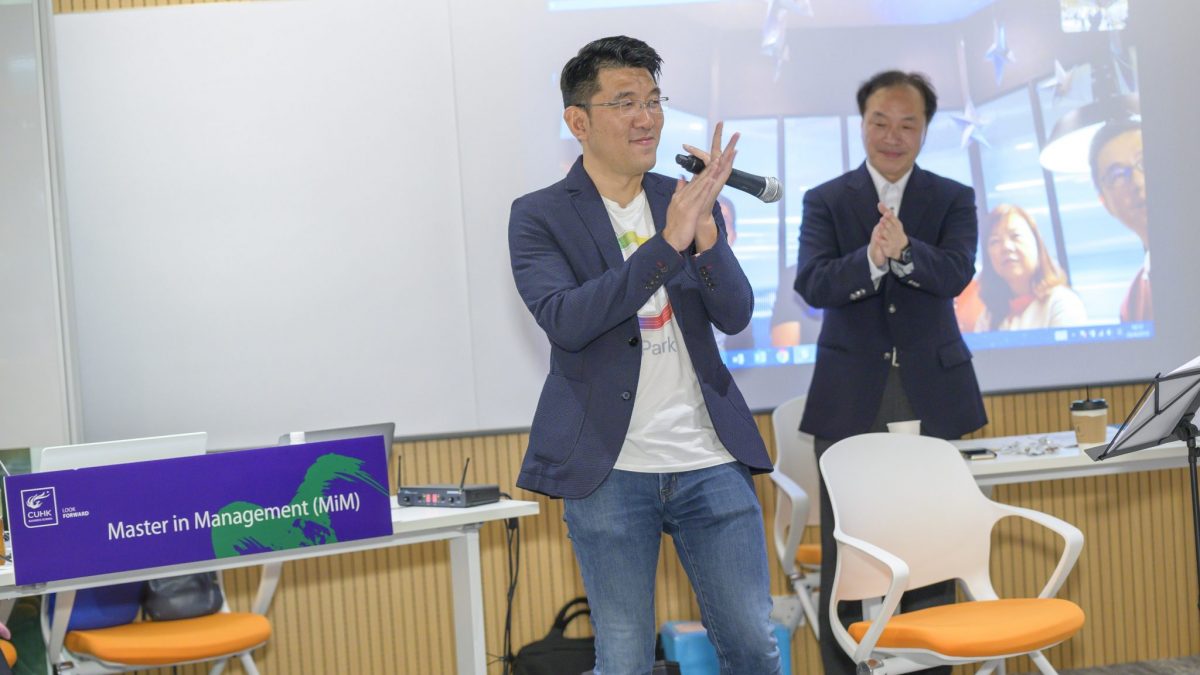 Dato CC Ngei at Capstone Case Launch The students’ performance impressed the judging panel, which included Prof. Kalok Chan, Dean of CUHK Business School and Wei Lun Professor of Finance and Mr. Jen Chou Lim, Chief Culture Officer at Feruni Ceramiche. Prof. Chan shared, “Students did well and should congratulate themselves on having such a good opportunity to work on this interesting case. The Capstone Project’s purpose is for students to integrate the theories they’ve learned into a real-life and practical case. Students, benefitting through the week’s work, can learn so much about company operations and compete in the market.” Mr. Lim concurred, “The students were given a short time to understand a new industry and put together such amazing proposals. I got many good ideas from the presentations. They are a group of very good students.” 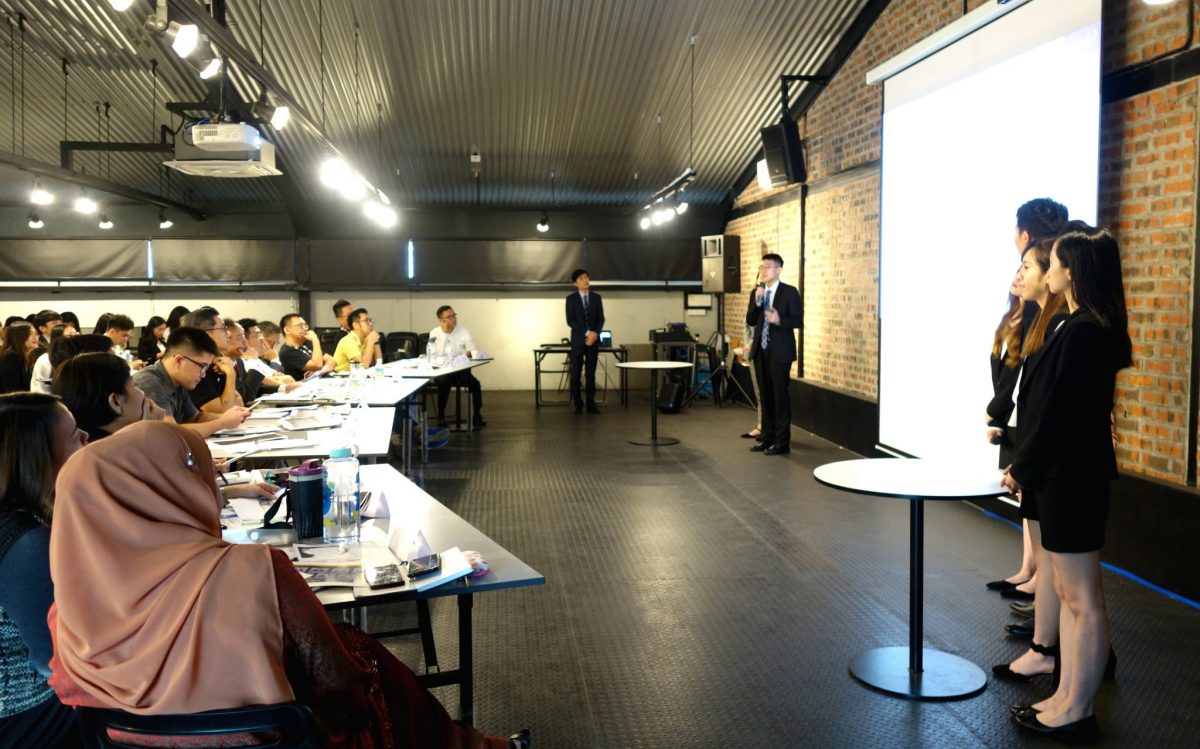 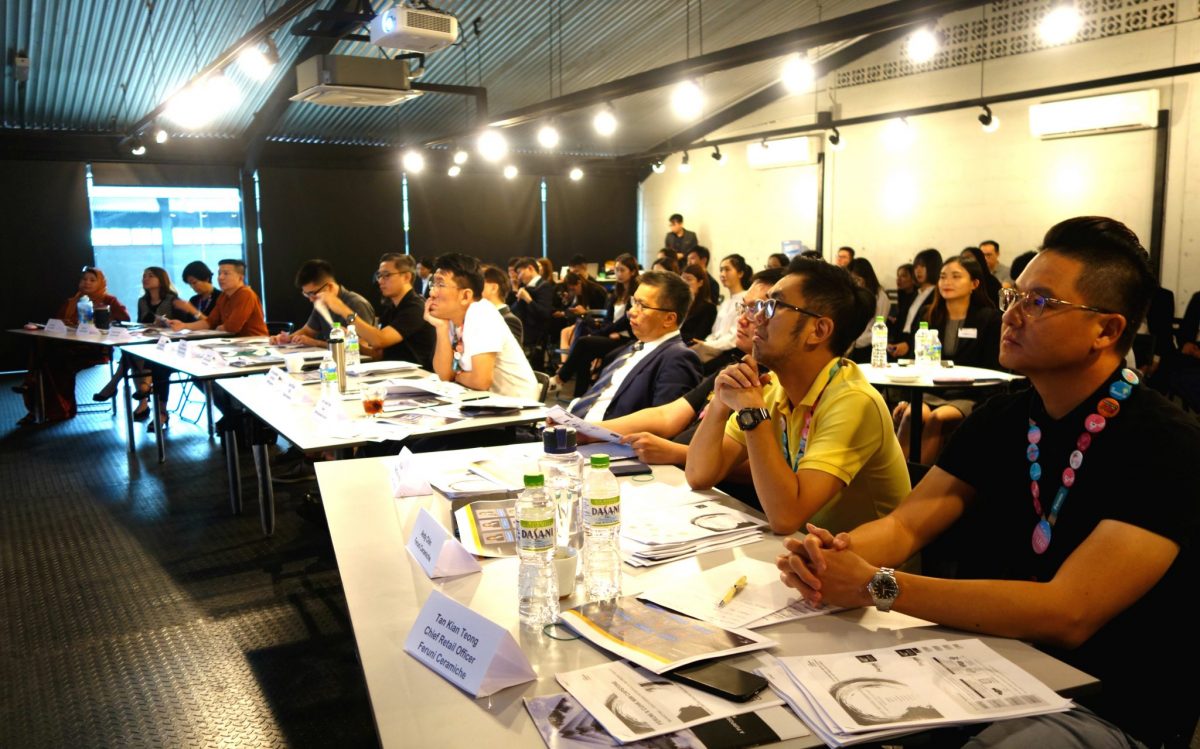 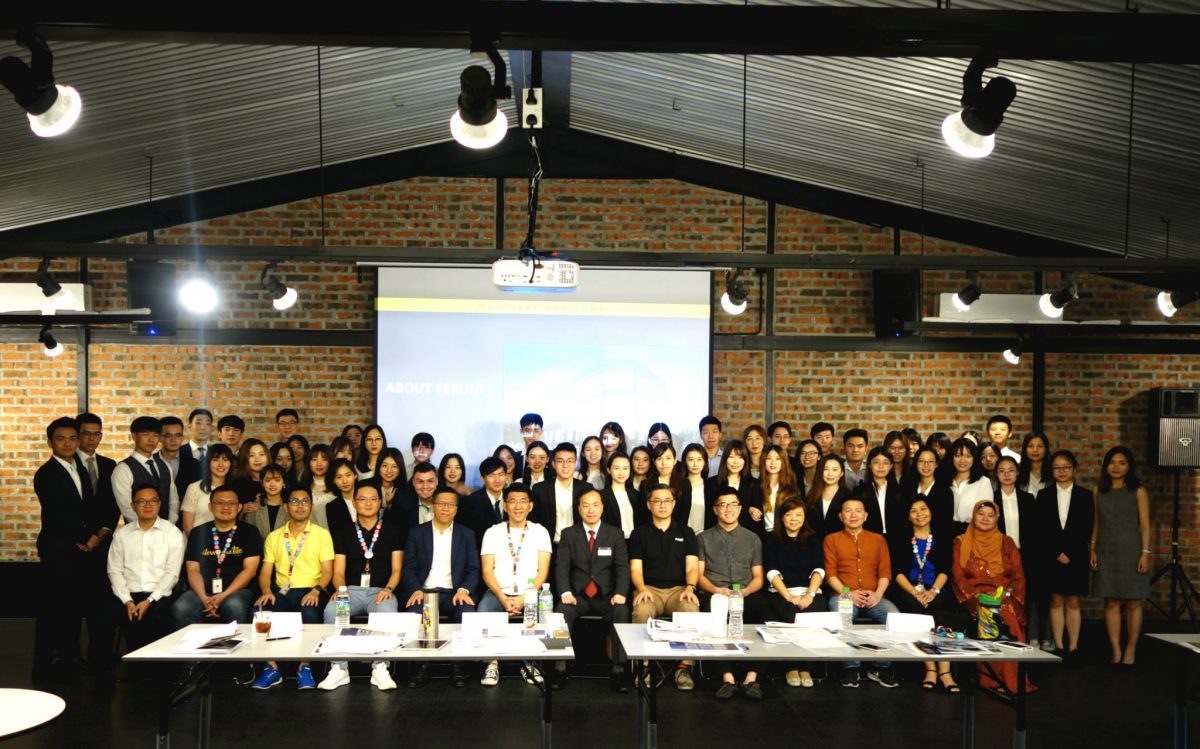 As part of the Capstone Project, students also visited various business firms in Thailand and were inspired by leading business and educational leaders from Malaysian Investment Development Authority, Thai Wah PCL, Nestle, Banyan Tree Bangkok and Thammasat University. The visits provided students with learnings highly applicable to their future careers. MiM student Josephine Pun said, “We’ve gained insights about the companies we have visited, especially their unique business models and the way they sustain their competitive advantages in the market.” Her classmate, Maggie Hu deepened her understanding of different leadership styles and how to become a better leader after the visits. 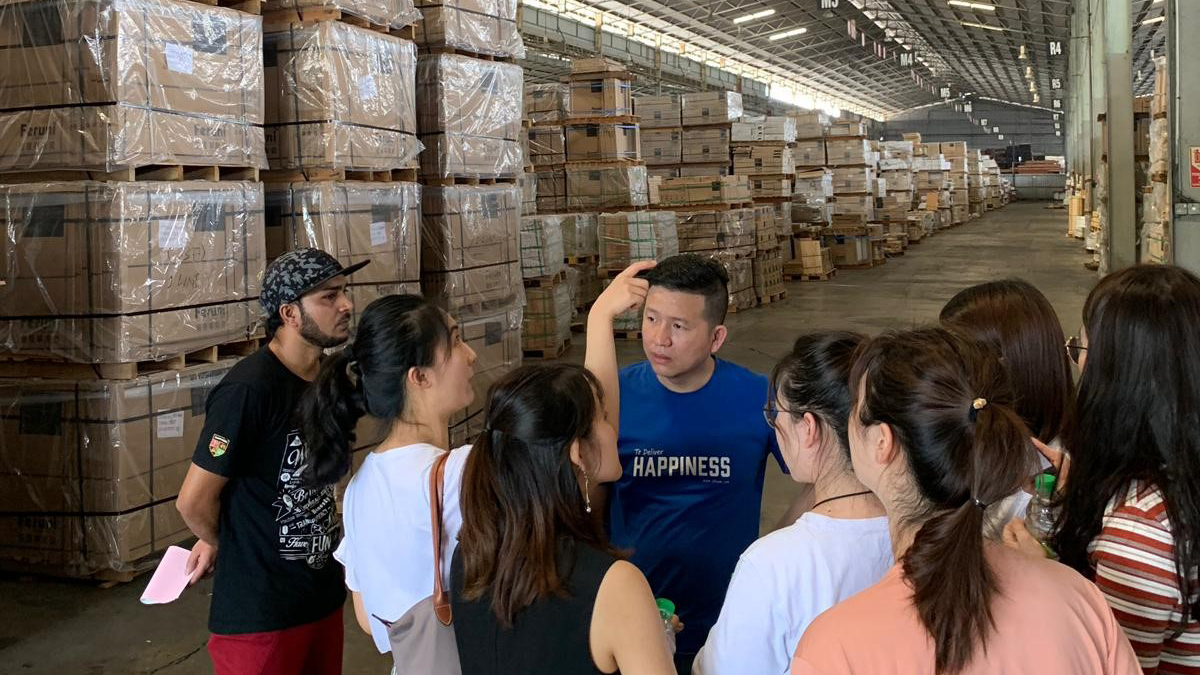 Visit to Feruni Ceramiche’s warehouse in Kuala Lumpur The Capstone Project is an integral part of the MiM Programme, which is in its first year and designed to develop pioneers who not only embrace change but are also instrumental in creating change in Asia and beyond. The programme aims are aligned with CUHK Business School’s vision of exposing students to global experimental learning and developing meaningful partnerships with industry stakeholders. Other than equipping students with real-life business experience, Dr. John Lai, Co-Director of the MiM Program me and Senior Lecturer of Department of Management at CUHK Business School said, “The Capstone Project is a process of self-discovery and inspiration, the conclusion of the Capstone is not an end but a beginning. MiM students will have plenty of opportunities to explore and unleash their potential. Their success is not defined by money, power or fame, but by the pursuit of a passion they really believe in.” About Feruni Ceramiche Feruni Ceramiche, founded by Dato C.C Ngei in 2010, is an industry leader for premium ceramic tiles, delivering the world’s latest tile trends together with a world-class customer experience in major cities across Malaysia. The post Real-Life Business Experience and Unique Inspiration Fuels Capstone Project Success appeared first on CUHK Business School. |
| FROM CUHK: Real-Life Business Experience and Unique Inspiration Fuel Capstone Project Success |
|
CUHK MiM students visited Malaysia and Thailand from 26 May to 9 June 2019, firstly in Malaysia where they gained real-life business experience by participating in a live consultancy. They engaged senior business executives from Feruni Ceramiche in tackling business issues within the industry. The students also devised innovative propositions collaboratively to complement the strategies currently employed to combat existing challenges and to create social value. Prof. Shige Makino, Co-Director of the MiM Programme and Professor of Department of Management at CUHK Business School described the live consultancy as a golden opportunity for students to talk to managers and executives, to identify the issues and opportunities faced by the company and to present their ideas about the future direction of the company. Dato C.C Ngei, Founder of Feruni Ceramiche values diversity and idea exchange tremendously. “I view any opportunity to learn as a true blessing. I wish to exchange views with the younger generation, and hopefully inspire them to become a better version of themselves and a future global leader while seeking inspiration in their crazy ideas,” he said.  Dato CC Ngei at Capstone Case Launch The students’ performance impressed the judging panel, which included Prof. Kalok Chan, Dean of CUHK Business School and Wei Lun Professor of Finance and Mr. Jen Chou Lim, Chief Culture Officer at Feruni Ceramiche. Prof. Chan shared, “Students did well and should congratulate themselves on having such a good opportunity to work on this interesting case. The Capstone Project’s purpose is for students to integrate the theories they’ve learned into a real-life and practical case. Students, benefitting through the week’s work, can learn so much about company operations and compete in the market.” Mr. Lim concurred, “The students were given a short time to understand a new industry and put together such amazing proposals. I got many good ideas from the presentations. They are a group of very good students.”    As part of the Capstone Project, students also visited various business firms in Thailand and were inspired by leading business and educational leaders from Malaysian Investment Development Authority, Thai Wah PCL, Nestle, Banyan Tree Bangkok and Thammasat University. The visits provided students with learnings highly applicable to their future careers. MiM student Josephine Pun said, “We’ve gained insights about the companies we have visited, especially their unique business models and the way they sustain their competitive advantages in the market.” Her classmate, Maggie Hu deepened her understanding of different leadership styles and how to become a better leader after the visits.  Visit to Feruni Ceramiche’s warehouse in Kuala Lumpur The Capstone Project is an integral part of the MiM Programme, which is in its first year and designed to develop pioneers who not only embrace change but are also instrumental in creating change in Asia and beyond. The programme aims are aligned with CUHK Business School’s vision of exposing students to global experimental learning and developing meaningful partnerships with industry stakeholders. Other than equipping students with real-life business experience, Dr. John Lai, Co-Director of the MiM Program me and Senior Lecturer of Department of Management at CUHK Business School said, “The Capstone Project is a process of self-discovery and inspiration, the conclusion of the Capstone is not an end but a beginning. MiM students will have plenty of opportunities to explore and unleash their potential. Their success is not defined by money, power or fame, but by the pursuit of a passion they really believe in.” About Feruni Ceramiche Feruni Ceramiche, founded by Dato C.C Ngei in 2010, is an industry leader for premium ceramic tiles, delivering the world’s latest tile trends together with a world-class customer experience in major cities across Malaysia. The post Real-Life Business Experience and Unique Inspiration Fuel Capstone Project Success appeared first on CUHK Business School. |
| FROM CUHK: Overseas Study Trip Broadens CUHK Accountancy Students’ Horizons beyond Their Specialty |
|
With the help of the Association of Chartered Certified Accountants (ACCA) and the Chartered Institute of Management Accountants (CIMA), the group visited the head offices of Barclays and Unilever in London to understand the role of accounting in the banking and fast moving consumer goods (FMCG) industries. Professional Accountancy (Global Accounting Stream) Student Patrick So shared, “In the presentation by the finance team at Unilever, we heard about an interesting budgeting method called ‘zero-based budgeting’, which is different from the traditional budgeting approach we learned in class. The finance team explained to us how such approach helps reduce operational costs. This is my first time to see how practical accounting information can be used at a strategic level.” As part of the UK visit, students attended a seminar at the Judge Business School of the University of Cambridge by Dr. Michael Willis, Senior Faculty in Management Practice and Director of the Global Leadership Master of Accounting Programme. Student Li Changhao recalled, “Dr. Willis introduced how a company’s environmental impacts would be included in the preparation of financial statements. His step-by-step guidance of a real-life case inspired me much as Dr. Willis demonstrated interactions between accounting, law and risk management relating to climate change.” 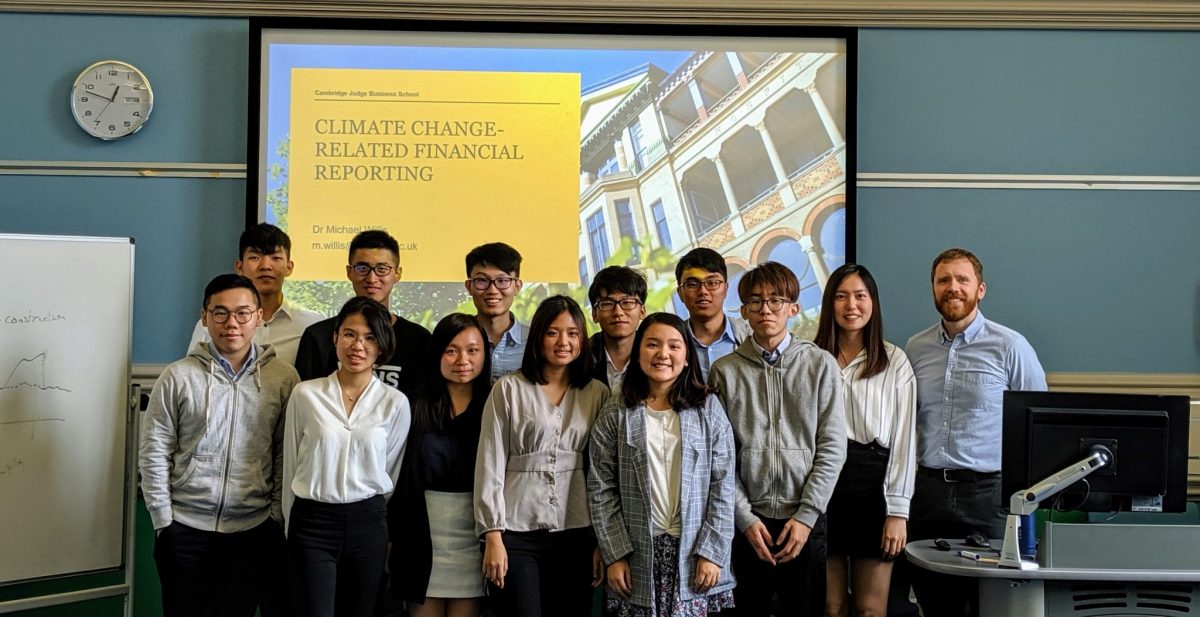 The group with Dr. Michael Willis of the Judge Business School at the University of Cambridge The lecture was followed by a corporate visit to AstraZeneca, one of the largest global biopharmaceutical businesses. “AstraZeneca’s global sustainability team shared with us how the business achieves its sustainability development goals. The team highlighted their practical approach in implementing sustainability strategies which are far more than just focussing on environmental protection,” Li added. 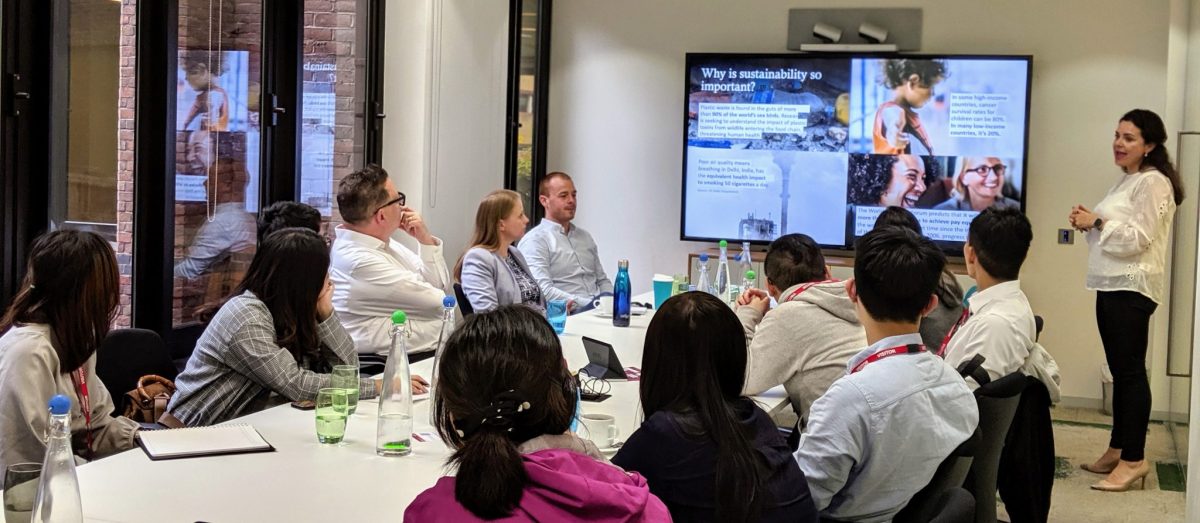 Sharing session hosted by the global sustainability team of AstraZeneca at Cambridge The trip continued with another week in Switzerland, with 14 CUHK Master of Accountancy Programme students joining the group. PACC (Global Accounting Stream) student Nick Wong commented, “The scenery of Switzerland is always breath-taking, so is her innovation performance.” Themed as he Future Banking, the sharing session hosted by Swissquote, a leading provider of online financial and trading services, demonstrates why Switzerland can retain crown as the ‘world’s most innovative nation’. “We always hear about FinTech. The demonstrations of its key digital investment products during our visit to Swissquote let us understand how algorithms help offer new solutions to clients,” Wong added. 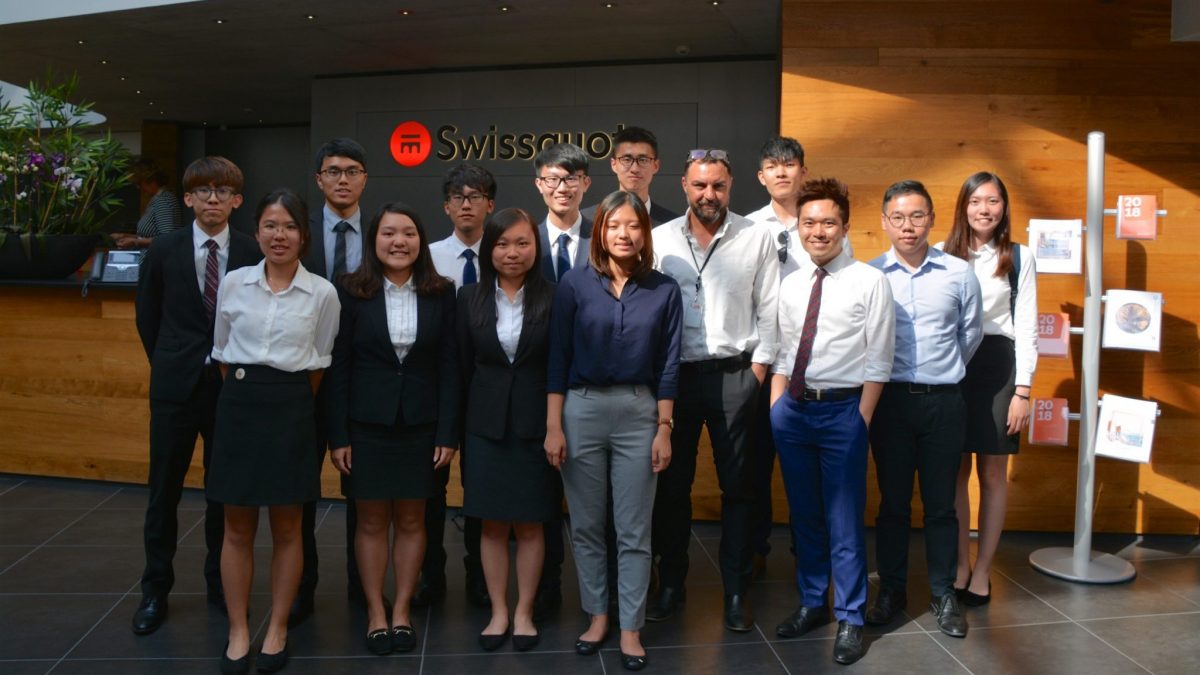 The group at Swissquote headquarters at Gland One of the key features of this study trip is students are required to present their recommendations to various identified business issues in two Switzerland-based companies. One of the cases is related to Reuge, a manufacturer of traditional music boxes with over 150 years’ history. “Running a business is much more than just writing up a proposal. You can never come up with a convincing strategy without paying attention to an important attribute – feasibility. Different from cases in our traditional assignments, this real business case analysis requires us to take everything into consideration rather than just creating something ‘grand’,” concluded Wong for his presentation experience to the CEO and the Global Sales and Marketing Director of Reuge. 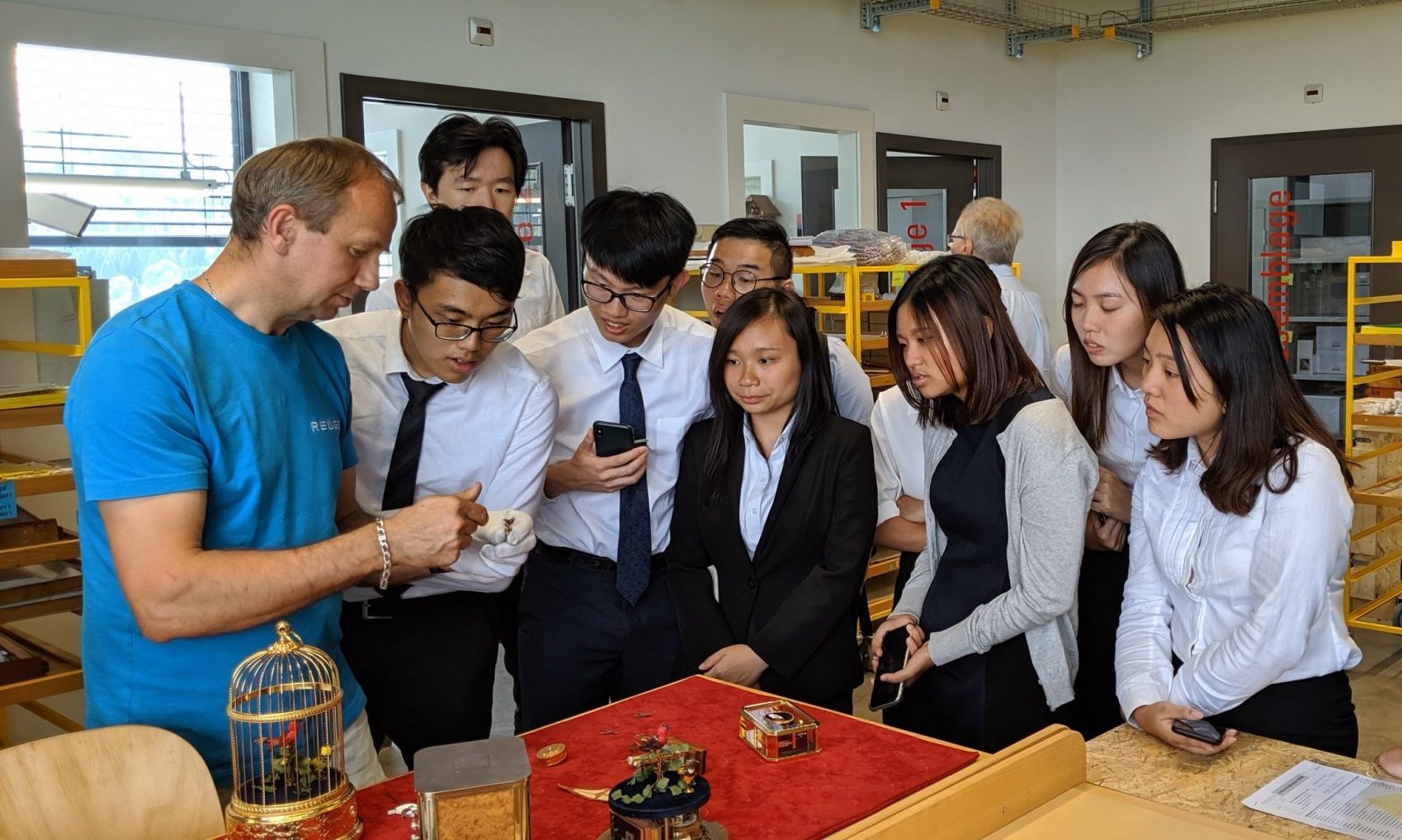 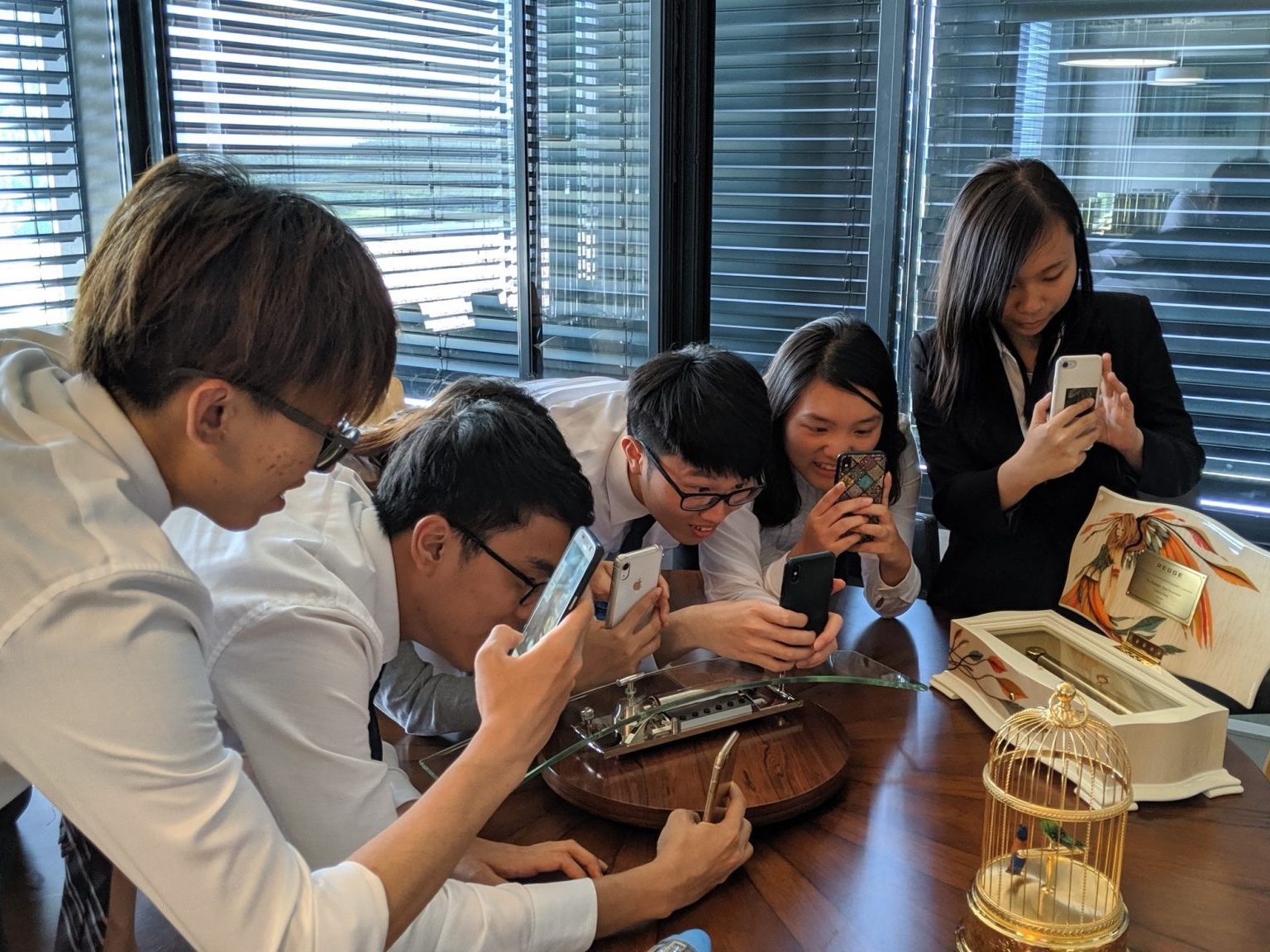 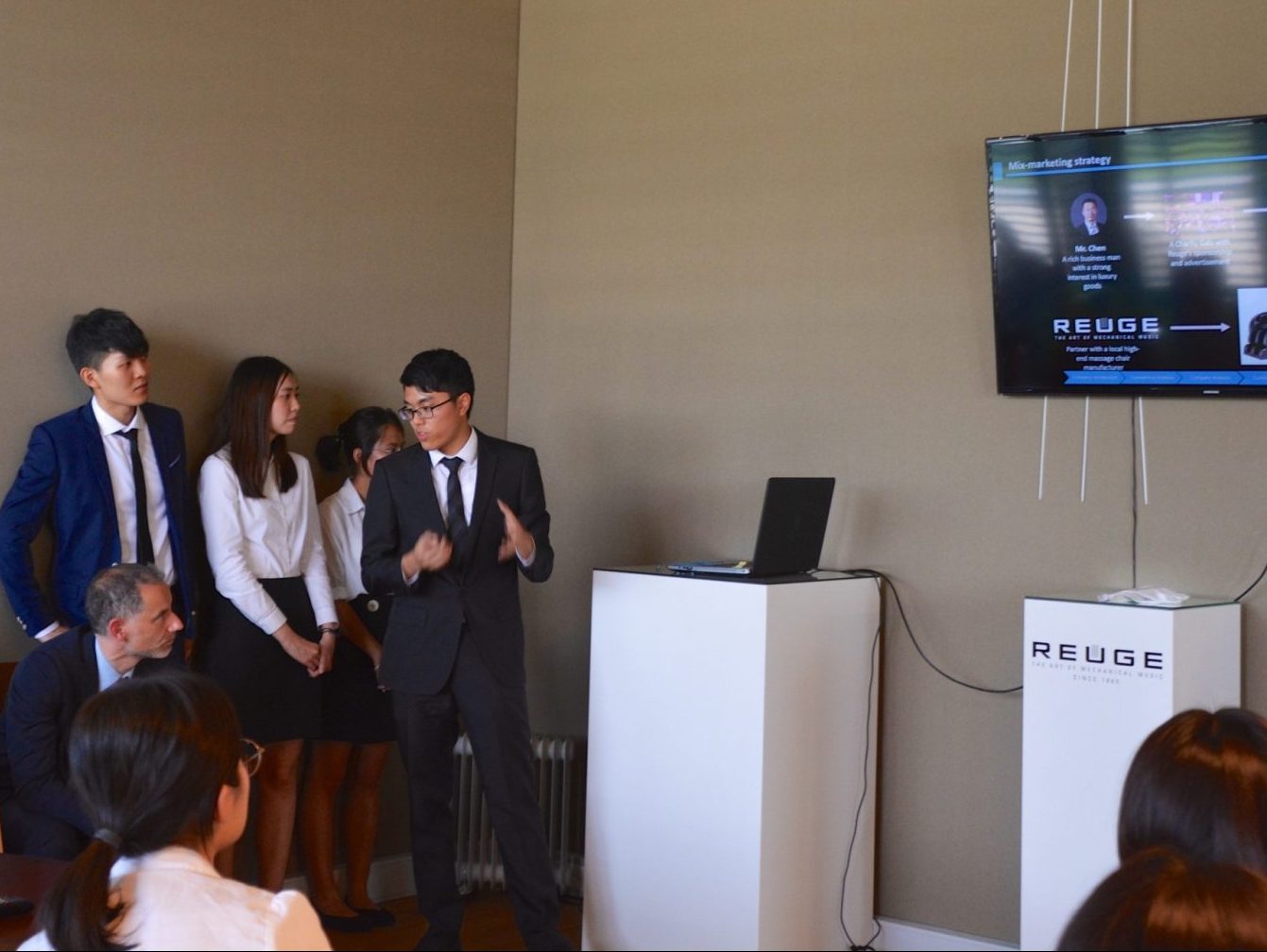 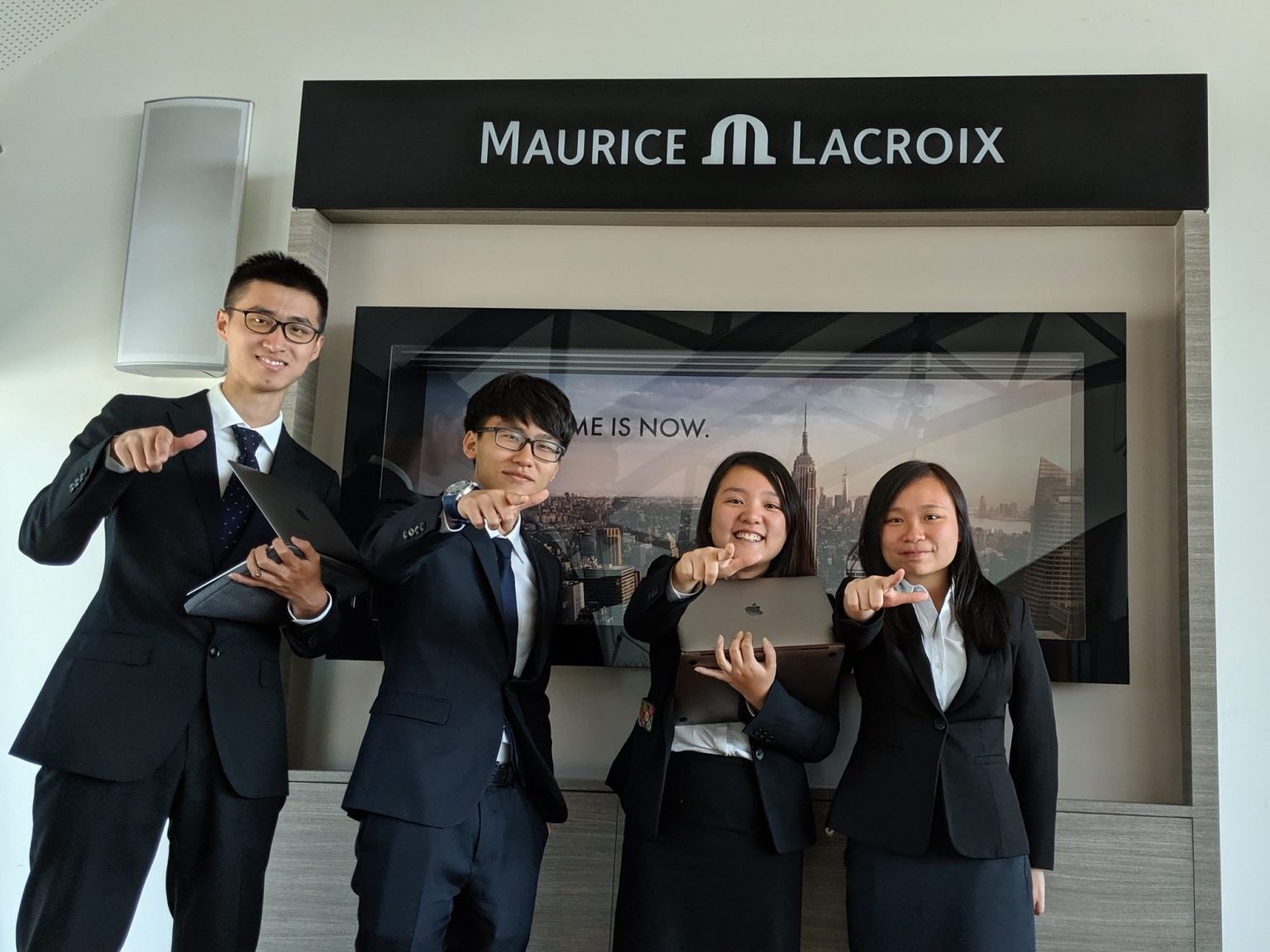 To enrich the students’ understanding of different accounting-related issues further, the group attended lectures at the University of Lausanne. Student Sachiko Surjono recalled her two-day classroom experience, “Many of the lectures touched on topics not being covered in our curriculum at CUHK. One of them is related to the valuation and accounting disclosures of football clubs which are very popular in Europe. We might know how to conduct a simple valuation of a traditional company. However, during this seminar we were made aware of how to use accounting information to value a football club!” 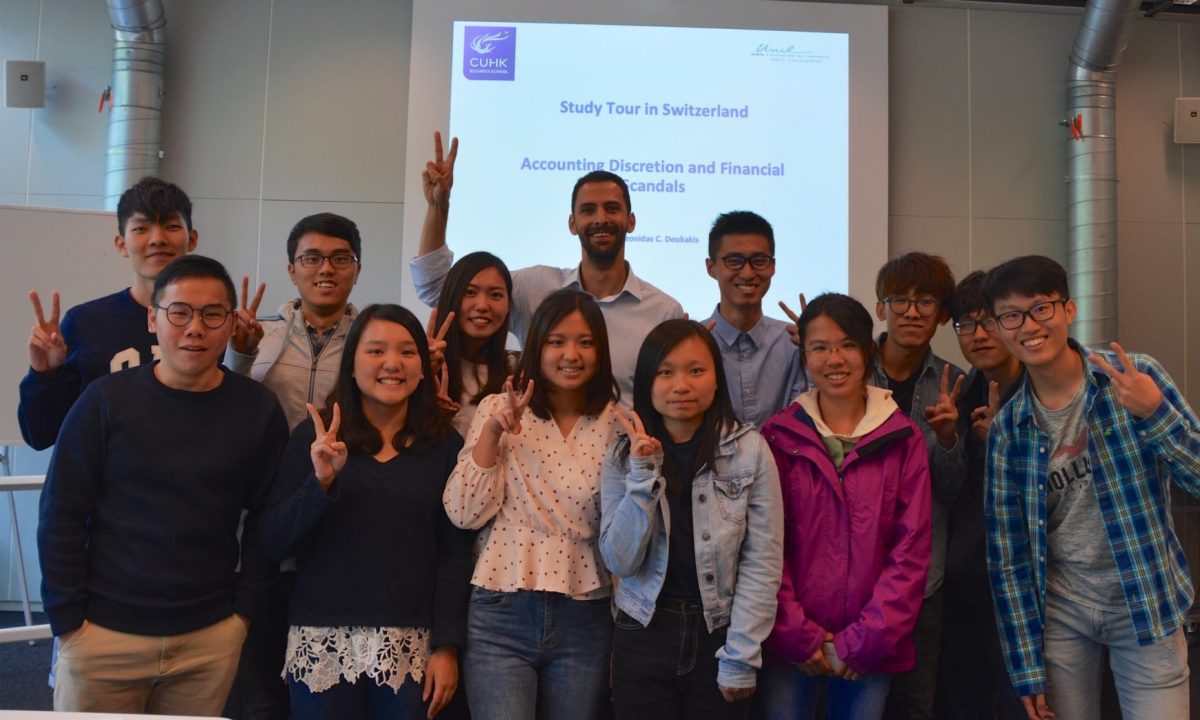 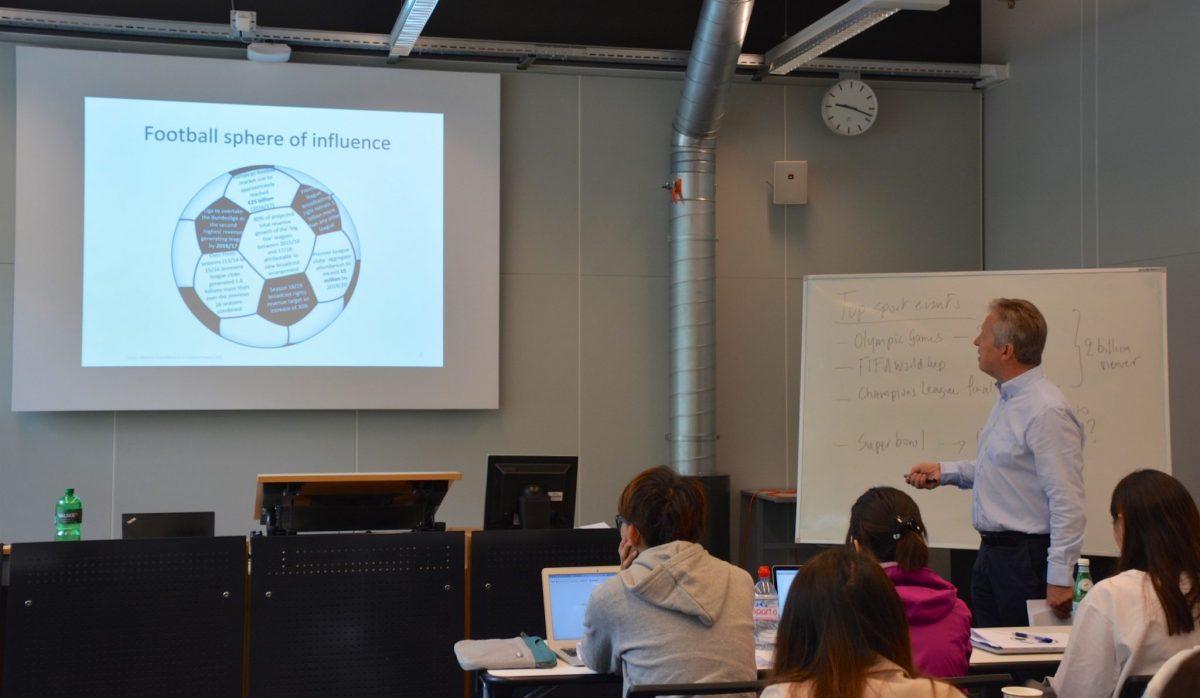 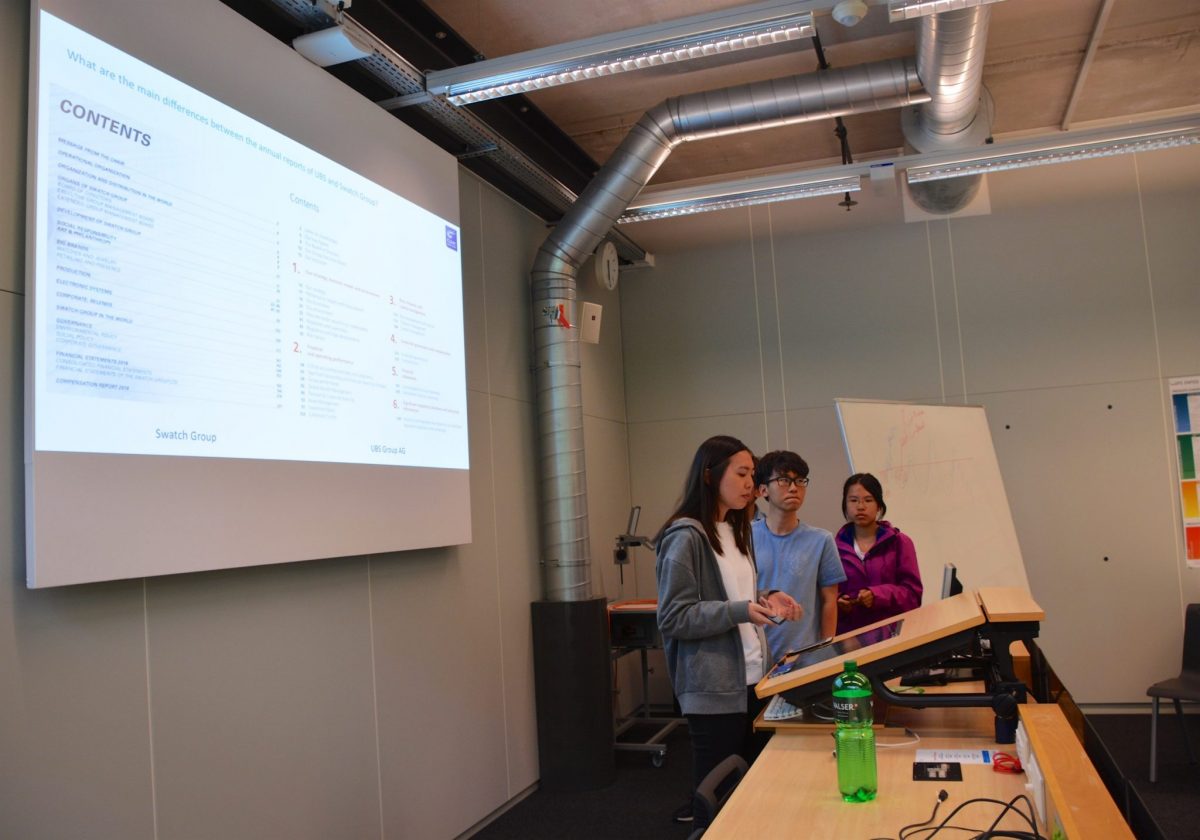 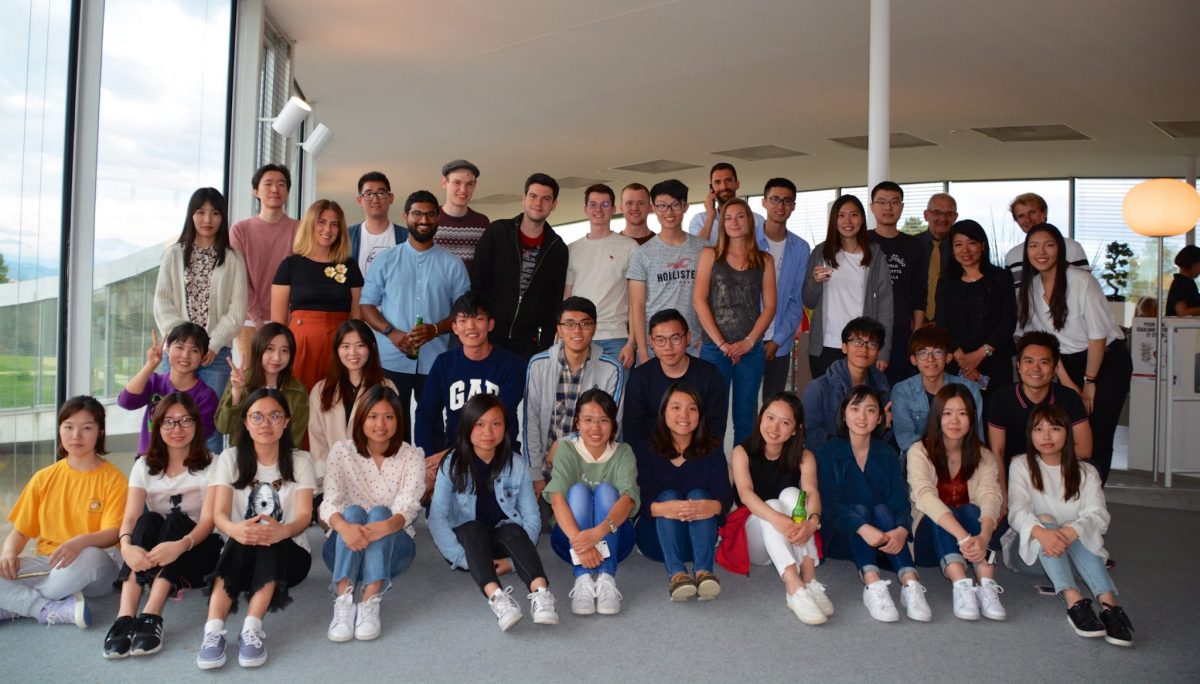 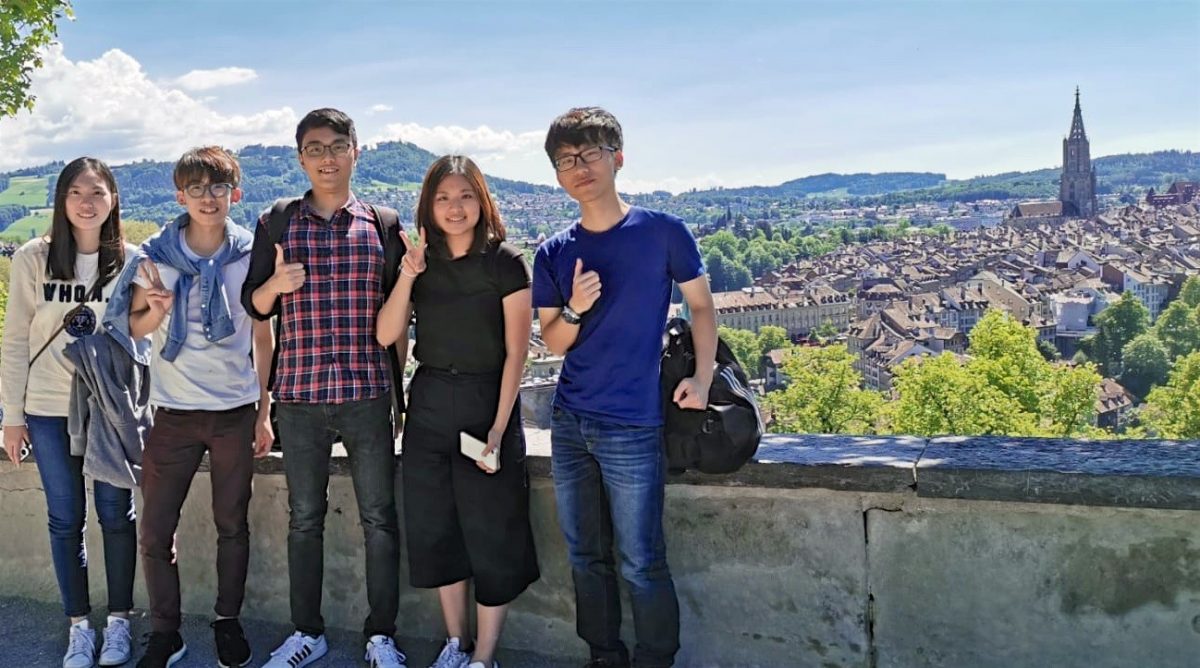 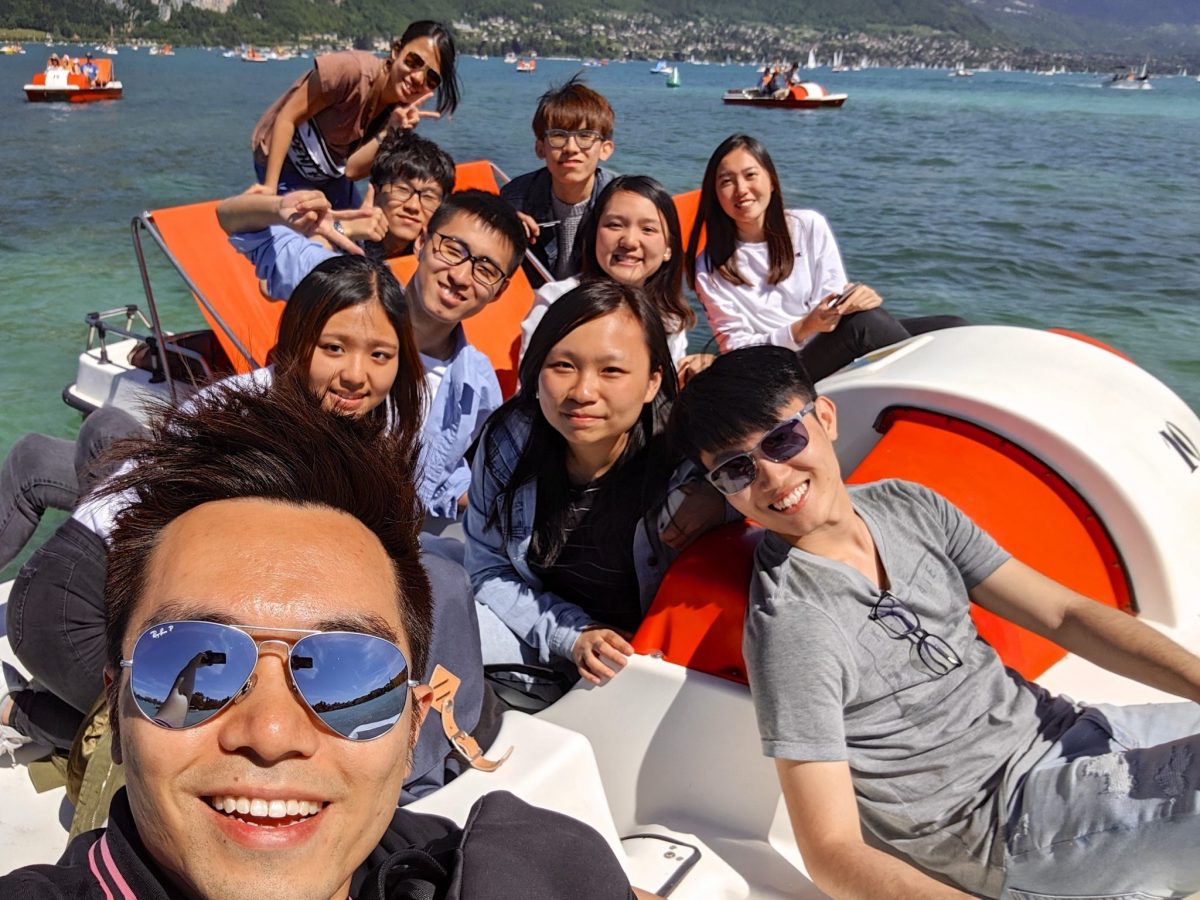 The post Overseas Study Trip Broadens CUHK Accountancy Students’ Horizons beyond Their Specialty appeared first on CUHK Business School. |
| FROM CUHK: Opportunities for Asian Businesses to Lead in the Age of Uncertainty |
|
At a panel discussion entitled “Opportunities for Asian Businesses to Lead in the Age of Uncertainty”, held recently at The Chinese University of Hong Kong (CUHK) Business School Global Alumni Forum, Prof. Seen Meng Chew, Associate Professor of Practice in Finance at Department of Finance, and Associate Director of MBA Programmes at CUHK Business School, spoke with four panellists to seek their views. “Geopolitical events and technological advancements are transforming industries, altering the social fabric and disrupting the labour markets. Although the developments are risky to economies, new opportunities are also created,” Prof. Chew said in his opening remarks. 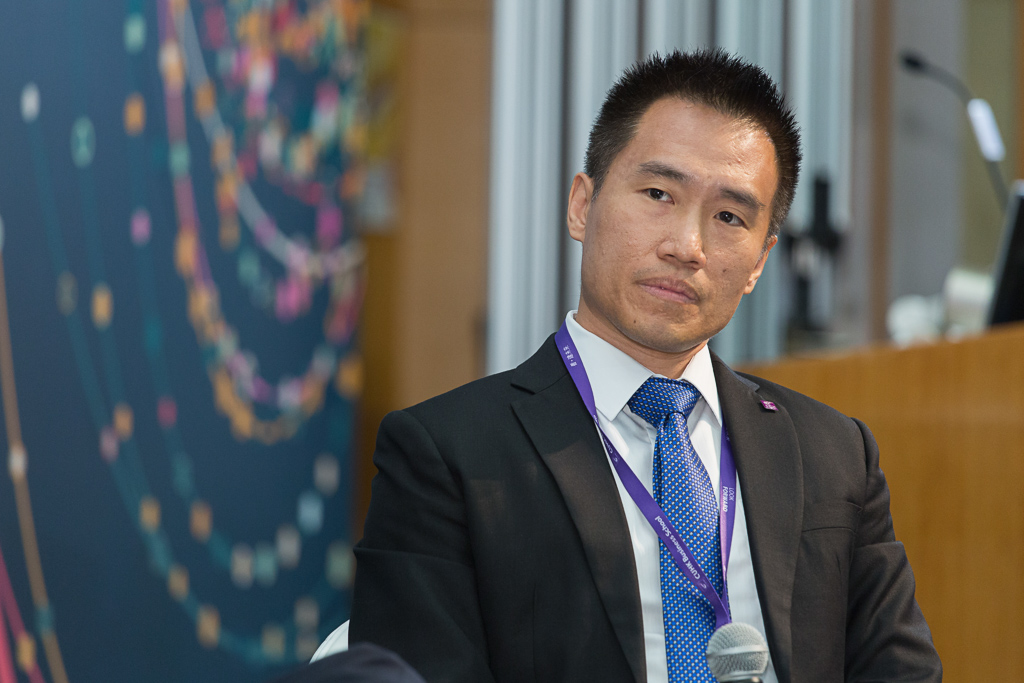 Prof. Seen Meng Chew, Associate Professor of Practice in Finance at Department of Finance, and Associate Director of MBA Programmes at CUHK Business School “The centre of economic power is moving towards East Asia,” he added. “We need to understand how Asian economies can position themselves strategically and assume a leadership role amid all the uncertainties, as well as what competitive advantages Asian organisations and companies possess.” Prof. Chew started the discussions by asking Prof. Joseph Fan, Professor of School of Accountancy and Department of Finance at CUHK Business School and an expert on family business and corporate governance, about what he perceived to be the top economic and political risks arising from China’s rapid development. “The issue that concerns me the most is the people,” Prof. Fan said. “After growing rapidly for 40 years, China’s economic and poverty issues are giving way to people issues. Many Chinese business leaders I met expressed frustration in managing people of different backgrounds and in holding them together. This difficulty will become more pronounced when the Chinese economy slows down and there is less money to share.” 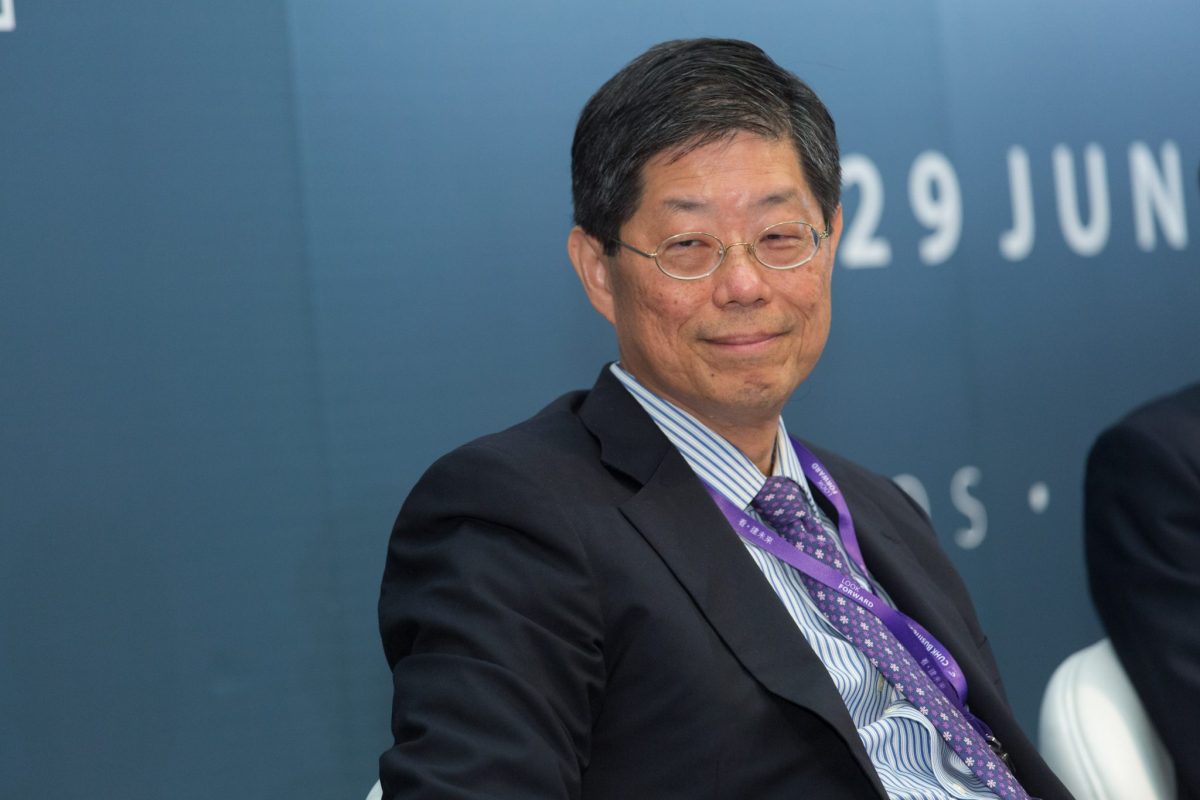 Prof. Joseph Fan, Professor of School of Accountancy and Department of Finance at CUHK Business School Prof. Fan added that it is essential for China to change from a relationship-based business culture to a market-based economy where professionalism takes lead. “It is going to be a long transition and may take as many as 50 years.” The issue of people was also highlighted by Prof. Dora Lau, Associate Professor of Department of Management and Associate Director of Centre for Entrepreneurship at CUHK Business School. Approaching the issue from the perspective of leadership, Prof. Lau said: “We are facing an environment that is highly uncertain and that changes quickly. Long-term planning is difficult, and business decisions have become complex and ambiguous. This calls for teams of professionals with different backgrounds working together to get the tasks done. Organisations that can recognise, engage and manage diverse talent will be more creative and more adaptive to outperform competitors.” 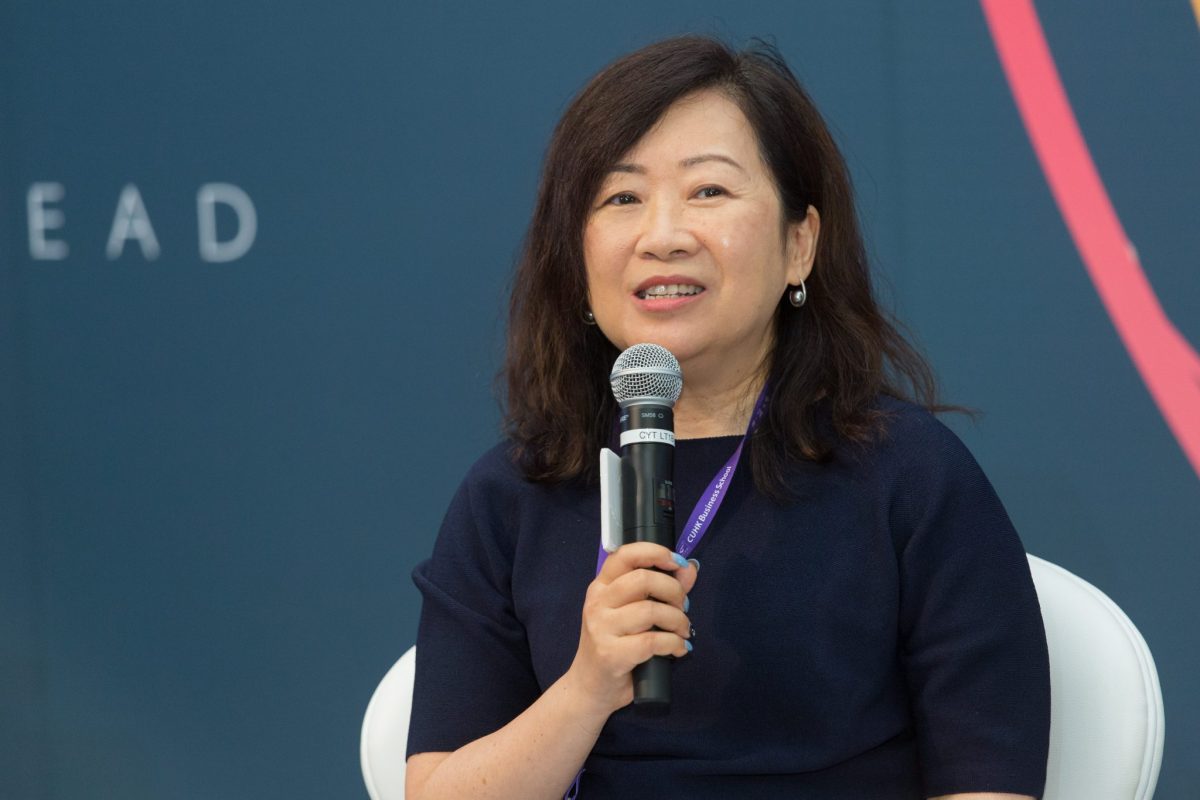 Prof. Dora Lau, Associate Professor of Department of Management and Associate Director of Centre for Entrepreneurship at CUHK Business School She added: “To succeed, business leaders will need to mentor or coach their subordinates to adopt the same open mindset. Teamwork and collaboration are important to all businesses, but they do not come naturally to humans.” Noting that technology is a pillar of future economic growth, Prof. Chew asked Mr. Gerardo Salandra (MBA 2016), CEO and Founder of Rocketbots and Chairman of the Artificial Intelligence Society of Hong Kong, how technology is changing and disrupting Asian cities. “Asian countries are facing different challenges and are using technology differently,” Mr. Salandra observed. “For example, while many developers in China focus on AI, developers in Japan are tapping robotics to alleviate healthcare problems that arise from an ageing population.” 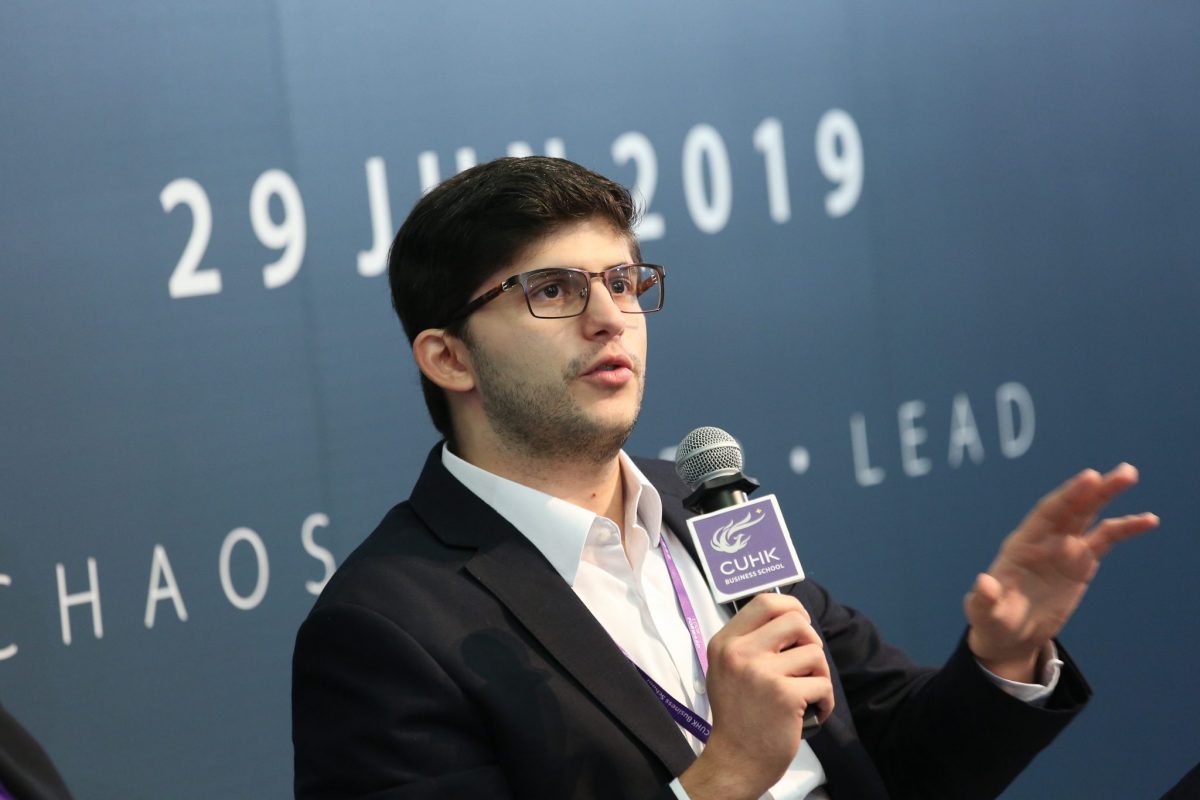 Mr. Gerardo Salandra (MBA 2016), CEO and Founder of Rocketbots and Chairman of the Artificial Intelligence Society of Hong Kong Mr. Salandra foresees that Asia will become an outsourcer of technology. “Asia has big, diverse and urgent problems, such as with trade, logistics and the population. China, the Philippines and Japan are all solving problems that other countries will be dealing with in five or ten years. The solutions developed here will be applicable and can be exported to other countries later, such as to help Germany with its elderly population or Latin America with their infrastructure problems. But this does not happen the other way around. For example, General Data Protection Regulation (GDPR) will not work in China.” “One problem we have to solve in Asia is the supply of the technical talent, there just isn’t enough,” Mr. Salandra added. “People here have excellent skills, but they lack experience. While we have the advantage of time, we do not have the advantage of the talent supply or smart money yet.” 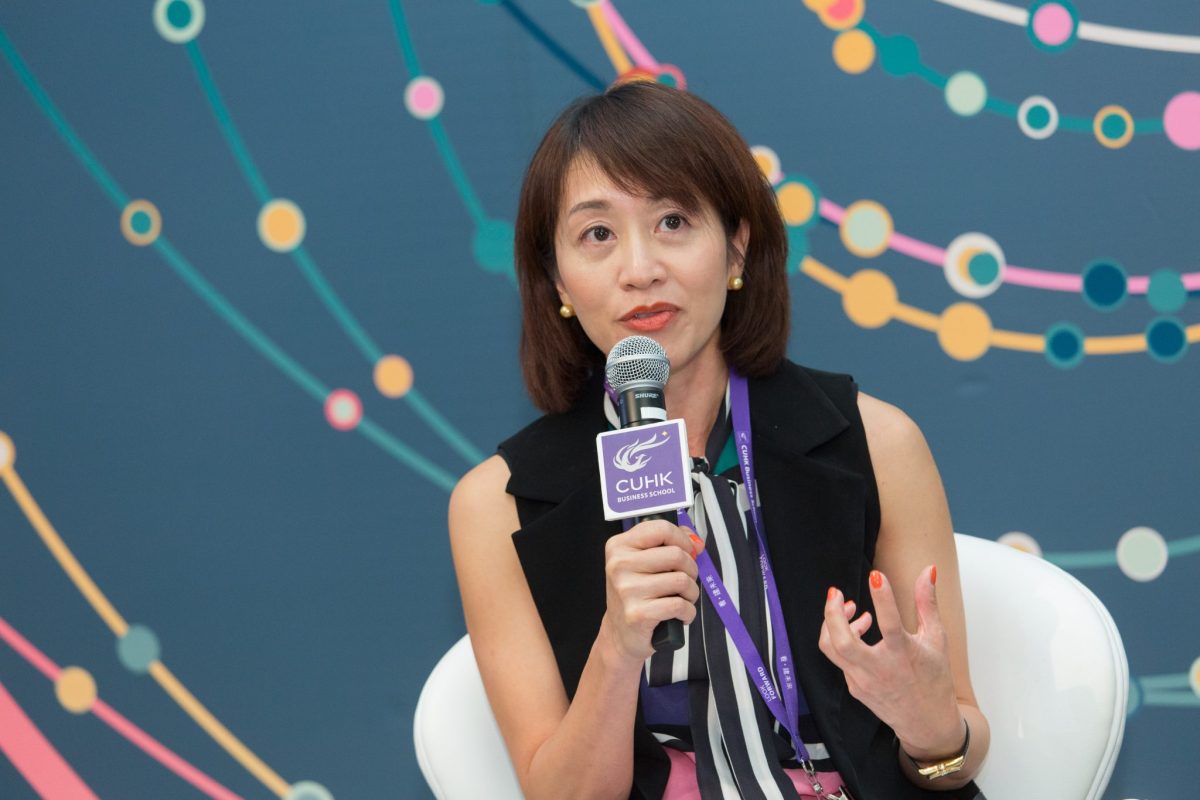 Mrs. Cindy Chow (BBA 1992), Executive Director of Alibaba Hong Kong Entrepreneurs Fund So what new business opportunities have been created amid all the risks and disruptions? Mrs. Cindy Chow (BBA 1992), Executive Director of Alibaba Hong Kong Entrepreneurs Fund, which invests in and supports start-ups, said: “The restrictions and new policies that the US government is imposing on China are actually providing opportunities for the economies here.” As an example, Mrs. Chow noted how the tension between China and the US is opening up opportunities for Hong Kong, especially in finance. “We noticed that more venture capital funds are opening up offices in Hong Kong and Southeast Asia. When you have money in the market, you can attract more money, start-ups and talent to the region, and that in turn attracts more money.” What do Asian corporations need to change or upgrade to maximise the full potential of these new opportunities then? 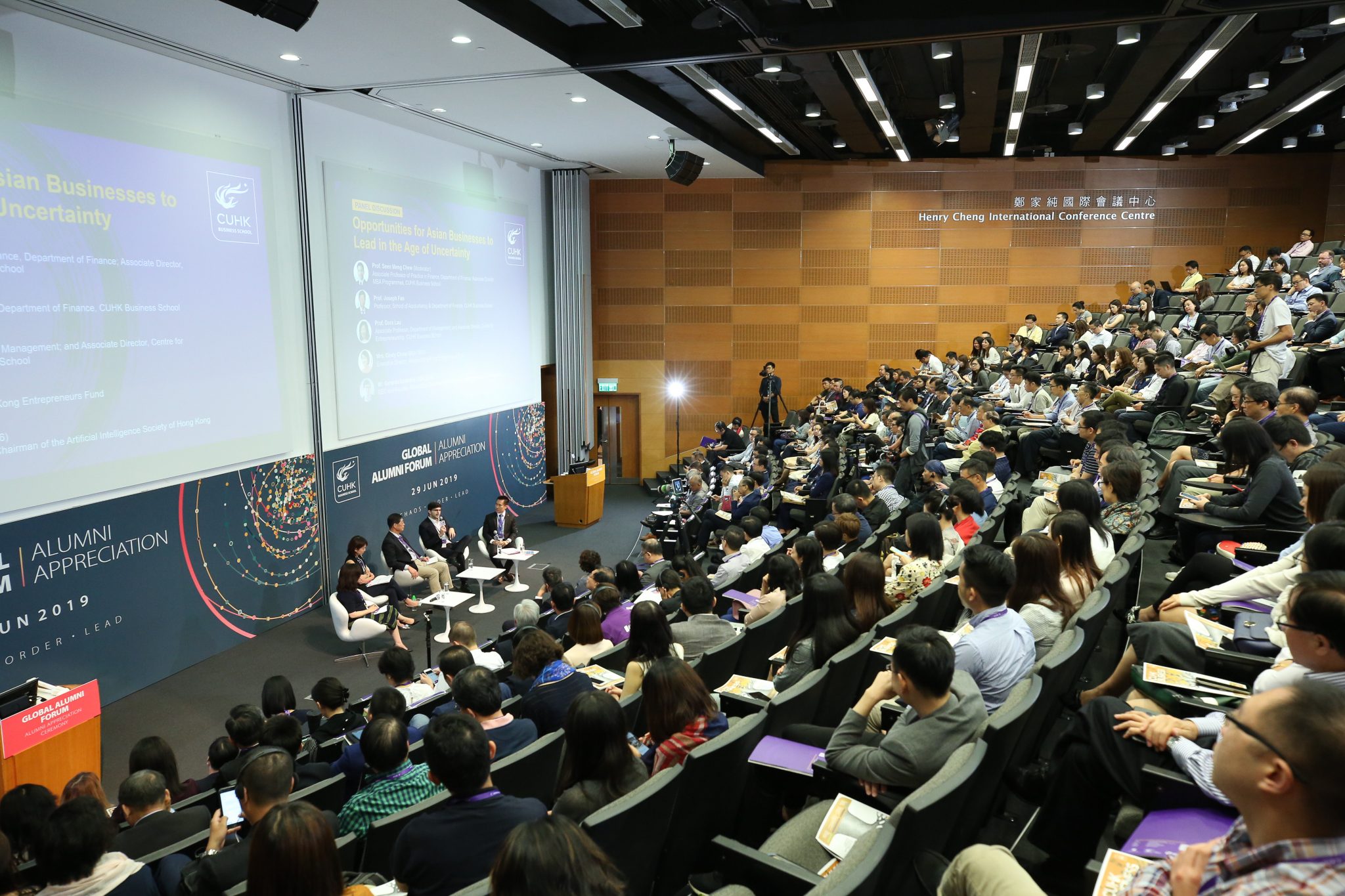 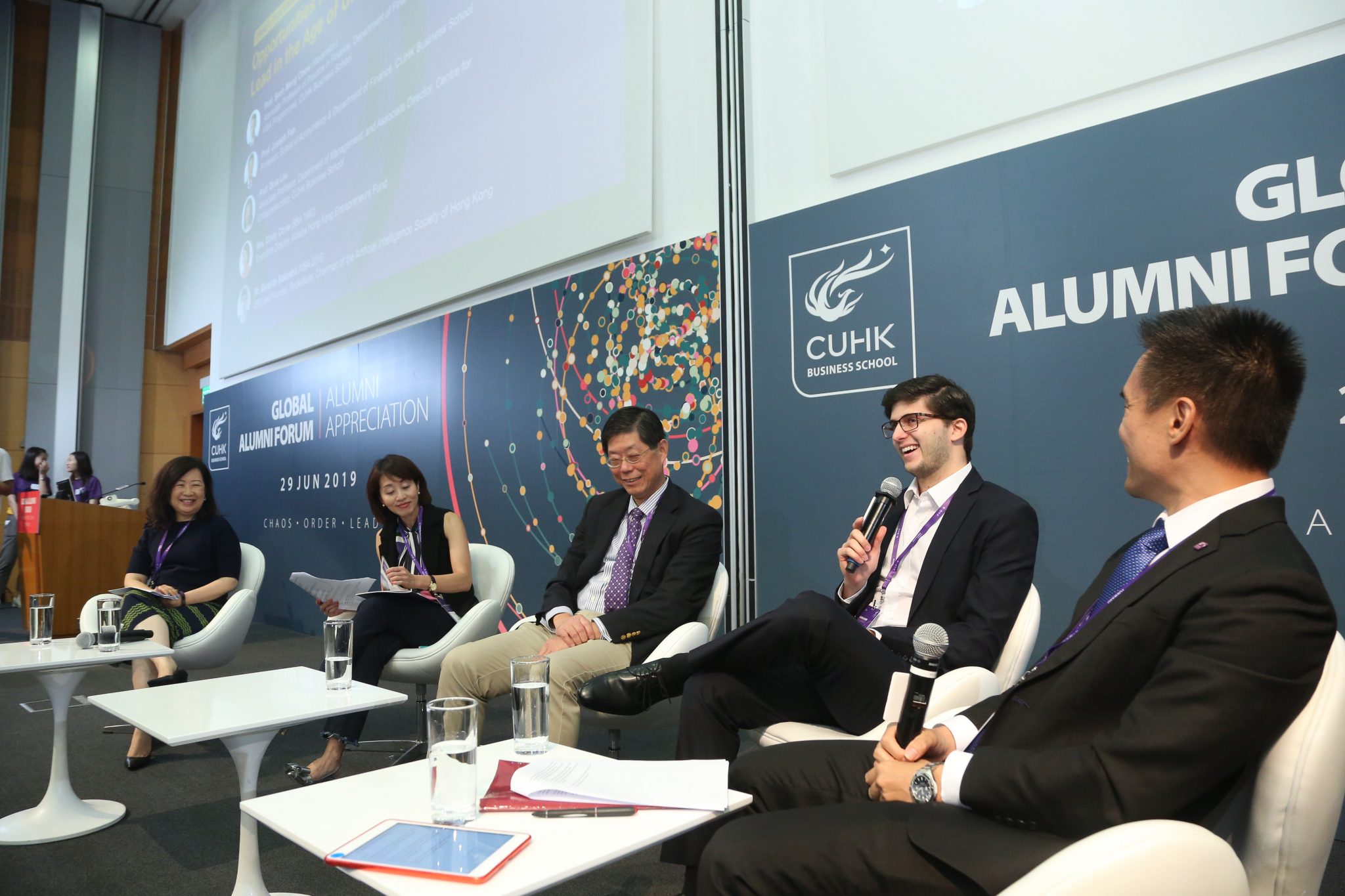 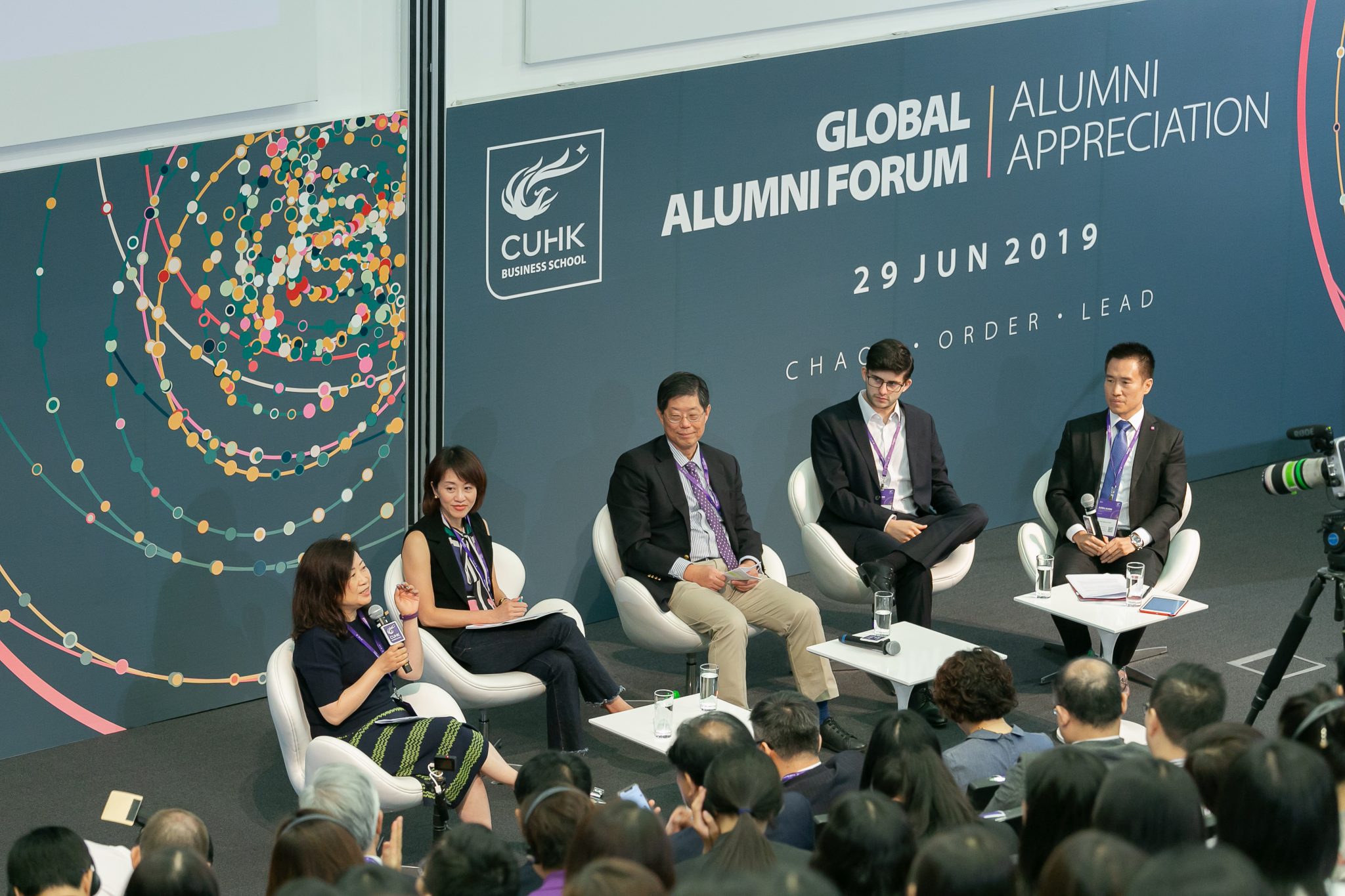 The post Opportunities for Asian Businesses to Lead in the Age of Uncertainty appeared first on CUHK Business School. |
| FROM CUHK: Debating Hot Topics in International Business |
|
The CUHK Business School ‘Global Alumni Forum: Chaos • Order • Lead’ delivered a strong range of insights to 380 attendees on 29 June, with professors, distinguished alumni and expert speakers all offering their contributions to the debates surrounding how business leaders should manage these increasingly chaotic times and global challenges. While the keynote speech and panel discussion garnered exceptional insights, a highly anticipated breakout sessions offered unparalleled knowledge on some of the most pressing business issues of our time. Innovation and Strategic Renewal of Family Business Leading the discussion was Kevin Au, Professor of Department of Management and Director of Centre for Family Business at CUHK Business School, who took his years of extensive experience and applied them to the real world of managing family businesses. The session included a workshop and strong audience participation, making it rich and rewarding in its number of top quality insights on how to combine innovation with the strategic renewal of family business. 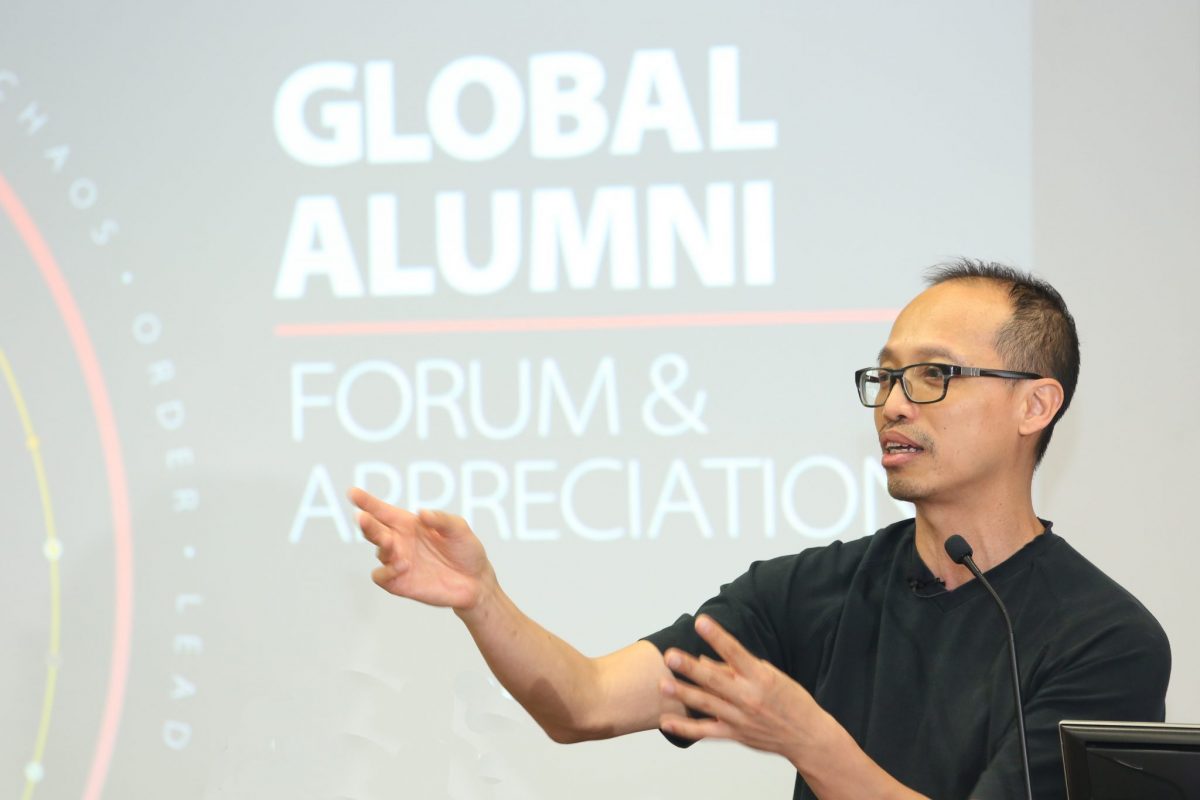 Kevin Au, Professor of Department of Management and Director of Centre for Family Business at CUHK Business School “In family businesses, one dilemma is that we need to maintain continuity but we also need to make changes. Both are as important,” Prof. Au said. “Some people think we should conquer dilemmas. But rather, I think we should understand and embrace them. A useful way to think about dilemmas is to see the value in the dynamics.” Prof. Au delved into the nitty gritty of how family businesses can serve both individuals and the family as a whole, making changes and preserving tradition at the same time, and maintaining closeness while growing in size and resources. “As we all know, it can be difficult for family members to discuss some topics such as the future of their business. A consultant from the outside will be able to facilitate the discussion,” said Prof. Au. And what can be learned from family business is also very applicable to corporations as a whole, according to Prof. Au. “What we talked about today is not just applicable to family businesses but all corporations. Good communication and leadership are important for any organisations. Big corporations can also learn from family businesses, and vice versa.” When Banks Go Virtual ─ Featuring a Hong Kong Fintech Company Hong Kong’s virtual banking scene is becoming one of the most innovative in the region with a whole host of licenses being granted. The topic was the focus of Seen Meng Chew, Associate Professor of Practice in Finance of Department of Finance, and Associate Director for MBA Programmes at CUHK Business School, with a “When Banks Go Virtual – Featuring a Hong Kong Fintech Company” talk that turned the heads of digital finance enthusiasts. 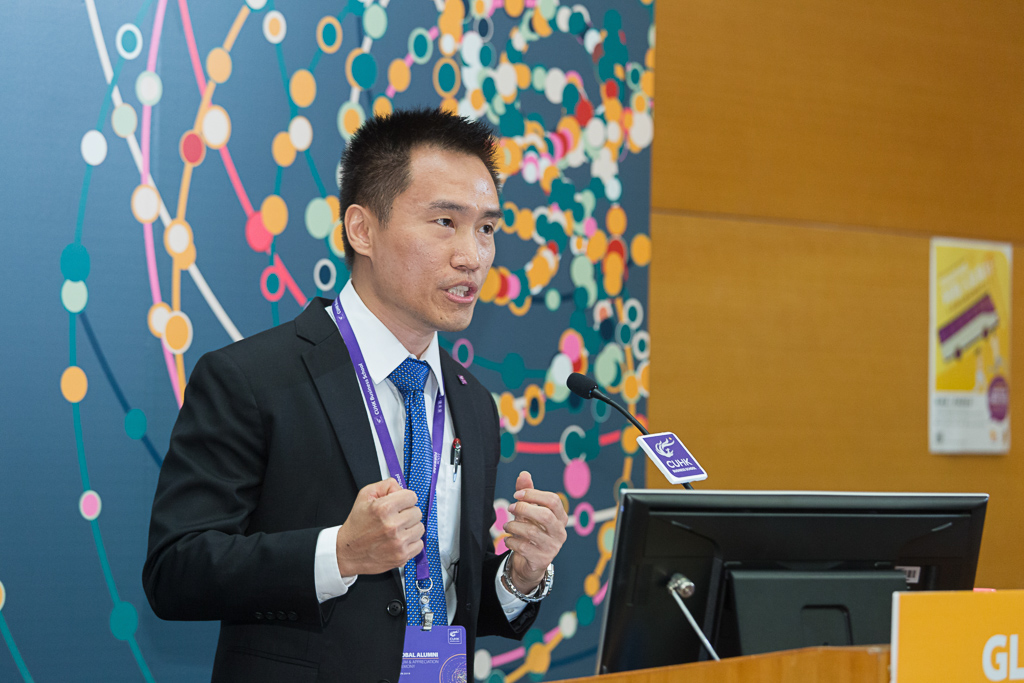 Seen Meng Chew, Associate Professor of Practice in Finance of Department of Finance, and Associate Director for MBA Programmes at CUHK Business School “Fintech is not complex, ‘jargonny’ or impossible to understand – it’s as simple as your Octopus card, or the PayMe app on your smartphone,” said Prof. Chew, discussing the global explosion of digital payments from US$4.1 trillion in 2019 to US$6.7 trillion in 2023 and covering topics as wide as Alipay and WeChat Pay to Revolut from the UK, Grab and Gojek from Southeast Asia, and Prosper from the US. While covering new opportunities, Prof. Chew also looked at risks such as data safety, privacy and over-reliance on tech. “Out of the eight virtual bank licenses granted by Hong Kong Monetary Authority, seven of them are backed by either a tech or banking mogul, only one is a true home-grown brand – WeLab,” said Prof. Chew as he introduced Mr. Kenny Cheng (BSc in Quantitative Finance 2006) to the stage, who is now Head of Finance and Treasury at WeLab Virtual Bank. 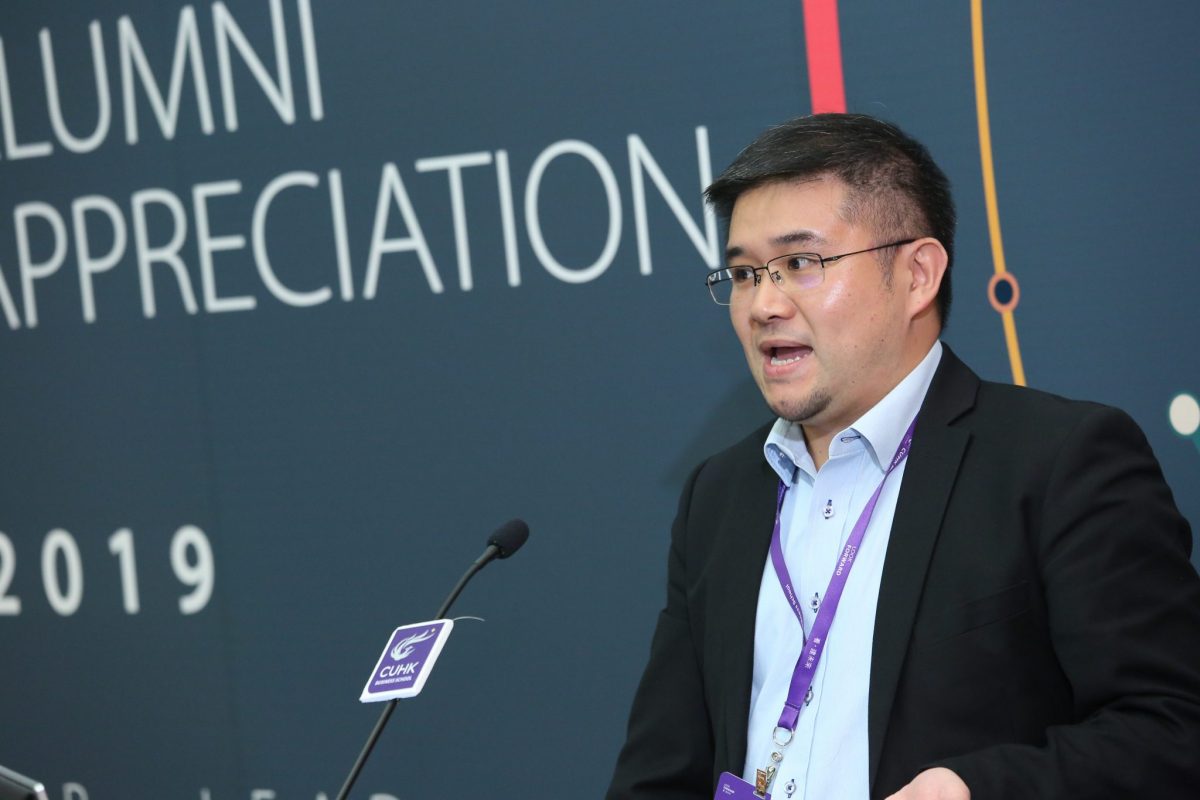 Mr. Kenny Cheng (BSc in Quantitative Finance 2006), Head of Finance and Treasury at WeLab Virtual Bank WeLab was born out of WeLend, Hong Kong’s first online lending platform set up in 2013. Mr. Cheng described WeLab’s product philosophy in three words: “instant, intelligent and interactive,” adding that all digital payments, lending and personal finance products should aim for these goals. The Engine of Digital Economy ─ Artificial Intelligence and Big Data Artificial Intelligence (AI) and Big Data are the engines of the new global economy, a point that was consistently emphasised by Dr. Toa Charm, Associate Professor of Practice in Management and Director of Business Development, The Asia-Pacific Institute of Business, CUHK Business School. 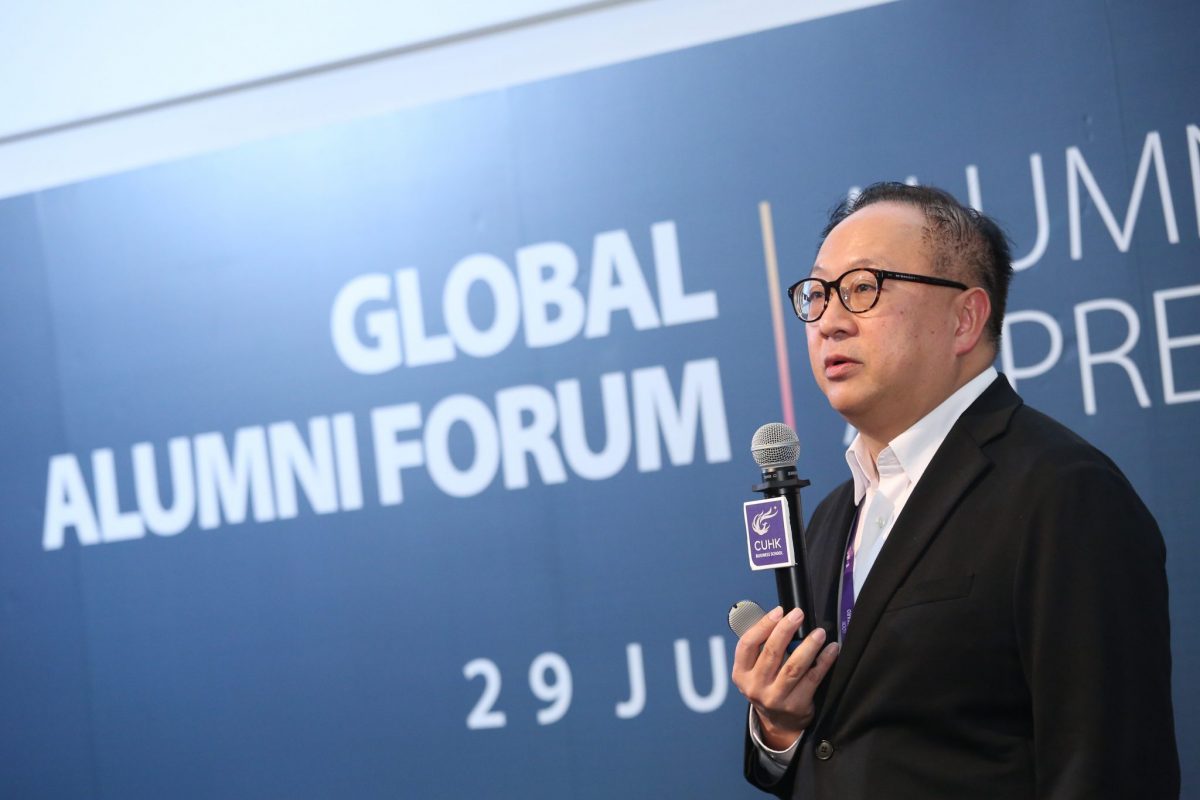 Dr. Toa Charm, Associate Professor of Practice in Management and Director of Business Development, The Asia-Pacific Institute of Business, CUHK Business School “Nowadays, AI applications have successfully penetrated into all walks of life, and helped address the pain points that are faced by customers and businesses,” Dr Charm said. Introducing his strong engagement with the tech ecosystem, Dr Charm examined global AI trends, looking at what defines AI and looking at the core drivers for the global economy. While many observers focus solely on the US-China Trade War, they fail to see a larger trend. “By 2030, if a country doesn’t have an AI strategy, it is hard to survive. The US and China are not just under the trade war but are under another war – AI war,” says Dr. Charm. AI can be used in a variety of industries from manufacturing to retail, healthcare, travel, finance and energy and agriculture. Dr. Charm compared the likes of machine learning to traditional coding, and examined applications that could be created such as automated approvals for financial loans using AI applications. Dr. Charm also looked at risks such as the loss of jobs to automation and whether companies were ready to face the AI transformation. So how many of our current jobs will be gone by 2030? “Next year 3 percent of our jobs will be killed by AI automation. By 2030, 30 percent of our jobs will be gone,” said Dr. Charm. Talent Development in the Greater Bay Area 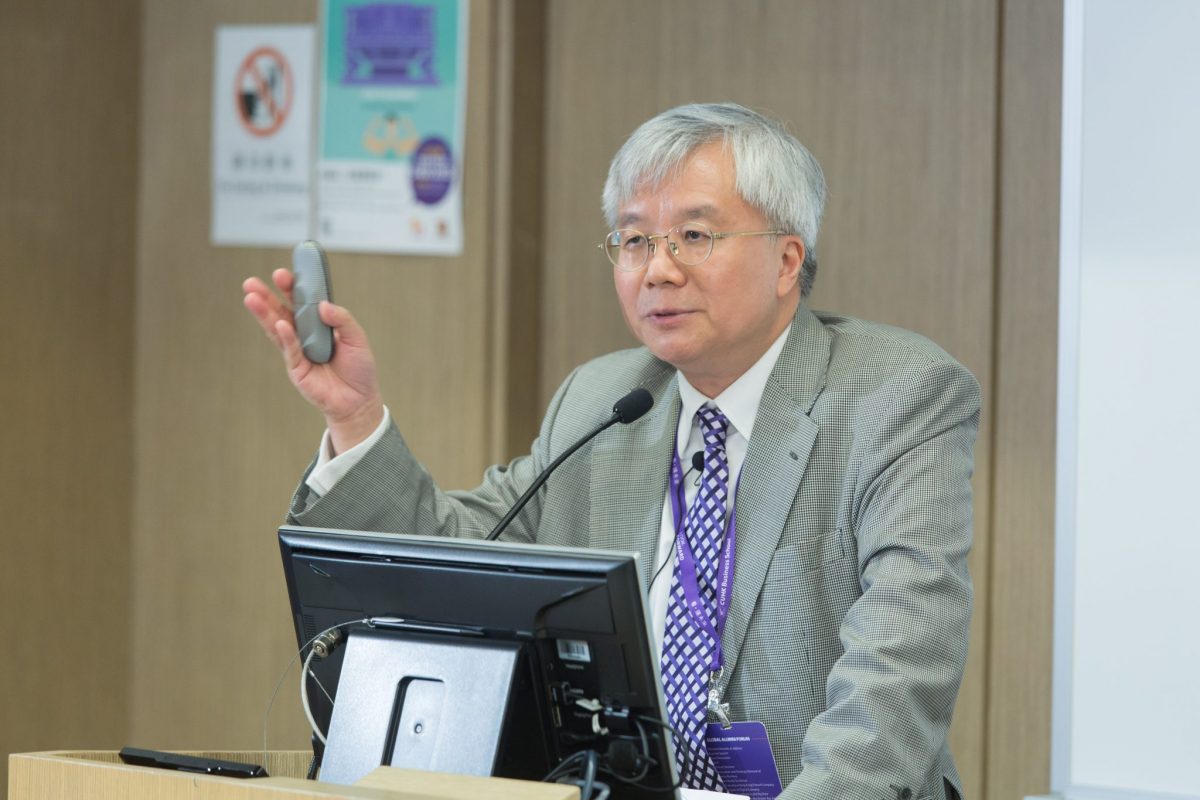 Mr. Peter Kung, Adjunct Professor, School of Accountancy, CUHK Business School We hear quite a bit about the Greater Bay Area (GBA) but what does it actually mean? Mr. Peter Kung, Adjunct Professor, School of Accountancy, CUHK Business School and Mr. Charles Fung (MBA 2003), Group CSR Manager, Starry Group, held a session to discuss the topic in detail. Joining Hong Kong and Macao and nine other cities in Guangzhou province for a total area of 56,000 km2 and population of 70 million as of the end of 2017, the concept has potential to develop strongly. “The GBA can provide the talents with a much bigger market to excel. For example, Hong Kong people traditionally excel in financial services. How about our top science students? Can they easily find a job to excel in their career in Hong Kong? In the past, I will say that not many of them can do that if they choose to work in Hong Kong. But going forward, if they have the mindset to explore the GBA, they can have the opportunities to work for one of the top companies in the world,” said Mr. Kung.  Mr. Charles Fung (MBA 2003), Group CSR Manager, Starry Group Apart from the difference in terms of tax systems in Hong Kong and mainland China, culture is another area where Hong Kong people may find it difficult to fit in with their mainland counterparts. Mr. Charles Fung said one of the cultural challenges in working in mainland China is that Hong Kong people have to interact with people who have very different perspectives. Indeed, different views, diversity and debate characterised the breakout session that capped off a fascinating day for all. The post Debating Hot Topics in International Business appeared first on CUHK Business School. |
| FROM CUHK: Two CUHK Business Students Attend CQA Institute’s 2nd Annual AIM Course |
|
Undergraduate students Cici Chen (Quantitate Finance and Risk Management, Year 4) and Zoe Zhang (Professional Accountancy, Year 4) had a wonderful study journey in the United States this summer. They were selected to join the AIM course intended for highly motivated students interested in a career in investment management. It included a lecture series on key investment topics, “boot-camp” style training on critical technical skills, and a capstone project. This two-week quantitative course elicited Zhang’s interest in the investment industry. The advanced programme provided a platform where she could directly communicate with the experienced Wall Street professionals, enjoying the real charm in quantitative finance. Zhang said, “The lecturers shared with us different opinions about financial market and experiences beyond the theories taught in school. I gained better understanding about the industry and had clearer direction of my future study and career path. The lectures really helped me approach the mysterious and attractive field of quantitative finance.” On the other hand, the activities, consisting of Specials (specially arranged activities) and Excursions (trips to other locations), let Zhang relax and build her networks. She recalled, “What I have learned from those experienced professionals and outstanding classmates is my lifelong treasure, encouraging me to improve myself continuously.”   Chen also shared, “The programme was definitely an unforgettable experience. We had 8 hours of lecture per day on average, all taught by Wall Street professionals. There was also a competition, like a group project, which I think is of great value for pursuing a career in the investment management industry. In addition, we played Texas Holdem, had a one-day trip to the New York Financial District and enjoyed a countryside BBQ together. We worked hard and played hard. It is a valuable life experience which I highly treasure!” Mr. Dan Cardell, Chairman of the Board of Directors of the CQA and of the Board of Trustees at Wilkes University, commented, “The CUHK students were great! They represented the school well. I’m pretty sure they enjoyed it and learned a lot and made some new friends. I’m hoping they will promote the programme to their fellow students for next year.”   The post Two CUHK Business Students Attend CQA Institute’s 2nd Annual AIM Course appeared first on CUHK Business School. |
| FROM CUHK: Chinese Economic Reform: Past, Present, Future |
|
This was the observation Prof. Lawrence Lau, Ralph and Claire Landau Professor of Economics at the Lau Chor Tak Institute of Global Economics and Finance of The Chinese University of Hong Kong (CUHK), made recently during his keynote speech at the CUHK Business School’s inaugural Global Alumni Forum on 29 June. In reviewing “Chinese Economic Reform: Past, Present, Future,” Prof. Lau shed light on how China, which was a centrally planned economy from 1953 to 1978 with no functioning domestic markets and largely closed off to the rest of the world, achieved four decades of unabated growth against the odds. “China’s GDP grew almost 37 times from 1978 to 2018,” Prof. Lau said. “Unlike almost all of the former Soviet Union and Eastern European socialist countries, China did not experience any decline in GDP in either aggregate or per capita terms or hyper-inflation.” 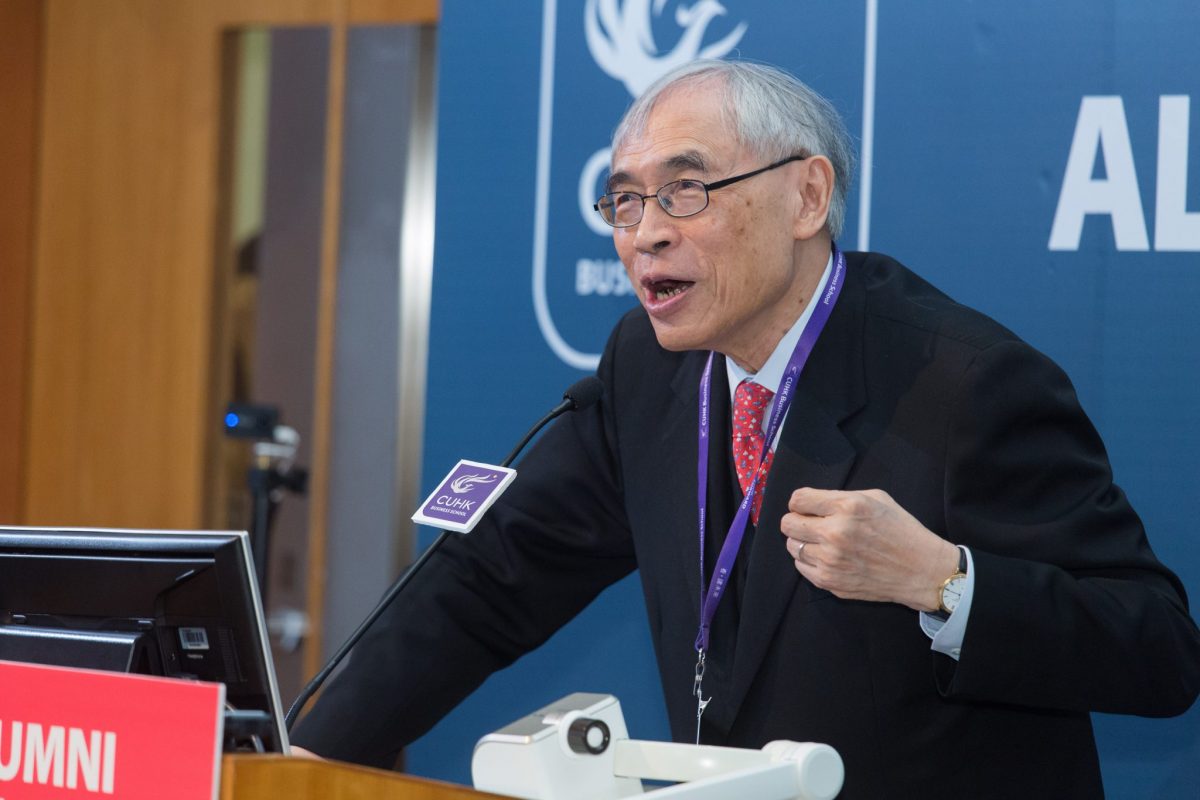 Prof. Lawrence Lau, Ralph and Claire Landau Professor of Economics at the Lau Chor Tak Institute of Global Economics and Finance of The Chinese University of Hong Kong (CUHK) Prof. Lau pointed to two key components that contributed to this development: “The first was the introduction of free markets for goods in the Chinese economy, coupled with conditional autonomy for the producers. The second, equally important component, was the opening of the Chinese economy to international trade and inbound foreign direct investment.” The first component happened as if by accident. “In December 1978, the people of Xiaogang Village in Anhui Province decided to divide up the responsibility of the commune. Every household would deliver its output quota and pay its share of the communal tax, but beyond that, they were free to produce anything and sell the surplus on the free markets and retain the proceeds.” This brilliant system ensured that no party became worse off. The government obtained the same output deliveries and received the same amount of taxes, the commune administration met its production and tax targets, and the households fulfilled their obligations and could earn more if they wanted. It was a win-win situation for everyone. “The commune, which no longer had any production responsibilities, began to organise other productive activities, forming what were known as ‘Township and Village Enterprises’, producing whatever goods that were needed with the resources available to the commune, and selling the outputs on the free markets.” Soon, other villages and provinces across China adopted this contract responsibility system, which was gradually extended to non-agricultural activities in the early 1980s. 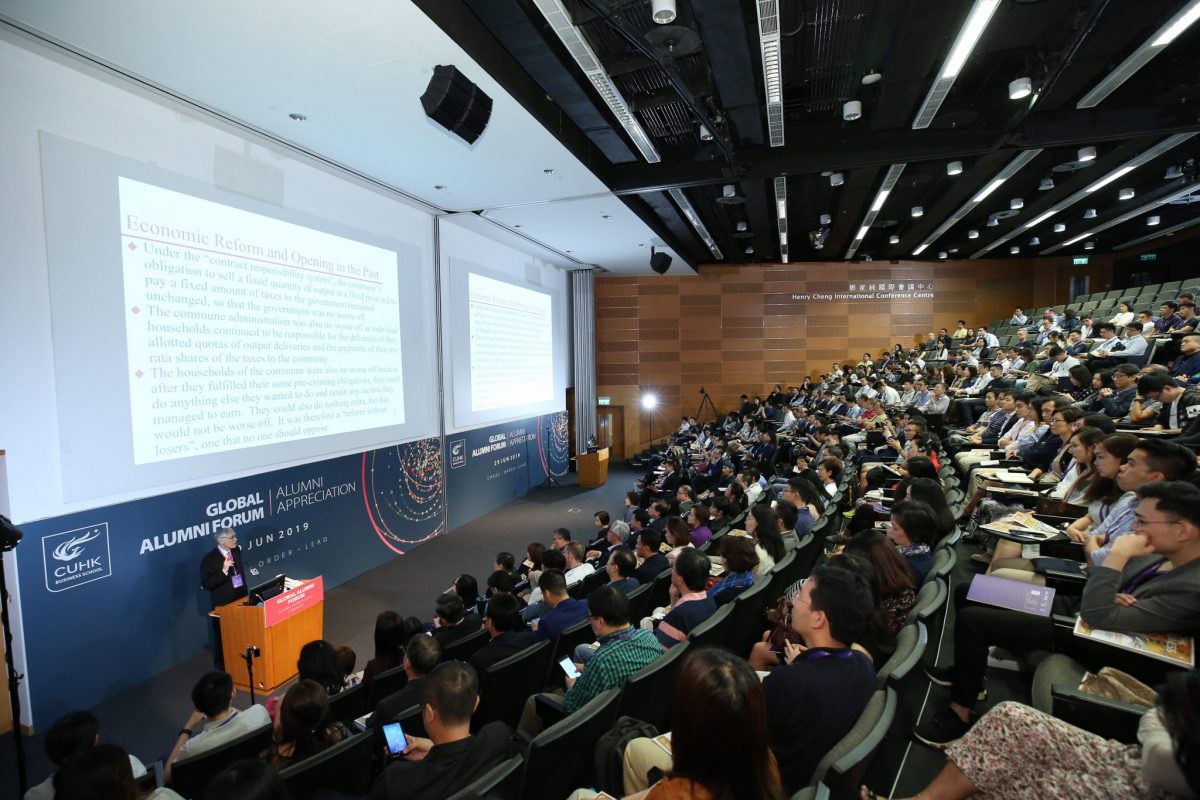 The speech delivered by Prof. Lawrence Lau attracted a full house of audience at the Global Alumni Forum. Prof. Lau called this dual-track system – in which the planned system and the free market system operated efficiently in parallel – a “reform without losers”. Eventually the value of economic activities outside the mandatory central plan grew to be much bigger than those within the plan, and mandatory central plans were gradually phased out, except for environmental and poverty alleviation targets. Another economic reform that contributed to China’s growth was the opening of its economy to international trade and inbound foreign direct investment. These developments have given China access to more resources and choices than it would have obtained if it had produced only within its set of “production possibilities”. The developments also paved the way for China’s export promotion strategy, with the Renminbi becoming internationally competitive and current-account convertible, and China’s accession to the World Trade Organisation (WTO) – which boosted China’s trade considerably and turned it into the second-largest trading nation in the world. Is reform without losers still possible today, then? Prof. Lau acknowledged that it will be much harder. He said that although income disparity in China has increased considerably, people still remember how bad things were in the late 1970s. Yet in 20 years’ time, the late 1970s will no longer be the baseline; it will be the 2000s. More people will be left behind, and the government will need to do more to ensure that the gains from economic development can be spread out more evenly to compensate the losers. He added that there are a number of challenges China must overcome in the near term to sustain economic growth: excess production capacity has to be reduced, supply side structural reform must be implemented, and initiatives must be put in place to address the degradation of soil, air and water. Additionally, issues such as income disparity and the ageing population must be managed, and the ongoing anti-corruption campaign must continue so as to let the market play a decisive role. 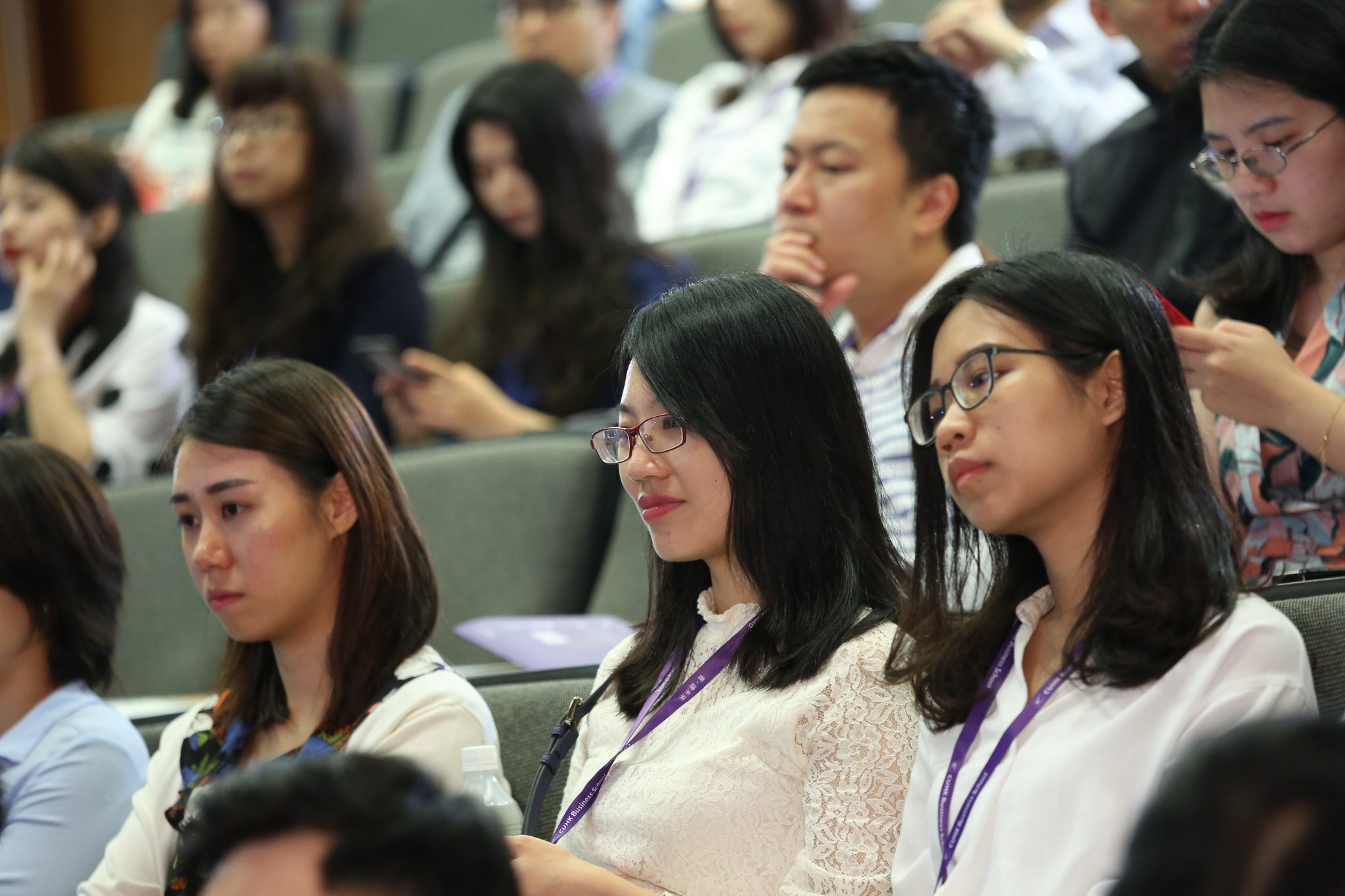 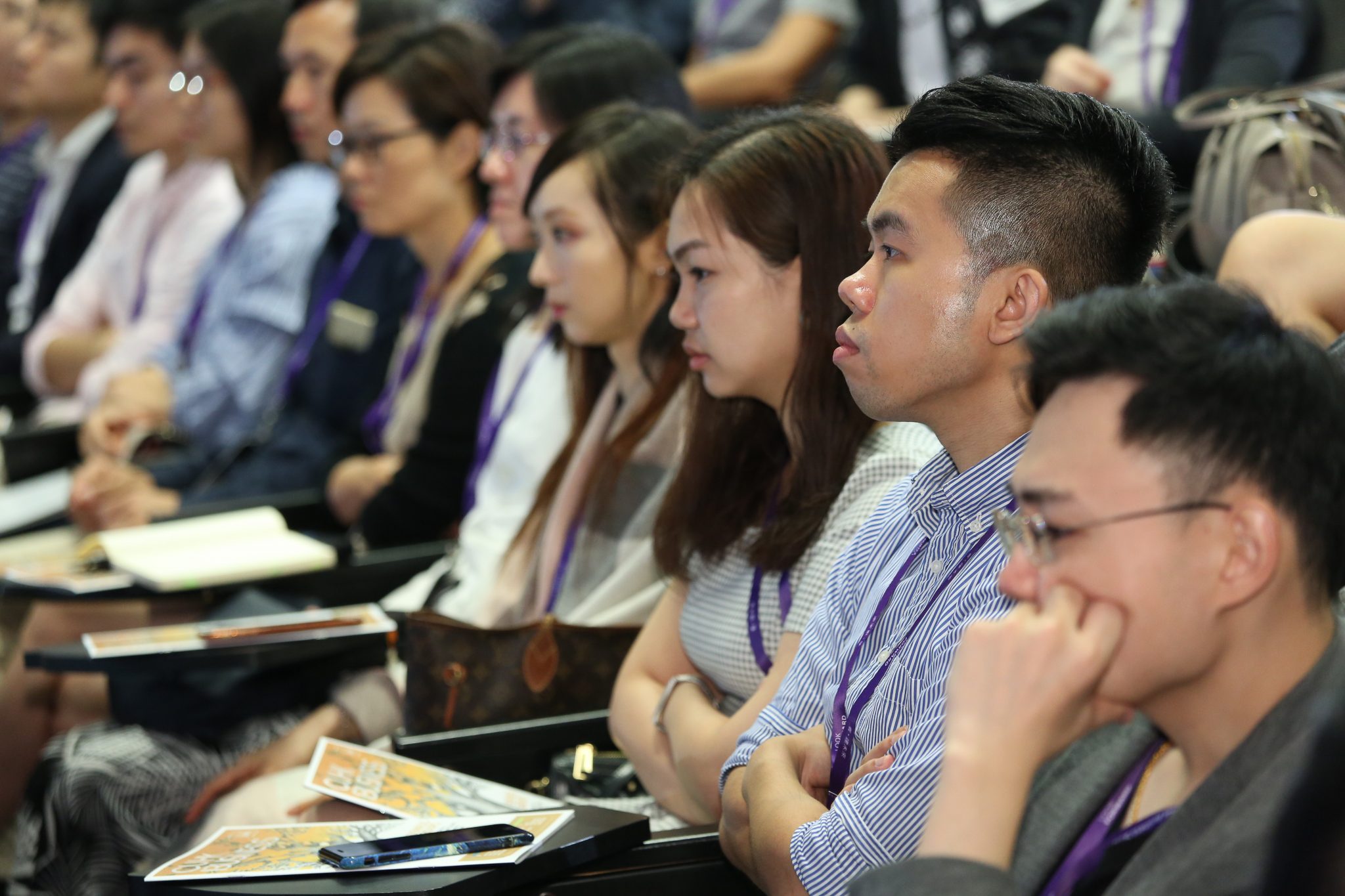 In the longer term, China should continue to strengthen the role of the market in the allocation of resources. It must also enhance the quality of growth and de-emphasise the quantity of growth, implement its “Three Zeros Strategy” (zero tariffs, zero barriers, zero subsidies), and work with the European Union (EU) and the Association of Southeast Asian Nations (ASEAN) to maintain the rule-based international economic order. Prof. Lau is optimistic about China’s prospects: “Data shows that China is within the range in which GDP can still grow very fast. For the next couple of decades, China can still grow at 5 to 6 percent. A high savings rate enables a high investment rate, and the still low capital-labour ratio allows much room for raising productivity. His projections show that China’s GDP will catch up to the US’s GDP by 2033, even if per capita GDP will remain lower until the end of the century.” Prof. Lau added: “China will continue its efforts to further reform and open its economy. It should be a win-win for China and the world. China has no intention of promoting its social and political system to the world, unlike the US and the former Soviet Union. There will be an opportunity for friendly, peaceful resolution.” The post Chinese Economic Reform: Past, Present, Future appeared first on CUHK Business School. |
| FROM CUHK: Should Case Method be Scrapped in MBA Teaching? |
|
For decades, case study has been the gold standard method of instruction for MBA programmes. The method where students pore over real corporate dilemmas, has gained stardom at Harvard Business School, which pioneered the approach, and sells its cases to hundreds of business schools around the world. But some schools are now railing against Harvard’s cases, claiming that they are outdated and fail to represent protagonists from all of society. These schools are relying less on Harvard’s cases and are developing their own in varied ways, or are rejecting the method fully as online and experiential learning proliferates. Is there a better way to teach future business leaders? Should the case method be changed, or scrapped entirely? In an interview with FIND MBA, Dr. Andrew Yuen, Associate Director of MBA Programmes and Senior Lecturer of Department of Decision Sciences and Managerial Economics at The Chinese University of Hong Kong (CUHK) Business School, says the beauty of cases is that students experience the relevancy of the knowledge in a real business context. “It is crucial for our students to apply what they learn in practice.” He adds that cases enable students to encounter a vast number of business scenarios in a short period of time, much more than they could in the workplace. Another concern is that most cases are written about western companies, which may not be as relevant to Asian students, says Dr. Yuen. “Although the situation is improving, there is still a lack of cases in other regions, including Asia,” he says. For this reason, CUHK Business School’s faculty have written more case studies about local companies. Dr. Yuen also agrees, “Case teaching is a key component in MBA education and there is no valid reason to scrap it entirely.”… Read More Source: FIND MBA Date published: 15 July 2019 The post Should Case Method be Scrapped in MBA Teaching? appeared first on CUHK Business School. |
| FROM CUHK: Alumni Appreciation Ceremony in Honour of Alumni Volunteers |
|
“I’m amazed that over 600 alumni volunteers supported the School last year in many different ways, be it as a mentor or speaker sharing valuable experience with students, as an interviewer or recruiter assisting with admission interviews or offering placements and internships, or even as a donor or sponsor supporting students’ learning opportunities,” said Prof. Kalok Chan, Dean of CUHK Business School in his opening remarks. “Every single act of giving, no matter how big or small it seems, truly supports the School. This gives us a good reason for hosting this inaugural ceremony to reciprocate your generosity.” Guests then had the opportunity to hear two alumni awardees ― Mr. Boris Ng (BBA in Integrated BBA 2014) and Ms. Daisy Cheng (MBA 1981) who shared their experience volunteering as alumni ambassadors and the rewards they gained by giving back to the School. Boris is an Associate at BlackRock and has actively volunteered as an interviewer, trainer and speaker for undergraduate programmes. Daisy was previously the Hong Kong Managing Director of BNP Paribas and recently came out of retirement to start her own company. She has been a long-standing MBA mentor since 2007. Daisy also invited her classmate Mr. Raymond So, President of CUHK Shanghai Alumni Association, for an amusing chat about the old days they treasured when studying for their MBAs some 38 years ago! This entertaining and inspiring sharing session prompted thunderous applause from the floor. 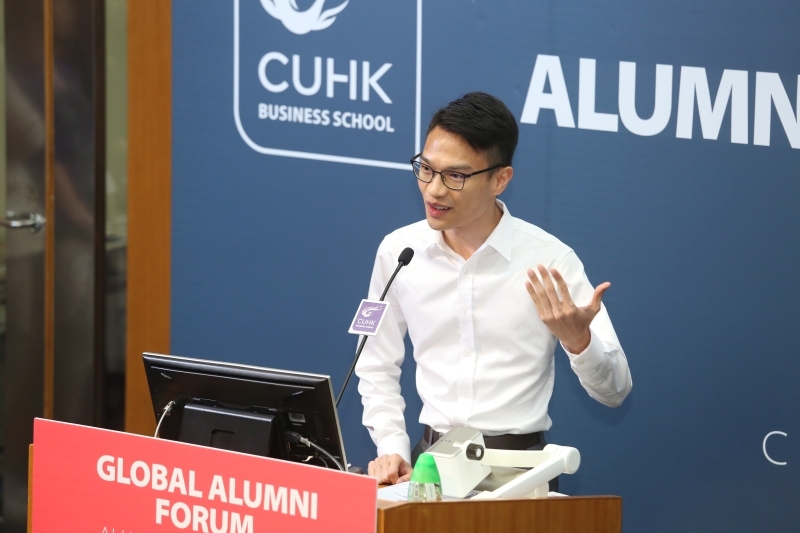 Mr. Boris Ng (IBBA 2014) shares with the audience his amazing volunteering journey and the awards he gained through giving 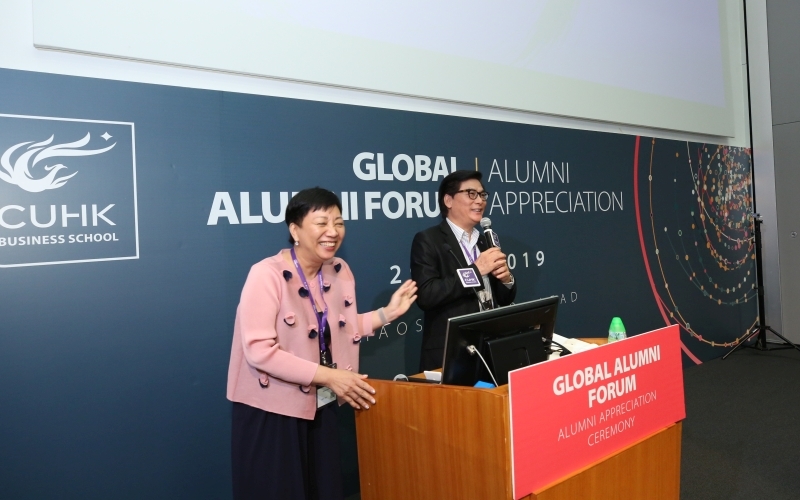 Ms. Daisy Cheng (MBA 1981) joins her classmate Raymond So for an amusing chat about the old days at the School some 38 years ago! Finally, the moment everyone had been waiting for arrived – the awards presentation with group photos taken onstage for over 100 alumni awardees, joined as they were by their beloved teachers. All basked in this happy moment, and were proud to have their family and friends watching them. A cocktail reception followed so that alumni and guests could enjoy memorable moments together, and each awardee received a specially designed appreciation certificate and a School souvenir. 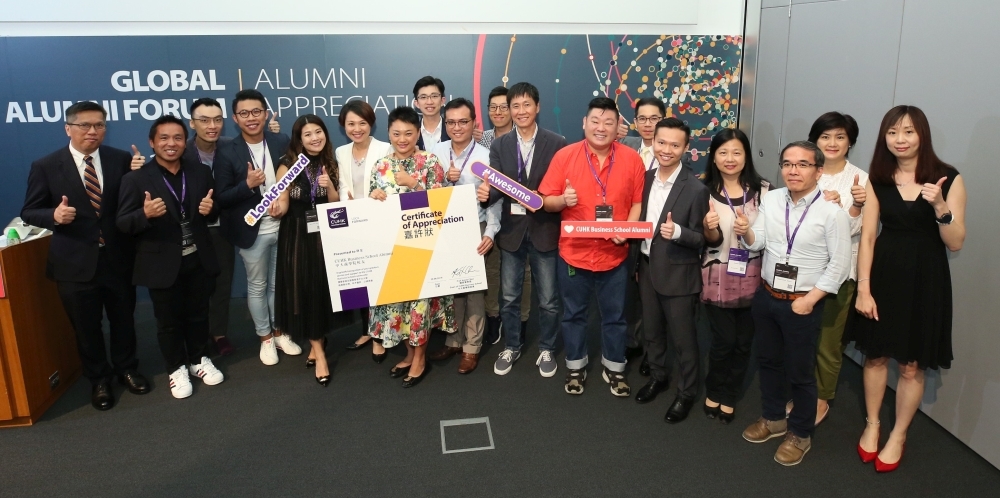 During the award presentation, alumni awardees from various BBA programmes happily take a group photo with Dean Prof. Kalok Chan (far left); Ms. Gentiana Cheung (6th from left), Director of BBA in Hospitality and Real Estate Programme; Prof. Andy Wong (6th from right), Associate Dean of Undergraduate Studies; Ms. Florence Lai (4th from right), Administrative Director of Alumni and Corporate Affairs Office; and Ms. Elaine Tam (2nd from right), Administrative Director of Undergraduate Office. Ms. Florence Lai, Administrative Director of the Alumni and Corporate Affairs Office, remarked, “This is our first time to host this appreciation event for our dedicated alumni volunteers. When we saw their happy faces during this special moment, joined as they were by their family and friends, it was clear that all our efforts have paid off. Certainly, we will organise this event again to express our deep gratitude to alumni for continuously supporting their alma mater.” View more photos This article is first published by the Alumni and Corporate Affairs Office, CUHK Business School. The post Alumni Appreciation Ceremony in Honour of Alumni Volunteers appeared first on CUHK Business School. |
| FROM CUHK: The Spark of Joy as a Guiding Light |
|
Dr. John Lai, Senior Lecturer of Department of Management and Co-director of MSc in Management (MiM) programme, has been teaching at The Chinese University of Hong Kong (CUHK) Business School for 12 years. Prior to that, he taught at City University of Hong Kong for six years. While part of his career was spent deep in the trenches – working in human resources and holding various positions in the hospitality, retail and marketing sectors, with experiences throughout Asia – Dr. Lai’s life path never veered far away from his initial dream of becoming an educator. It all started when he was 17. 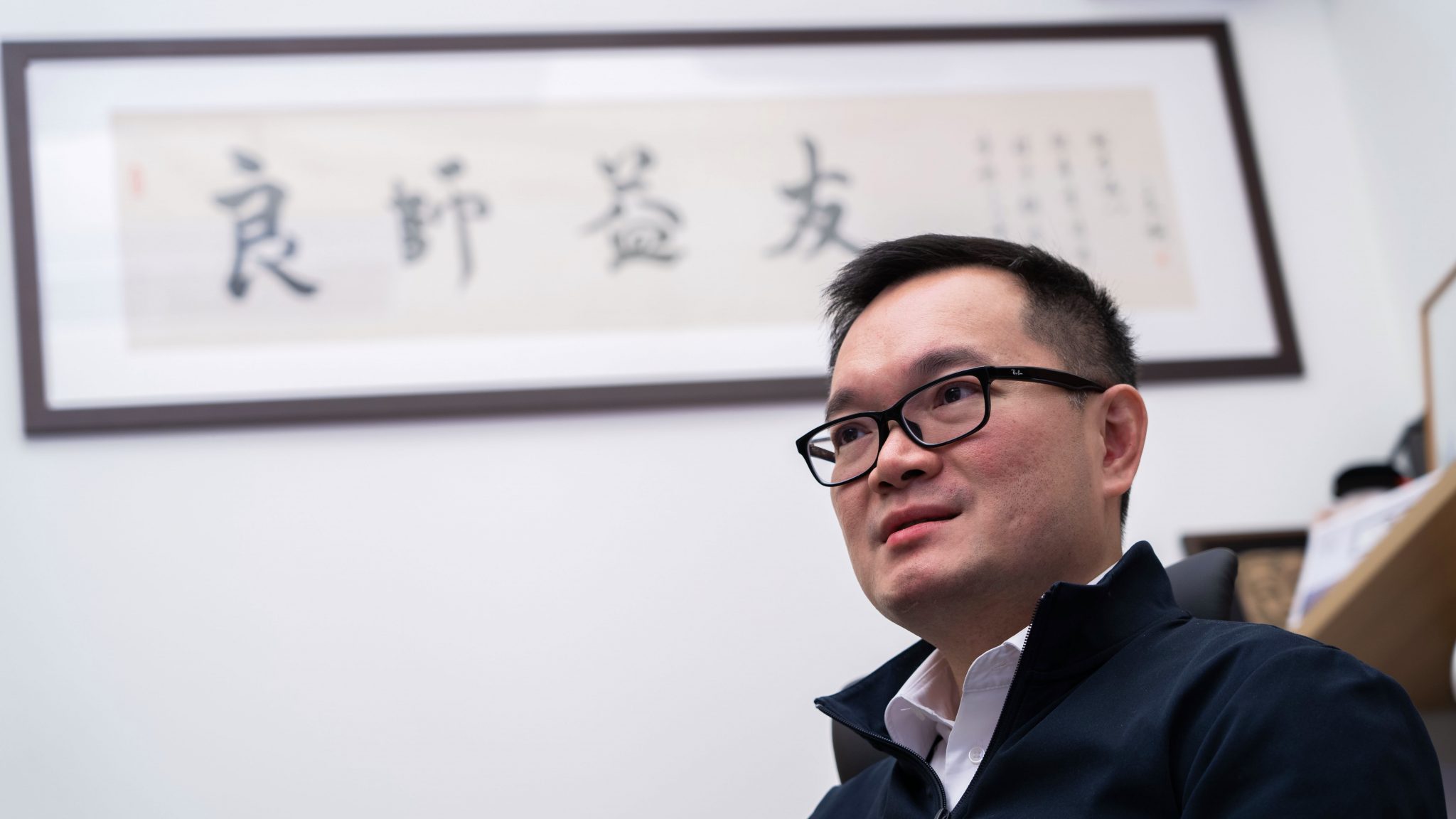 “I was looking at the ceiling and suddenly I saw a spark. It painted a really clear picture that I wanted to do something meaningful and teaching seems to fit in well and that I should be teaching in a university – but not in Malaysia, where I was born. Since then I have been following this path,” Dr. Lai recalls. Over the years, Dr. Lai has developed his own personal style of teaching, to the extent that his innovative methodology has earned him numerous accolades. At CUHK, he has received a number of teaching awards, including the University Education Award in 2018, the Vice-Chancellor Exemplary Teaching Award in 2014 and 2010, and the Faculty Outstanding Teaching Award of CUHK Business School from 2015 to 2017. What is at the core of his teaching style that makes it unique? Dr. Lai attributes his guiding principle to the Chinese philosophy “No distinction of classes”(有教無類). “Teaching university students is really challenging. At any given time, a professor could be a coach, mentor, teacher, facilitator, magician or technician,” he explains. “Since students come from very diverse backgrounds, there is no one-size-fits-all approach. It is our role as professors to help them understand who they are as unique individuals and unleash their potentials. It’s very important to have patience, because with patience, we are able to inspire them to understand themselves, and be able to make contributions to the society after graduation.” Teaching university students is really challenging. At any given time, a professor could be a coach, mentor, teacher, facilitator, magician or technician. — Dr. John Lai He recalls the early days of his teaching career when he thought his job was just about imparting knowledge from textbooks to students. Soon he realised that teaching is not about subjects but people. “It is important for us to find ways to engage students meaningfully to unleash their potentials. To do that, I emphasise the four C’s – critical thinking, creativity, communication and collaboration.” To enliven his students in a way that touches them deeply, Dr. Lai regularly uses storytelling as a powerful tool in his classes. He believes that his experiences in international business has helped him demonstrate to students how to link academic knowledge to the real world. “Storytelling is important. It helps students connect theories with practices. I often illustrate textbook chapters with real-life stories so students can feel how it is if they were in that position. Some of the stories come from my experiences. Sharing them is not about showing off how great I am, but showing them how not to make the same mistakes as I did!” Besides storytelling, Dr. Lai also adopts an experiential approach in his teaching. He takes students out of the campus and encourages them to participate in case competitions. “Xunzi(荀子)once said: ‘I hear and I forget. I see and I remember. I do and I understand.*’ So I try to incorporate this approach into the classroom to bring students to the world and bring the world to CUHK.” When there is involvement, there is commitment; when there is commitment, there’s going to be action.” — Dr. John Lai The third element in Dr. Lai’s teaching approach is networking. “The student body is so diverse. Typically, there are 70 students in the classroom. It’s a pity to see them just sit there before class, looking at their iPhones and iPads. So, I would ask students to rotate seats every week and get to know each other, not superficially but personally. When I assign projects, I encourage students to make sure there is a good mix of students from Hong Kong, Mainland China and overseas in each group. My own connection with students is also important for me to understand them. After all, it’s not only about teaching, it’s about helping students realise their potentials.” One way Dr. Lai connects with students is through https://gmatclub.com/chat groups. When he served as the Director of Global Business Studies (GBS) and International Business and Chinese Enterprise (IBCE) programmes for five years, he reached out to each cohort of students through a separate https://gmatclub.com/chat group. “The list is exhaustive. But I do have fun. This makes work exciting,” he says with a grin. While leading those two programmes that attracted elite students, he tried to involve and engage them in relevant events, workshops and study trips. “When there is involvement, there is commitment; when there is commitment, there’s going to be action,” he says. Speaking of commitment, Dr. Lai’s commitment to CUHK Business School has been a testimony of sheer dedication. While he was the Director of the two global business programmes, he simultaneously served as an Assistant Dean for Undergraduate Studies. How did he manage to juggle teaching, administrative work and research at the same time? At first, he was doubtful of his own ability to do so. But he recalls being encouraged by Shige Makino, Professor of Department of Management at CUHK Business School, when he was offered the positions by former Associate Dean Prof. Dennis Fan. “At that time, Prof. Makino said, ‘John, you’ve been teaching for so long, now it’s time to make a difference – not just in teaching, but in the programmes.’ I took that advice and jumped at the opportunity. Of course, balancing teaching, administration and research is a tough juggling act. So I asked Prof. Makino what the secret was. He looked me in the eyes and said, ‘Sacrifice!'” It makes my day when students still remember us after they have graduated for many years; when they still come back and stay connected with us by sharing a simple meal, coffee or tea, telling us how they are doing to the society. — Dr. John Lai This is not empty sacrifice though, emphasises Dr. Lai. “At the end of the day, if we understand that whatever humble contributions we’re making will help students in the learning process, it will make all the difference. If you love what you do, vocation is vacation.” Currently, Dr. Lai is Co-director of the recently launched MiM programme, which allows students to move directly to the executive management track without having to wait three years and work in business before applying for an MBA. The programme’s mission is to fulfill society’s need for business leaders who are generalists and at the same time, catalysts of change. It also aims to help shape the digital economy of Asia – to develop “global managers for the Asian century.” “We want to ensure that the MiM programme is a practice-oriented learning programme,” Dr. Lai remarks. During the semester, there will be continuous engagements with industry leaders. So far, there has been more than nine events involving industry leaders. In the coming months, the MiM Forum will be introduced. At the end of the programme, a capstone programme will bring students out of Hong Kong and immerse them in real-life consultancy projects. Besides teaching and directing programmes, research is the third of the three-legged stool Dr. Lai has been sitting on at the Business School. His research focus on business innovations and networks. “I try to do credible research along the way,” he says. “My inspiration comes from my supervisor, Prof. Steven Lui (Associate Professor of School of Management at UNSW Business School of the University of New South Wales) at my alma mater, the University of New South Wales. I believe that one way to stand out in research is to work closely with industry partners. We don’t want to create research just for the sake of being published in journals. Instead, we want to contribute to the success of organisations.” One of Dr. Lai’s most memorable projects was a research project for a Hong Kong retail chain. Over a six-month period, he visited 175 stores in Hong Kong, Macau, Shenzhen, Guangzhou, Shanghai and Beijing. “It was a great experience for me, because when I went to the outlets, I was able to observe and learn along the way,” he says. “This opened up my heart, mind and soul, and I was able to bring the research back to my teaching.” Our job doesn’t stop after students have completed the course or graduated from university. My fellow faculty members and I share the same belief that our role only begins when students have graduated, come back and shared their stories. — Dr. John Lai When asked about the most memorable event in his teaching life, Dr. Lai didn’t give a single incident but summed it up, “It makes my day when students still remember us the ‘Old Biscuits’ (a Cantonese slang meaning old-timers) after they have graduated for many years; when they still stay connected with us by sharing a simple meal, coffee or tea, telling us how they are doing to the society. That’s what makes teaching so special to me.” In fact, one of Dr. Lai’s strongest convictions about teaching is that it is a “life-long warrantee”. “Our job doesn’t stop after our students have completed the course or graduated from university. My fellow faculty members and I share the same belief that our role only begins when students have graduated, come back and shared their stories. That’s a proof that they have put into practice what they have learned. And when they share stories with me, I can share them with the current students,” says Dr. Lai, with an even stronger spark in his eyes. It is clear how his life is driven by passion. What he finds most interesting about his work is that every day is different. “I try to look for what Marie Kondo(近藤麻理惠)calls ‘the spark of joy’ in work, so that my excitement can be perpetuated . And that, my daily work as a faculty member will not become routine.” 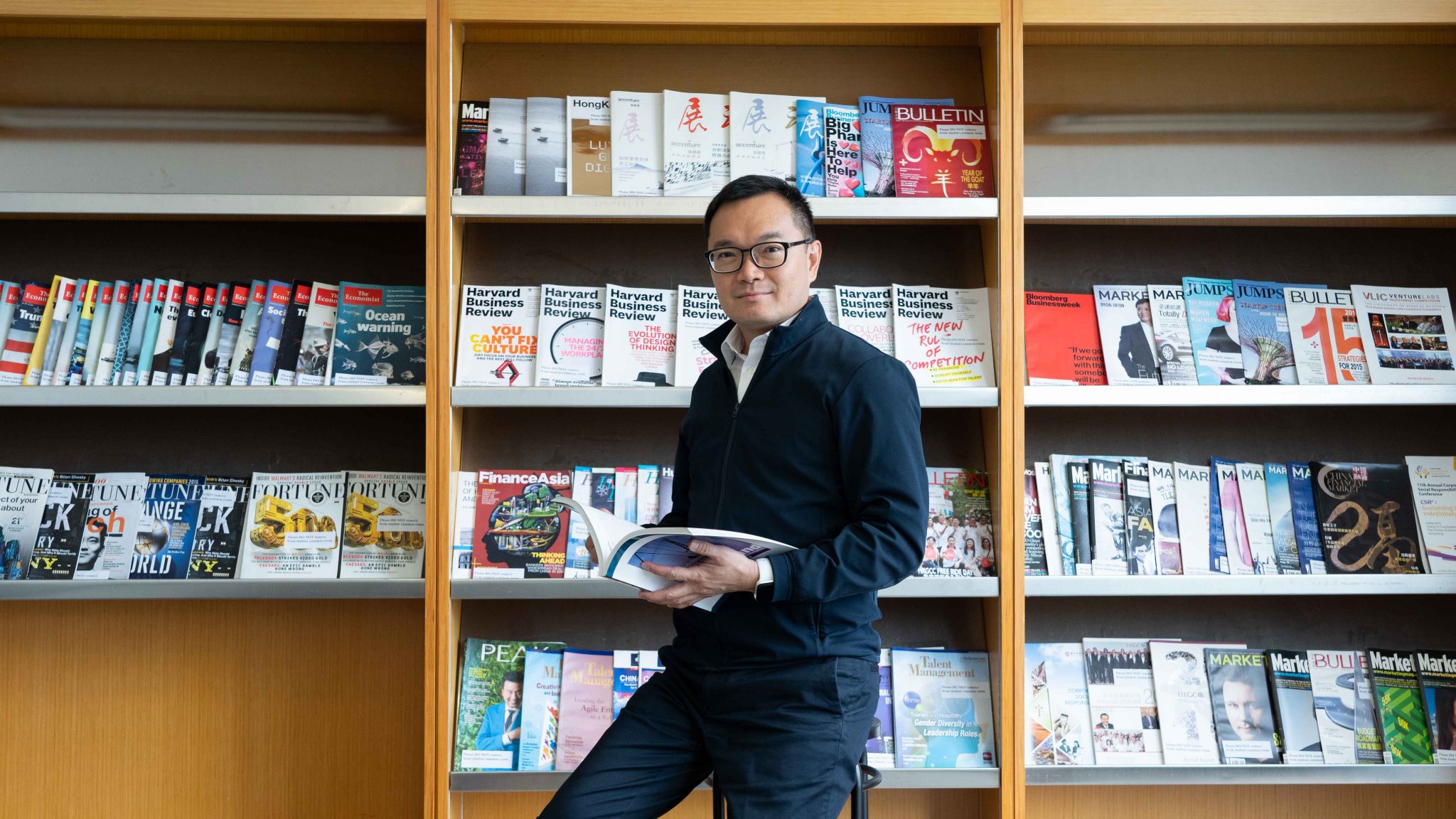 *Source: “不聞不若聞之,聞之不若見之,見之不若知之,知之不若行之,學至於行之而止矣。” – Xunzi’s “Confucian Effect” Chapter(儒效篇) The post The Spark of Joy as a Guiding Light appeared first on CUHK Business School. |
| FROM CUHK: CUHK Business School Admits More Than 800 Outstanding Local and International Undergraduates for 2019-20 |
|
Among all nine JUPAS participating institutions, CUHK Business School has two out of the ten most competitive programmes/streams based on median admission scores of students’ best five subjects. These programmes/streams include Global Business Studies (GBS), Quantitative Finance and Risk Management Science (QFRM). GBS once again admitted JUPAS applicants who achieved a score of 35, i.e. Level 5** in five subjects in the Hong Kong Diploma of Secondary Education (HKDSE) examination this year. CUHK Business School is well recognised and sought after by local students who want to pursue business education at university. The School has admitted many high-calibre local and international students through various channels. Some of the incoming students include:
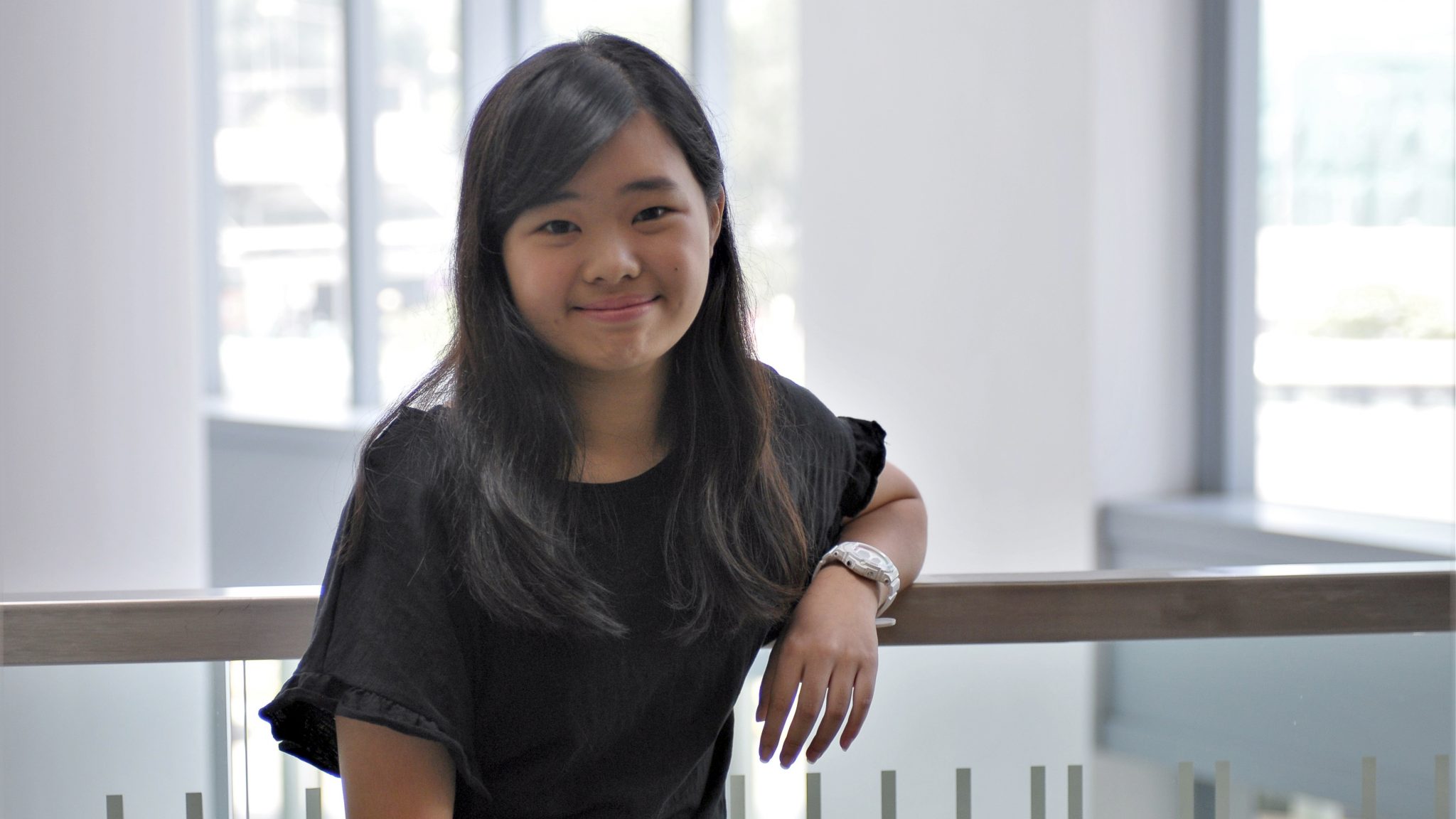 GBS student Jasmine Tang Long Ching
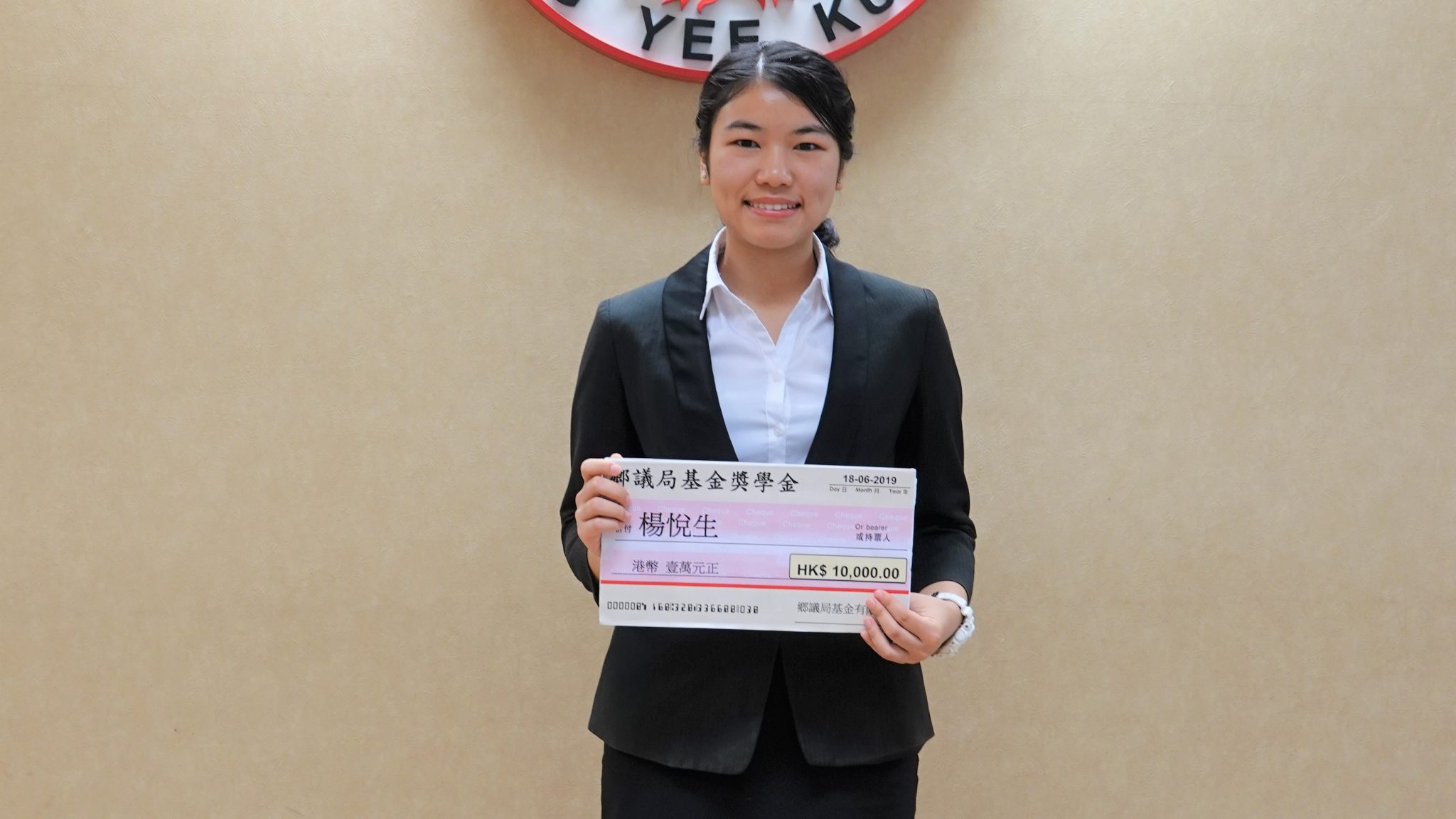 GBS student Chloe Yeung Yuet Sang CUHK Business School is dedicated to building a culturally, ethnically, and socioeconomically diverse academic environment. To achieve this goal, the School admits outstanding international students each year. For the upcoming academic year, the School will welcome 223 students from 19 countries and regions, including Canada, Chile, China, India, Indonesia, Jamaica, Japan, Macau, Malaysia, Mexico, Myanmar, Nepal, New Zealand, Singapore, South Korea, Taiwan, Thailand, UK and the United States. In addition, 28 exceptionally talented students were admitted to the School through the Sports Scholarship Scheme (SSS), School Principals’ Nomination Scheme (SPN) and Multi-faceted Excellence Scholarship (MFES). The MFES was started by the HKSAR Home Affairs Bureau in 2015. Through the scholarship scheme, local undergraduate students are awarded full-tuition fee scholarships by the government each year in recognition of their achievements in non-academic areas such as sports, arts and community service. The School takes pride in admitting two MFES awardees, including:
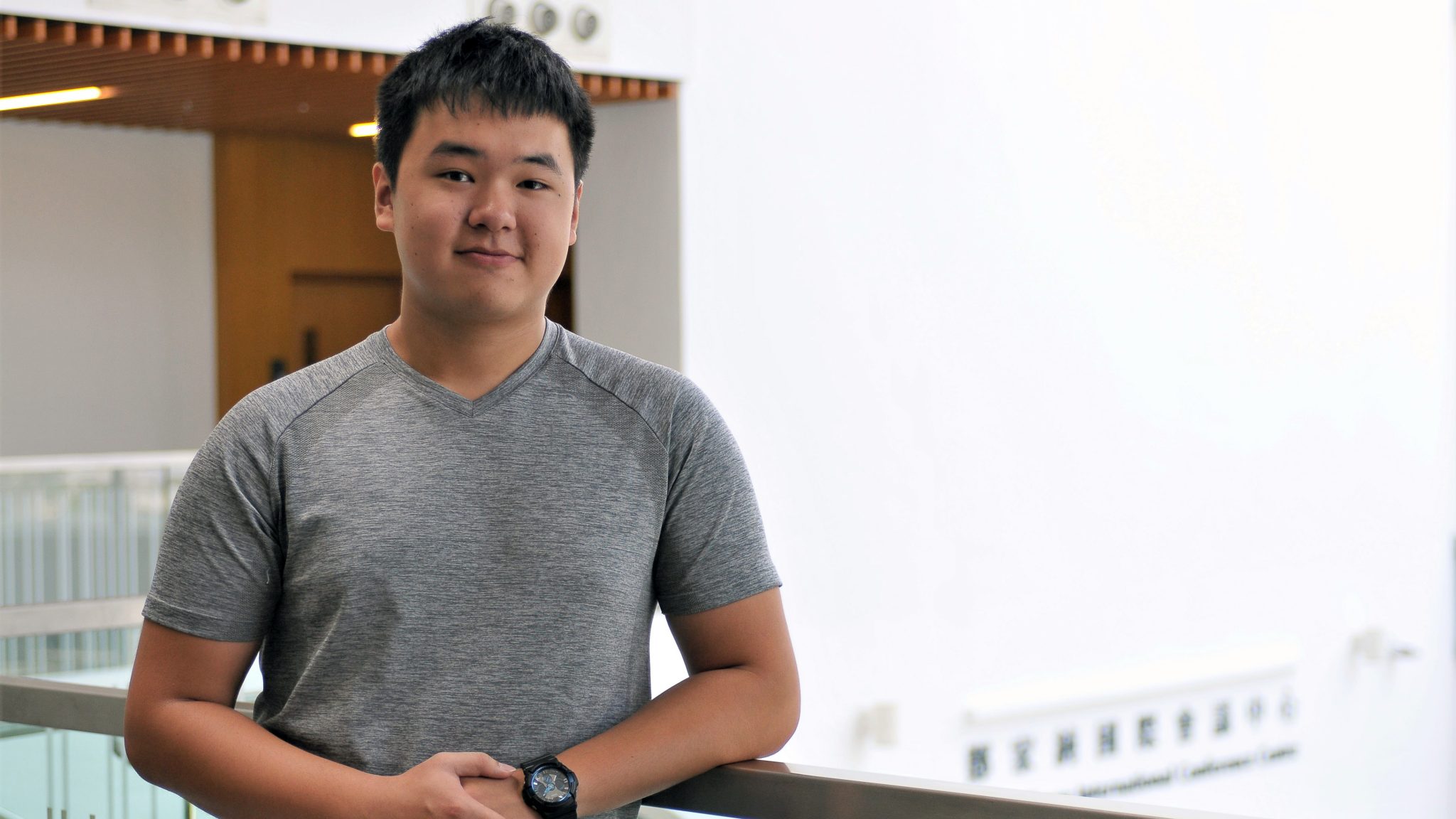 QFIN student Alex Cheng Ho
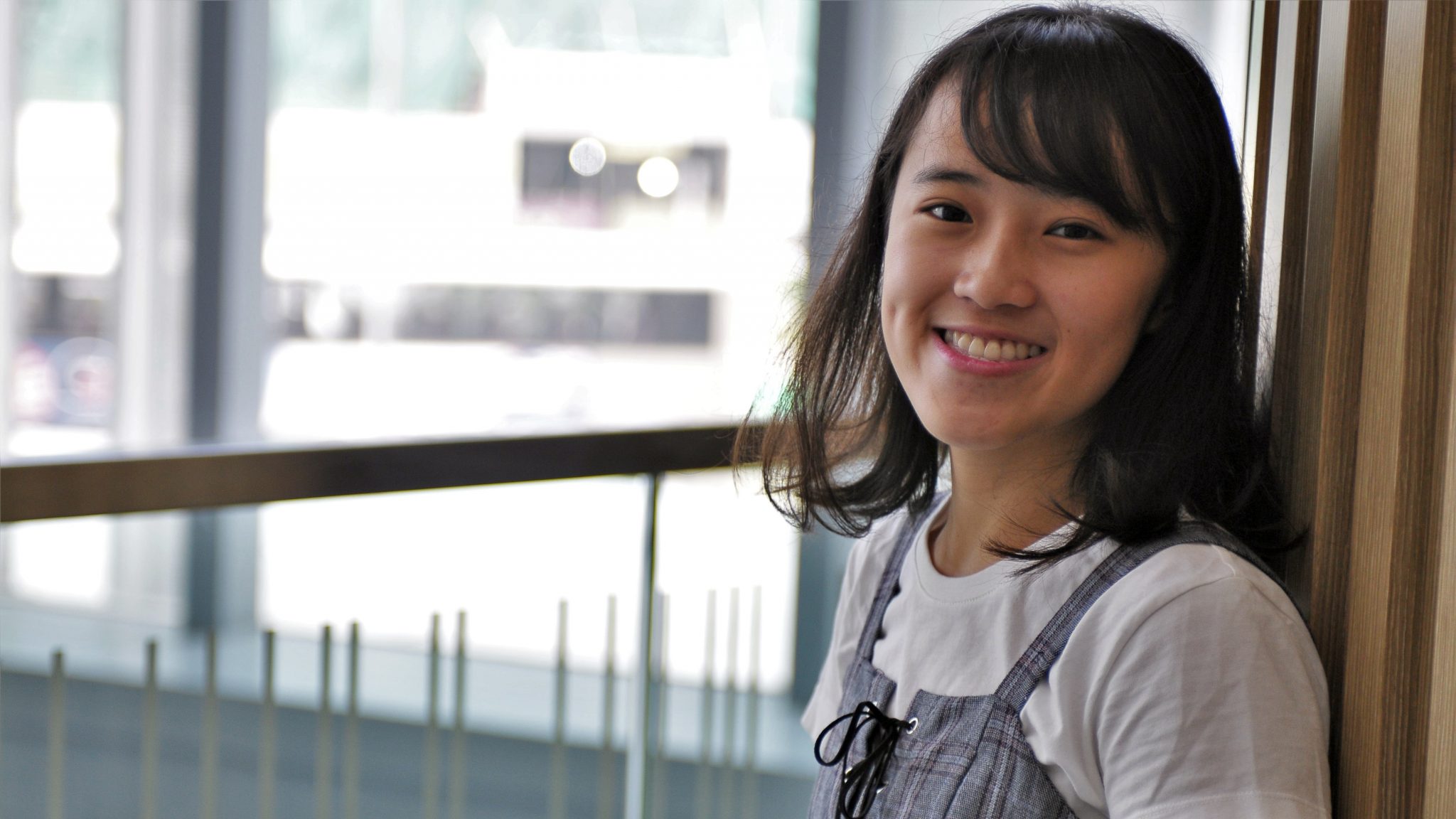 PACC student Cho Lee Shan
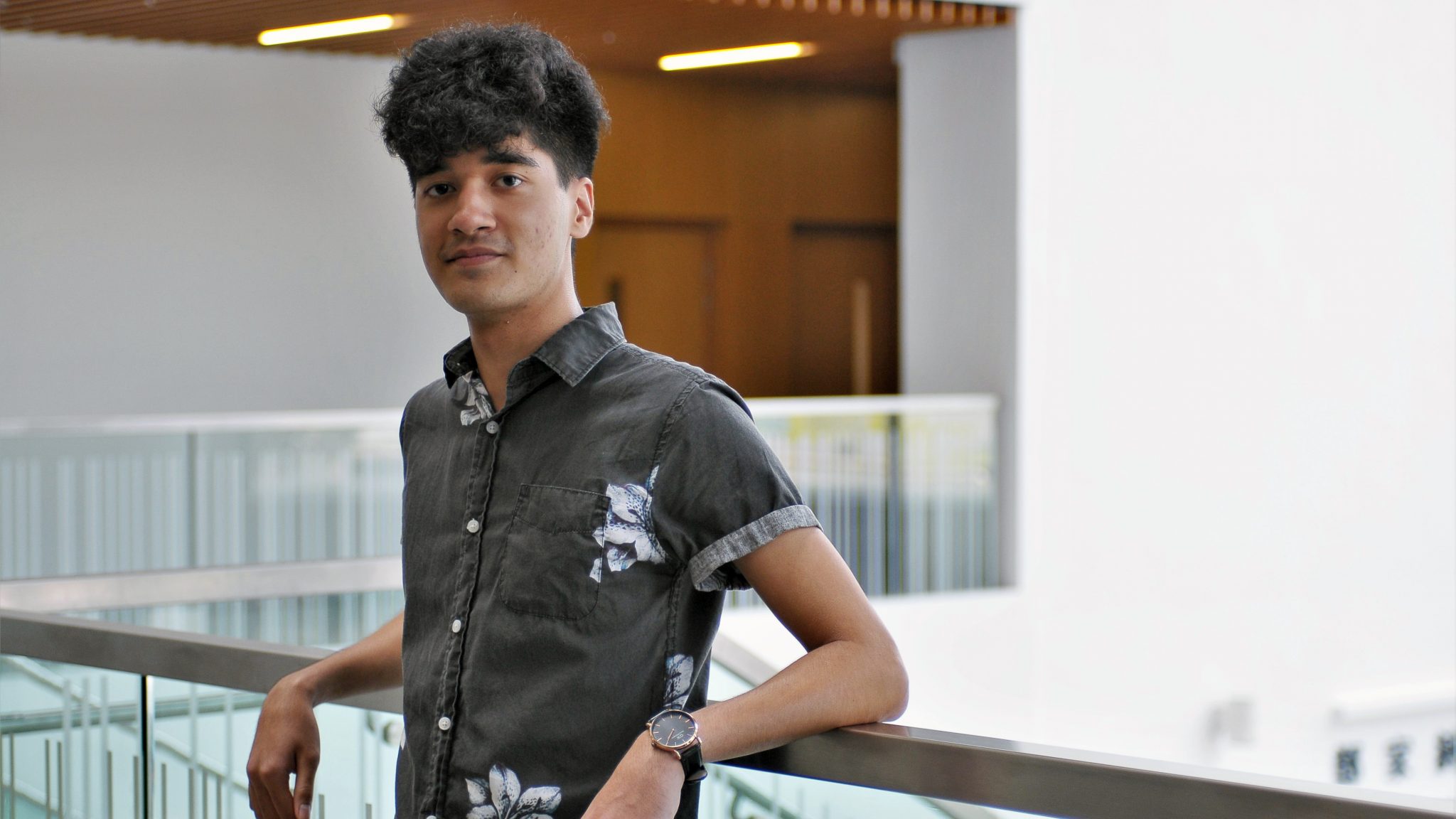 BBA-JD student Jason Bootwala The school admitted another 13 students excelling in sports via the SSS. These athletes have been representing Hong Kong in a variety of sports competitions, including badminton, basketball, handball, swimming, track and field, volleyball and water polo. Photo by Vivian Lam The post CUHK Business School Admits More Than 800 Outstanding Local and International Undergraduates for 2019-20 appeared first on CUHK Business School. |
| FROM CUHK: CUHK Business School Hosts the Inauguration Ceremony for Undergraduates 2019 |
On their first day of university, students joined the CUHK Business School Inauguration Ceremony held at Cheng Yu Tung Building. Prof. Kalok Chan, Dean of CUHK Business School and Wei Lun Professor of Finance, Prof. Andy Wong, Associate Dean (Undergraduate Studies) and Associate Professor of Practice in Marketing of CUHK Business School, and Ms. Angel Ng, Chief Executive Officer of Citi Hong Kong and Macau, took turns to motivate students with words of wisdom on how to maximize their university life.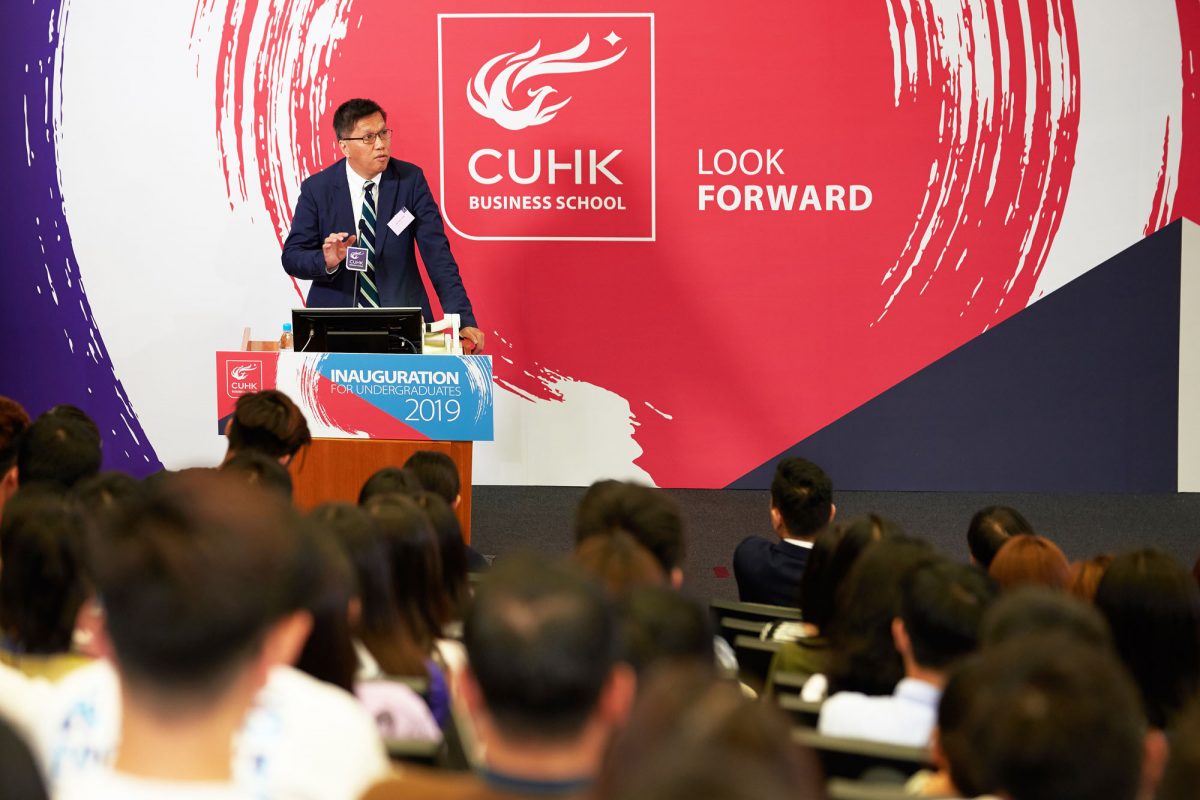 Dean Chan took to the floor by welcoming students from 19 countries and regions, including Canada, Chile, China, India, Indonesia, Jamaica, Japan, Macau, Malaysia, Mexico, Myanmar, Nepal, New Zealand, Singapore, South Korea, Taiwan, Thailand, UK and the United States. He introduced the growth opportunities on campus, such as Global Experiential Learning, Business Leader Series, and business sustainability initiatives, which build their leadership capabilities. He encouraged students to immerse themselves in global experiences, respect different cultures and backgrounds, solve problems with creativity and an entrepreneurial attitude, and nurture a socially responsible mindset. 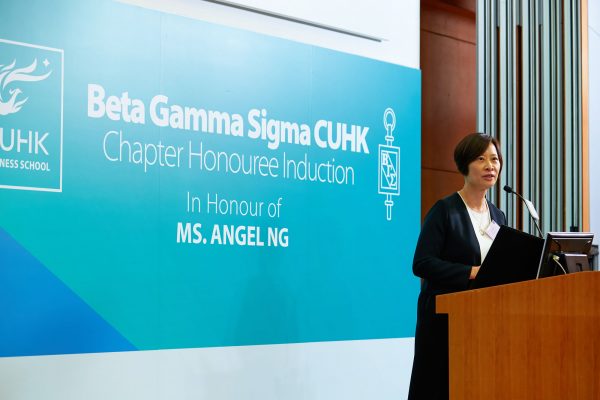 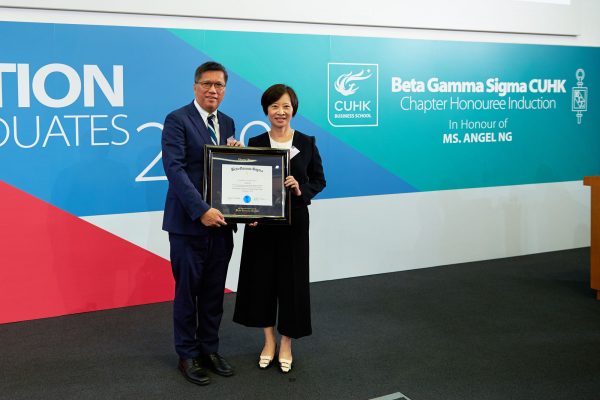 Ms. Angel Ng (BBA 1990), the CUHK Beta Gamma Sigma Chapter Honoree of 2019, shared her life lessons that made her who she is today. During her university life and career, she spent time defining her own success, understanding her abilities and developing the required qualities. Believing that many of the life lessons are learned through failures rather than success, she encouraged students to stay resilient, passionate and positive while embracing opportunities ahead. 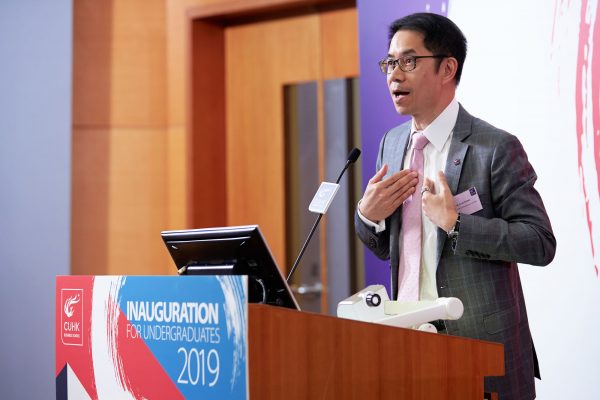 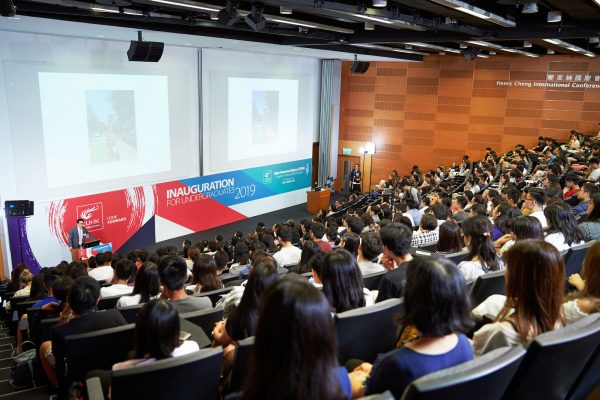 Finally, Prof. Andy Wong used three personal stories to highlight six things he learned from his problems in life. He hoped students could give one more try and seek help from others when on the verge of giving up; when dealing with helplessness, accept the reality and focus on incremental efforts albeit small progress; when facing hatred, be helpful, constructive and forgiving. He concluded the Inauguration Ceremony by cheering students on being patient, smart and strong leaders. 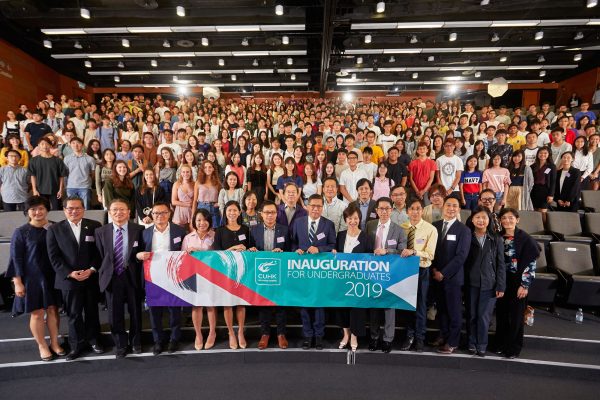 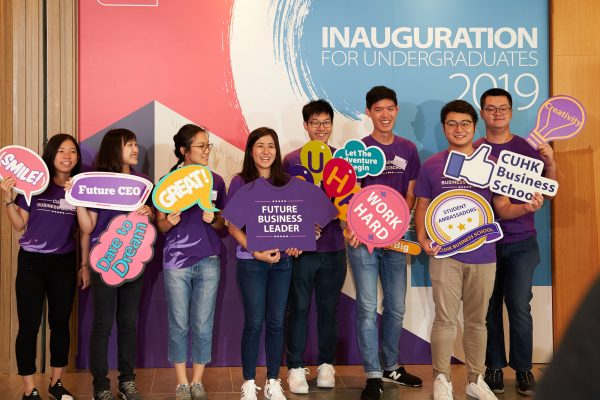 The post CUHK Business School Hosts the Inauguration Ceremony for Undergraduates 2019 appeared first on CUHK Business School. |
| FROM CUHK: Homegrown Iron Man Finds Success in Entrepreneurship |
Mark Mak (MBA 2011) always had a childhood dream of becoming a robot superhero. He met like-minded classmate Eden Lu (MBA 2011) while they were attending the CUHK part-time MBA programme. Fulfilling this dream, together they founded Roborn Dynamics, which collaborated with China Mobile and ZTE Corporation to successfully develop China’s first 5G Motion Control Humanoid Robot. The invention has earned the company numerous technology and business accolades. Roborn Dynamics has expanded its presence to several cities in the Greater Bay Area. None of this would have happened without an iron will.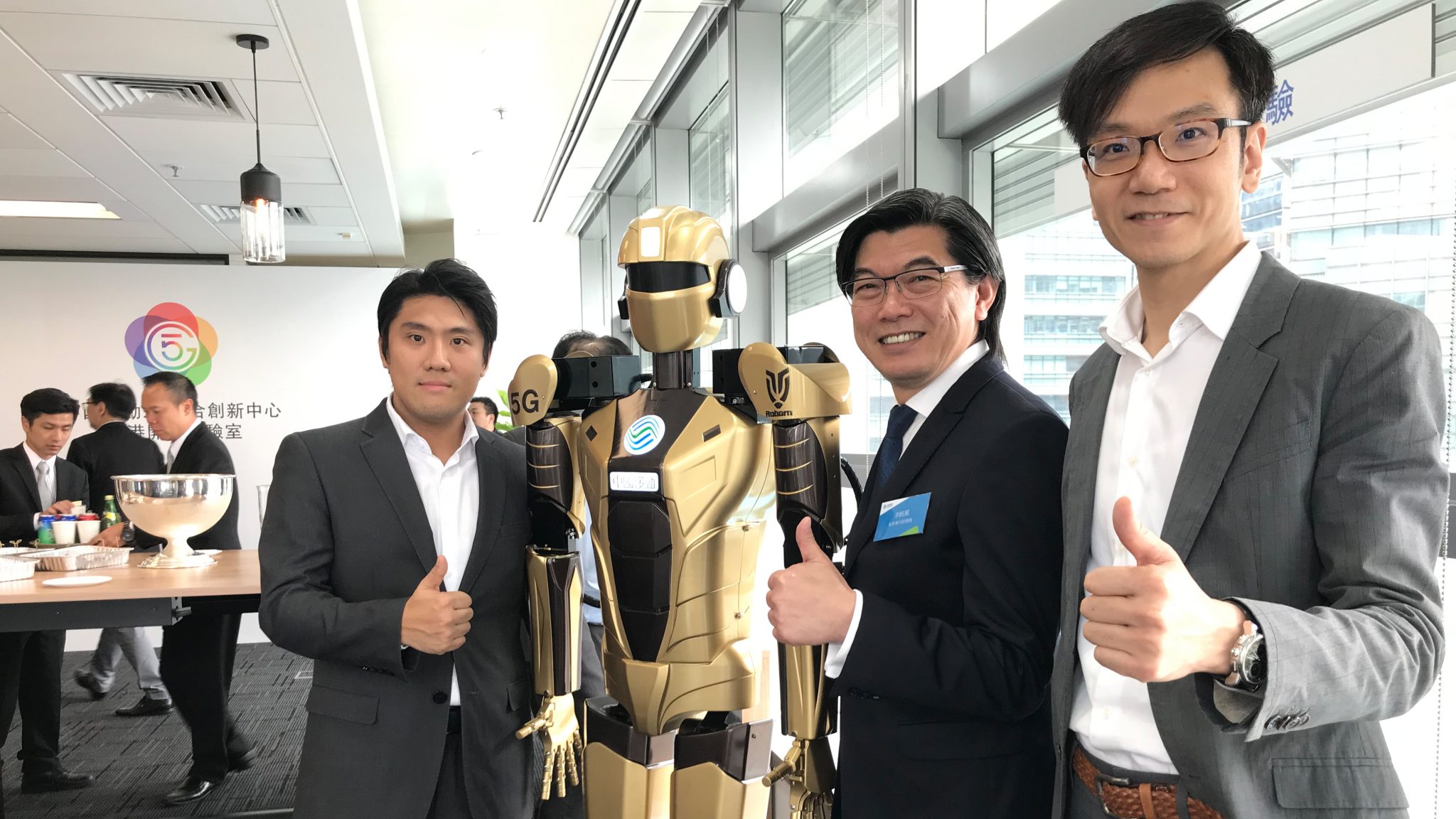 Roborn Dynamics displays China’s first 5G Motion Control Humanoid Robot in Hong Kong for the first time at the China Mobile 5G Innovation Center Hong Kong Open Lab Grand Opening in April this year. Mark (1st from left) and Eden (1st from right) pose with Mr. Sean Lee, CEO of China Mobile Hong Kong. Turning Movie Scenes into Reality with Tenacity Remember the thrilling Air Force One rescue scene in Iron Man 3? As soon as Iron Man returns from saving passengers mid-air, he is crushed into pieces. Fortunately, the real Tony Stark is not inside the robot but controlling it with motion sensor and virtual reality technologies off site. This motion sensor technology is what Roborn Dynamics is all about. A human operator can control all upper body movements of the robot with just four sensors attached to the operator’s body. The movements of the operator and the robot counterpart are perfectly synchronised as if they are one. Mark, who majored in electrical engineering as an undergrad, is Director of Technology for the company. Eden, who majored in economics and finance, is CEO. Although Roborn was only founded in 2017, Mark had been working on the algorithm and design of the robot for a few years before that. The 2003 SARS outbreak in Hong Kong and the 2011 Fukushima Daiichi nuclear disaster in Japan prompted Mark to ponder: What if a robot could perform dangerous tasks such as disinfecting a contaminated area or inspecting a disaster area? Would that reduce casualties? This aspiration motivated him to make his childhood dream a reality. 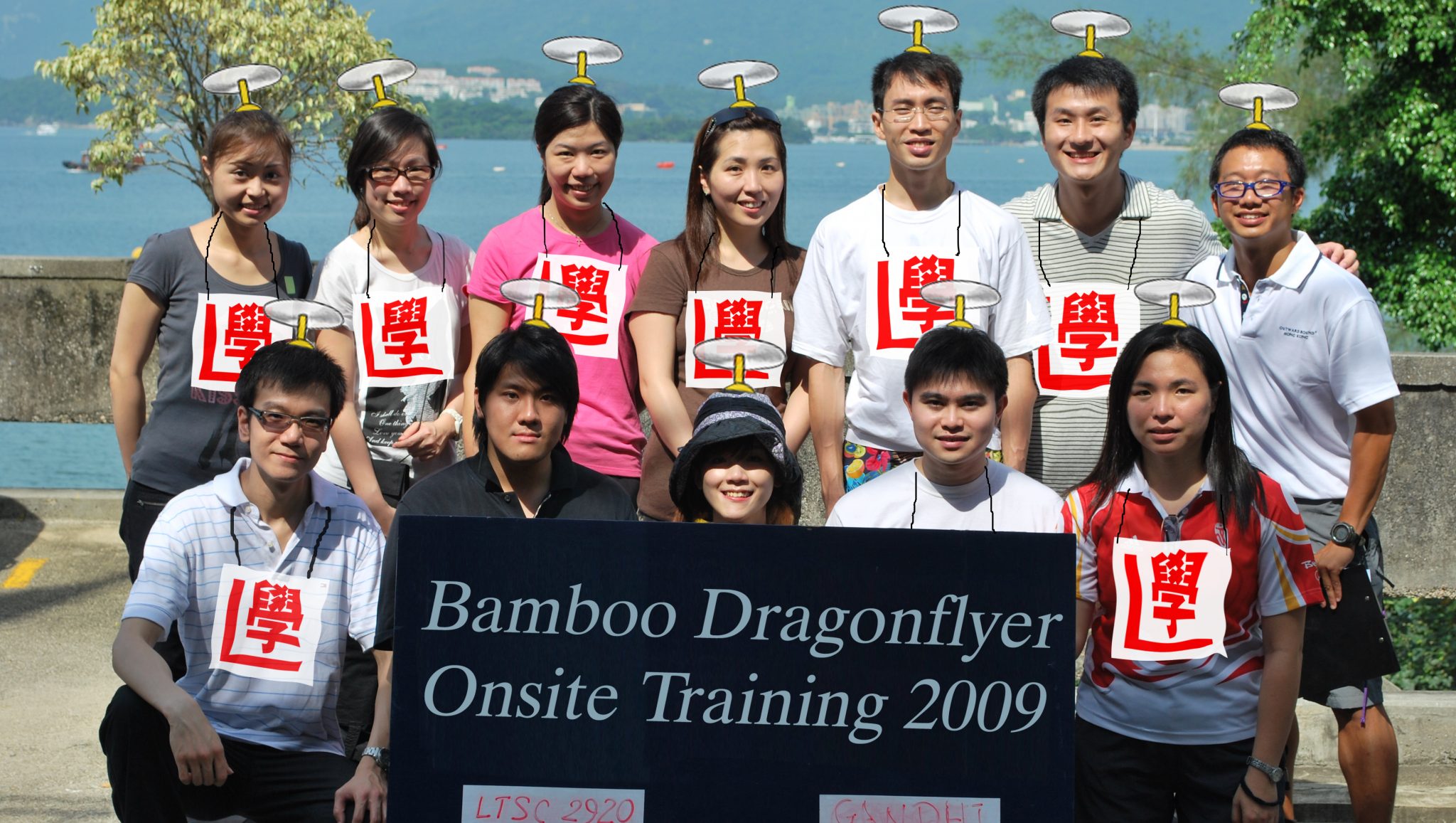 Eden (1st from left) and Mark (2nd from left) are from the same MBA class. The like-minded duo founded Roborn Dynamics in 2017. Mark has been moving toward his goal one step at a time, from the first finger, to the first arm, then to the whole robot. Along the way he had doubters and moments of self-doubt. He overcame each challenge by pressing on with sheer determination. He was not even sure if the unthinkable could be achieved until the first prototype was completed. 5G Gives Rise to the Real Robot Superhero Besides a mission and applicable knowledge, timing is also crucial to entrepreneurship. Contrary to robots that are controlled by conventional means such as generic programming or remote control, a motion control humanoid robot relies on real-time transmission to optimise motion synchronisation and allow the operator to see what the robot sees first hand. Real-time transmission requires a frequency band with minimal delay and high bandwidth. The birth of 5G technology could not have come at a better time. It makes motion control without being constrained by distance a possibility. 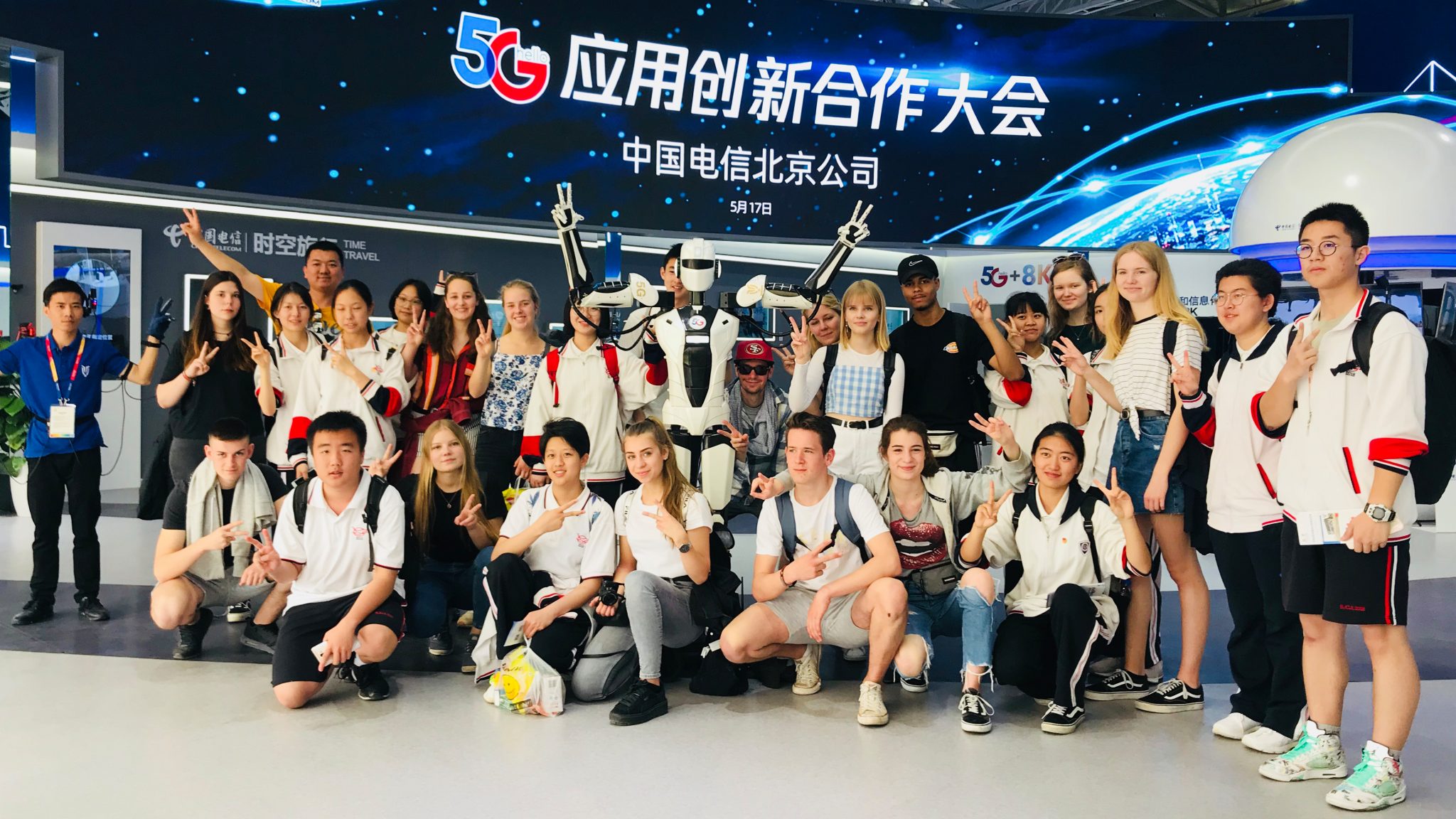 Roborn Dynamics displays its 5G Motion Control Humanoid Robot at the China Telecom 5G Innovation Cooperation Conference earlier this year. The invention drew a big crowd for a group photo. Currently, mainland China has the best 5G coverage in the world. Mark and Eden went north to team up with 5G network service providers and infrastructure suppliers such as China Mobile and ZTE Corporation. Their product became China’s first 5G Motion Control Humanoid Robot, which has been on a nationwide tour. The project received the Hong Kong Awards for Industries 2018: Equipment and Machinery Design Grand Award and Hong Kong ICT Awards 2019: ICT Startup Grand Award and ICT Startup (Hardware & Devices) Gold Award. These honours significantly raised the profile of Roborn. Through the exchange with business partners, the duo learnt that requirements for speed and strength in different sectors vary along the industry chain. They consequently adjusted their operation model from creating a one-size-fits-all standard robot to making bespoke robots to serve different purposes. Their largest robot has a 60cm-wide palm. It specialises in moving manhole covers or turning valves in biogas environments. 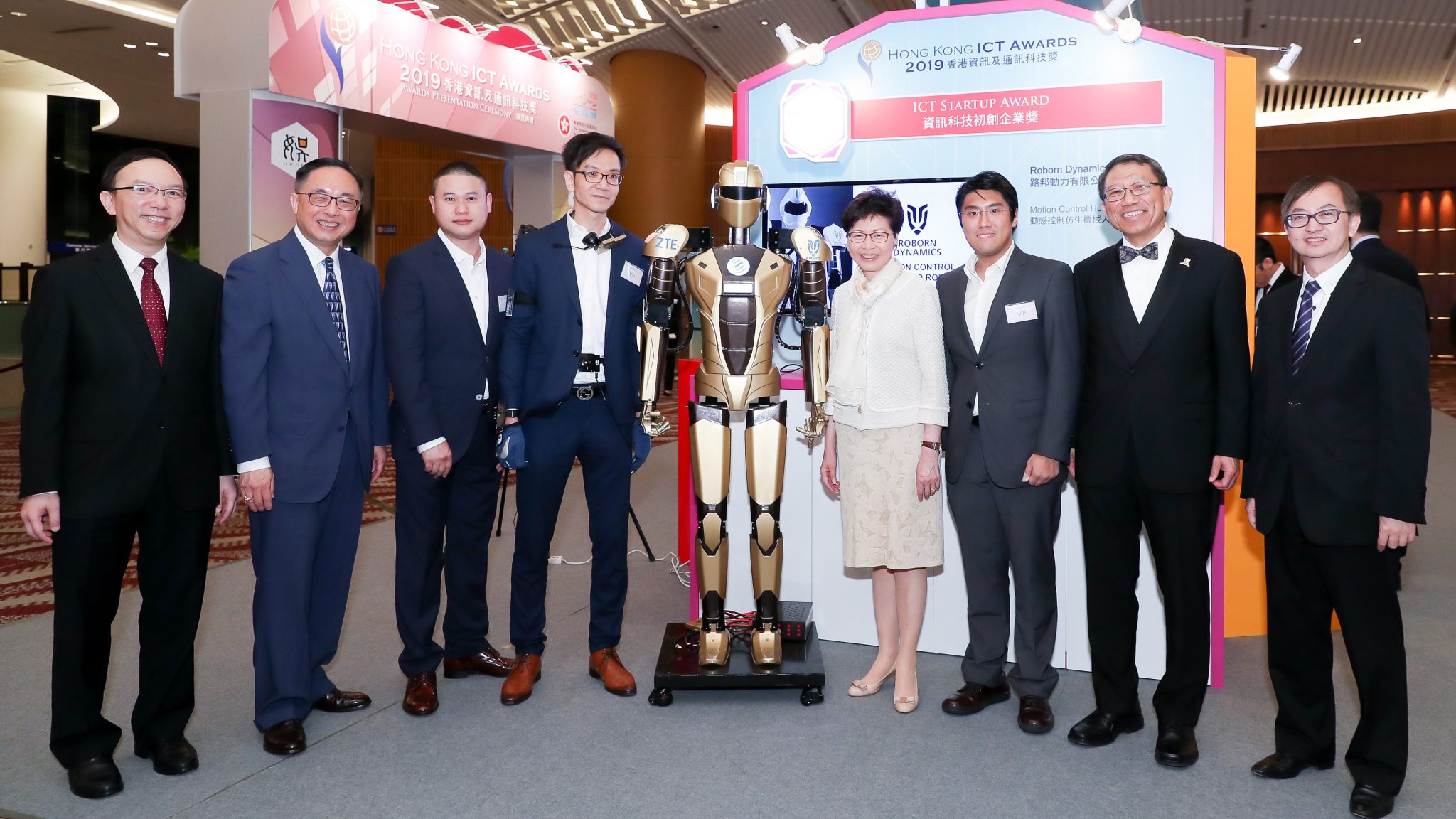 Roborn Dynamics receives the ICT Startup Grand Award and ICT Startup (Hardware & Devices) Gold Award at the Hong Kong IT Awards 2019. Mark (3rd from right) and Eden (4th from left) pose with HKSAR Chief Executive Mrs. Carrie Lam (4th from right) and Grand Judging Panel Chairman and CUHK Vice-Chancellor Prof. Rocky Tuan (2nd from right). Chasing After Their Dream As a Team Cyberport is the home of Roborn Dynamics, and it has established a presence in several Greater Bay Area cities such as Guangzhou, Dongguan and Jiangmen in order to acquire talent in science and research and form collaborations with local universities and research institutes. Together they initiate projects that meet industry needs and offer corresponding services to local industries. In retrospect, Mark and Eden pinpoint three factors that have played an important role in their startup experience. Firstly, they seized opportunities and reaped the benefits of being first to market. They consider 5G a paradigm-shifting information technology. Besides motion control humanoid robot, autonomous car, and 4K livestreaming, there are many untapped vertical markets waiting for entrepreneurs with a vision. Secondly, it is important to assemble a team with shared passion. Mark and Eden’s employees are strongly working towards the same goal. Since there are no other motion control humanoid robots in the market for comparison, they must develop their technologies in house. They can only overcome all the challenges with endless passion. 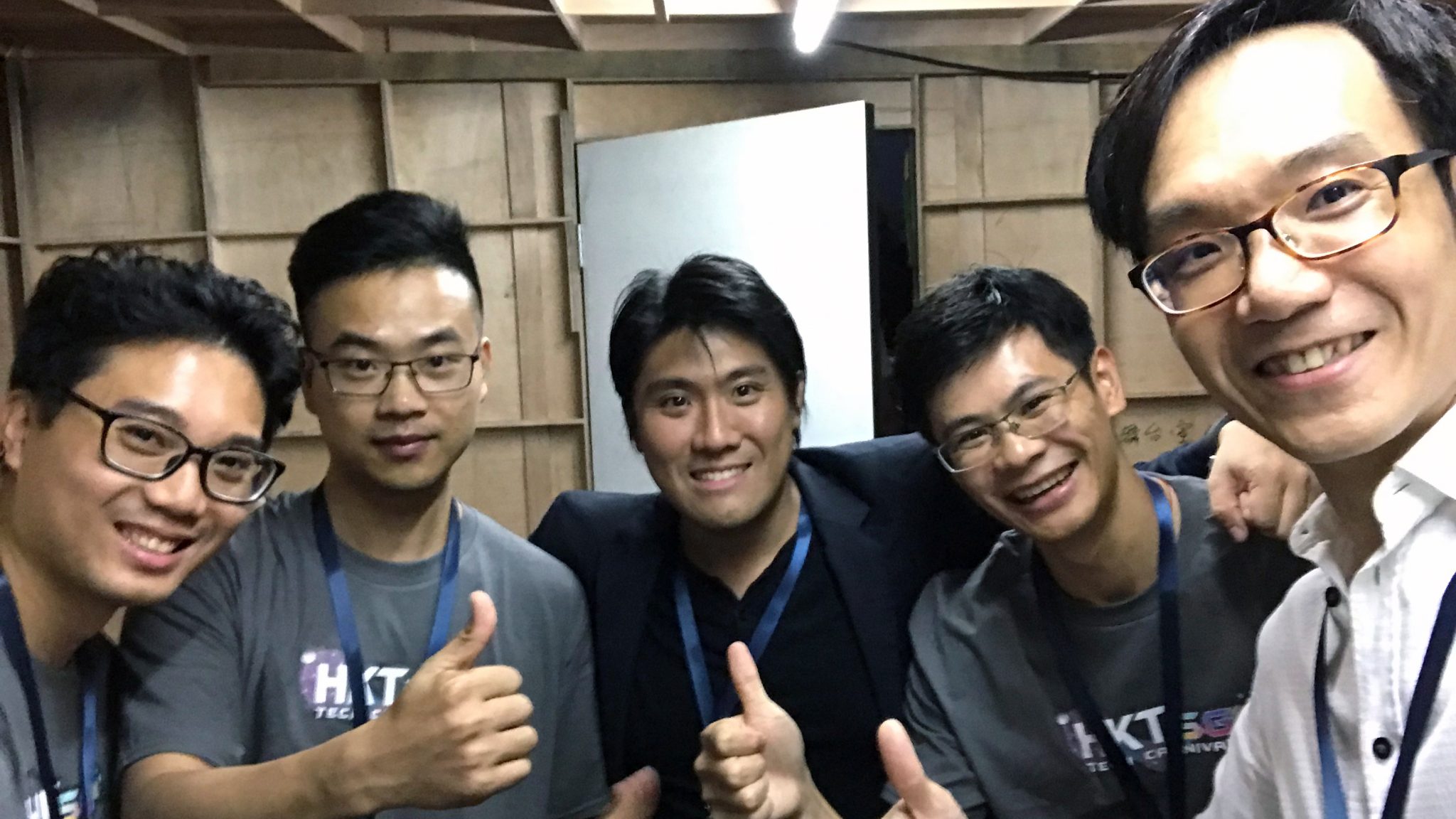 Mark (centre) and Eden (1st from right) are grateful for their passionate employees. Their shared enthusiasm is one of the many drivers for the success of Roborn Dynamics. Finally, tackle problems together with your partner. With an industry chain that grows larger every day, it is not possible for the company to do everything by itself. For example, if you want to perform long distance motion control tests that go beyond municipal, provincial or national boundaries, partnerships with other organisations are indispensable. Looking ahead, Mark reveals that the company is studying haptic feedback from the robot to operator – users will be able to sense the weight of an item picked up by the robot. The feasibility of a flying robot is another area being considered. Mark and Eden’s story resonates with a famous quote by John Lennon, “A dream you dream alone is only a dream. A dream you dream together is reality.”  This article first appeared in CUHK Business School Alumni Portal, republished with permission from Alumni and Corporate Affairs Office, CUHK Business School The post Homegrown Iron Man Finds Success in Entrepreneurship appeared first on CUHK Business School. |
| FROM CUHK: The Power of Humility and Passion |
|
Originally from a journalism background, Lynn quickly fell out of love with the subject she had studied for her bachelor’s degree and first master’s degree, having finished several internships in the media industry in mainland China. “Being a journalist, our duty is to reveal the truth. Most of the time we played the role as an observer. We wrote stories of others, but I could hardly find fulfillment from it. I would be more fascinated by the kind of job that is more tangible, those that could truly create something, and make things happen,” she says. One day she happened to be on a company visit to Coca-Cola. “Because of that, I started to do some studies about this industry, and was truly touched by the FMCG giant Procter & Gamble (P&G)’s brand promise ─ touching and improving people’s lives, which strongly resonated with my personal mission,” Lynn says. From that moment, a spark had been lit and there was no stopping Lynn from moving into the world of marketing. 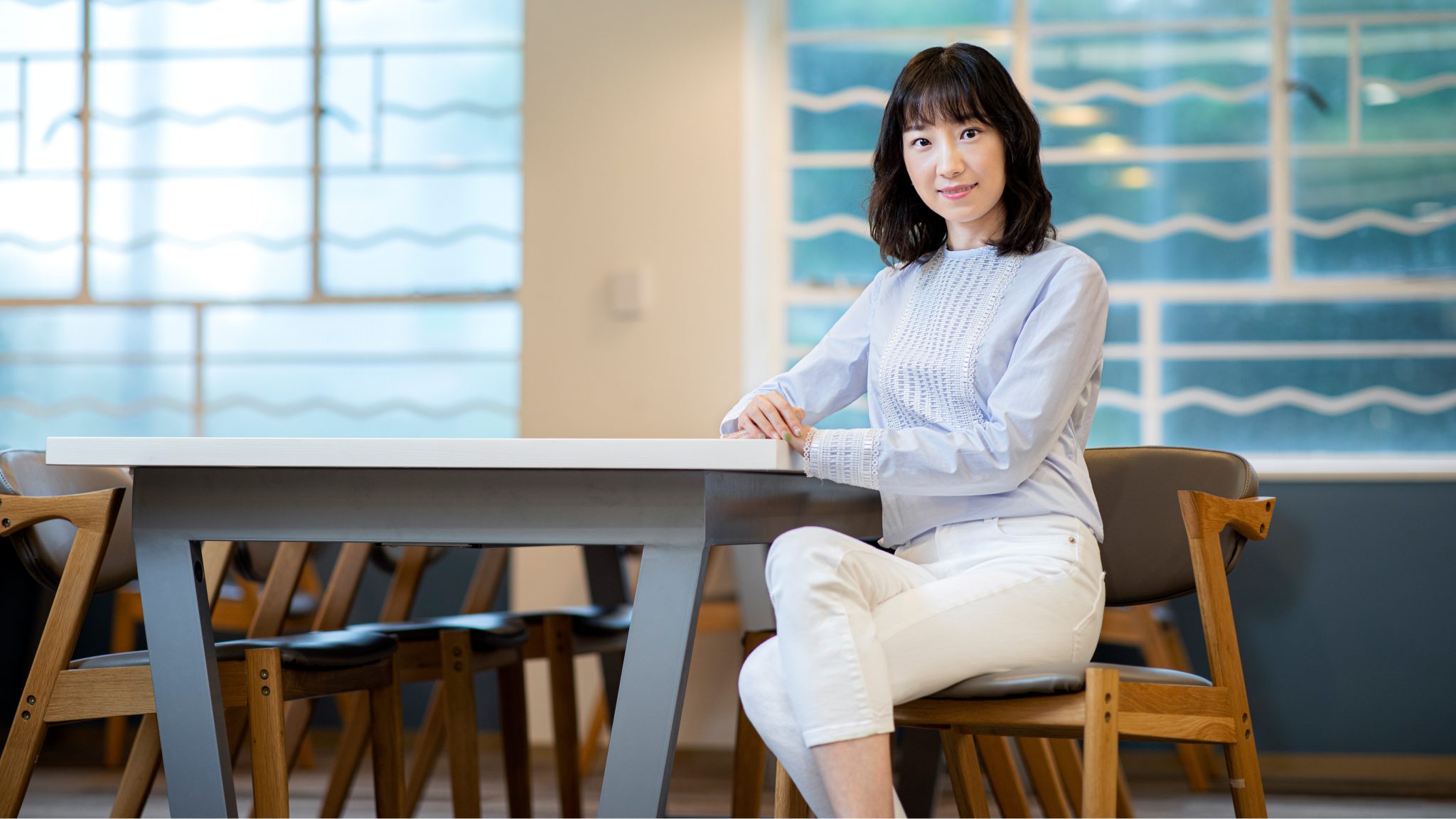 She started her FMCG journey by gaining experience at Reckitt Benckiser, a global consumer health, hygiene and home product company, for its Veet brand in Beijing, and Mars Wrigley Confectionery in Guangzhou with Doublemint. “I still remember my first assignment after joining Mars Wrigley was to generate a B2B strategy and a category solution. We had to convince our key account partners to offer us more display space, a resource that is very scarce in stores. It was my first time ever to step into B2B marketing territory, and I was so happy that my proposal was not only accepted by our partners but also helped them lift the category business by more than 70 percent in test stores,” she says. While Lynn was satisfied by her progress in FMCG, she felt that the trend of “Internet+” might be too big a challenge for the industry to handle. “I could strongly feel the mechanism in FMCG industry was too slow to catch up with all the new opportunities, in terms of its openness to try out new things, and the agility to react to the changes. Most importantly, I foresaw the importance of big data in reigniting the business. Unfortunately, we knew nothing about it, not to mention how to use it, especially in marketing and business management. Besides, I could hardly grasp the knowledge and experience in this industry and I needed a big change,” she says. We learned the mindset of discovering business opportunities and using data to analyze the potential issues, verify the hypothesis and draw valuable suggestions. — Ms. Lynn Cheng CUHK Business School as the Catalyst of Change Lynn decided the time was ripe to change by pursuing a master’s degree in marketing. The one-year study journey at CUHK Business School’s MSc in Marketing Programme was an eye-opening experience. “It was such a multi-cultural and vibrant environment, which is a very different experience to me compared to the one in China. Yet, it is still very close to the mainland market, so I could fully understand what’s going on there,” says Lynn. Some of her achievements included being awarded in the Dean’s List and receiving the Academic Performance Award (Top 3 percent), along with achieving top scorer with the highest GPA in her class. But aside from academic achievement, Lynn was able to cherish something much more, that of discovering leading edge opinions in big data marketing, and learning how to dig out deep insights from data and technical and modelling skills. “We learned the mindset of discovering business opportunities and using data to analyze the potential issues, verify the hypothesis and draw valuable suggestions. This ability can be applied in many aspects. It’s more like a soft skill and very competitive as traditional marketers seldom have such a mindset,” Lynn says. 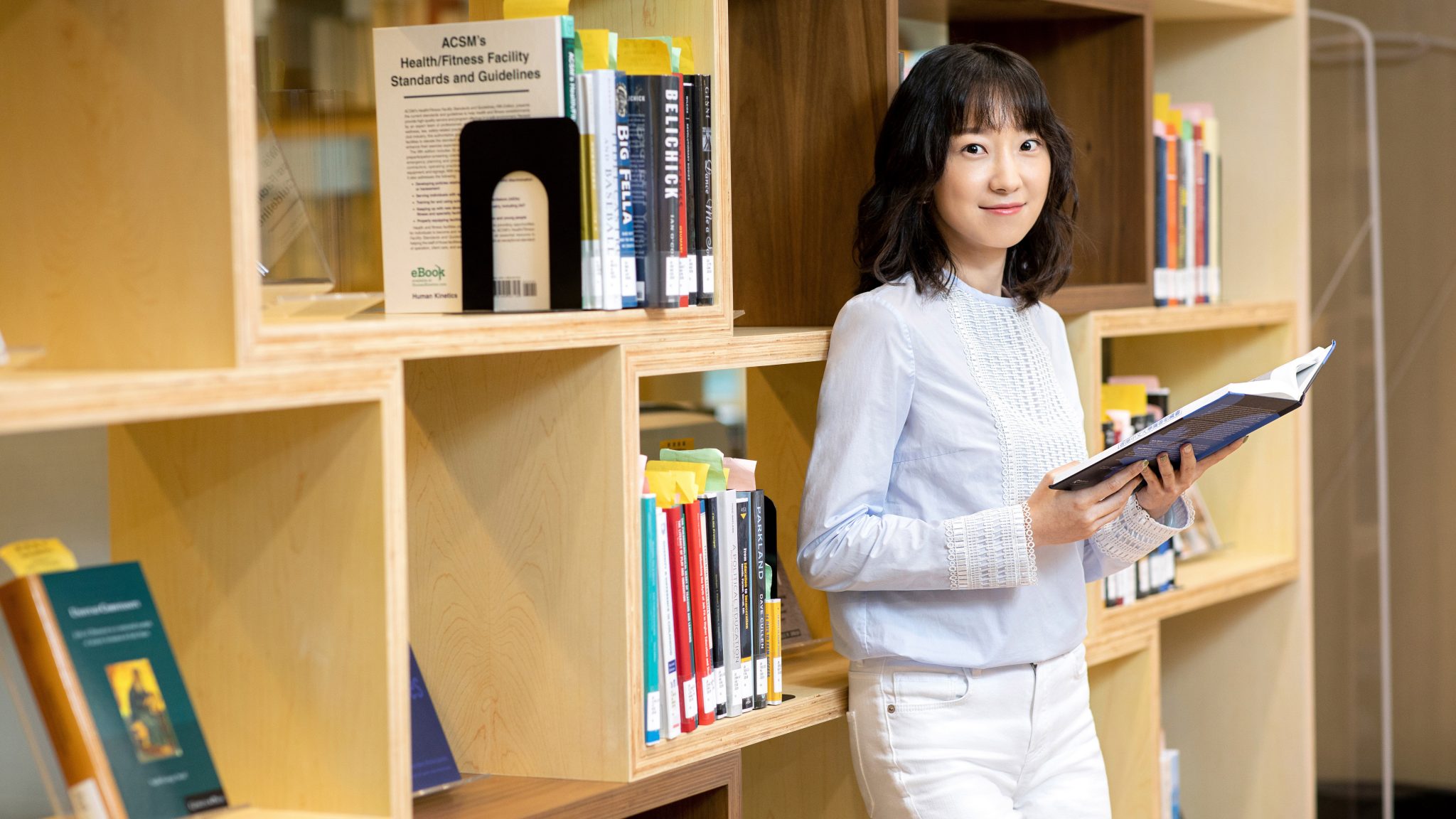 Don’t Be Scared to Walk the Path Unknown Graduating in 2016, Lynn took the bull by horns and entered unknown territory, this time with Tencent in Shenzhen. She joined the company as a brand manager for QQ Browser and has become Senior Brand Manager for the product in China since last year, working on strategic planning and core brand building projects. “As a product-driven company, Tencent positions every other function to support the product team, including marketing. So the brand team steps back as a supporting function from a company standpoint but in terms of soft skills, they all require marketers to have leadership, to be driven and curious,” says Lynn. Success has followed Lynn along the way. She recently received awards including the Senior Executive Vice President Award (top 1 percent) and Breakthrough Award (top 5 percent) with Tencent for developing a brand repositioning strategy and implementing the biggest campaign of the year, in the process outperforming KPI by 40 percent more users and historical high daily active users. What are the philosophies and attitudes that Lynn holds dear? She says it is crucial to always be a great learner at every stage of your career. “Technology will always be evolving. My advice is to be curious and agile to the changes. Understand the tech and always think about how they can be applied to our own territory and get prepared accordingly. Besides that, I prefer immersing myself in Coursera, an online learning platform, and I am recently learning something about statistics and analytics,” she says. Technology will always be evolving. My advice is to be curious and agile to the changes. — Ms. Lynn Cheng Know Your Goals and Strive Towards Them Lynn’s career has been driven by strong fundamentals, of which she highlights three critical aspects. Firstly, she believes it is important to set your own priorities. “I’m not trying to do everything perfect. Most of the time, I choose those which can create the biggest impact, fascinate me the most or create something new,” Lynn says. Secondly, everyone must embrace ambiguity. “At school, things we are dealing with have relatively low uncertainty. However, it could be very different at the workplace, especially when you are doing something no one have done before,” says Lynn. Finally, it is crucial to reach out and integrate resources that one can leverage. “It can be someone more senior than me, my peers and subordinates, or external resources. I try to set up virtual teams for schoolwork or projects. A cat lover, Lynn has two felines at home, but does not share the animal’s typically introverted characteristics. “I love working with a group of people instead of working in solitude as I feel more energized. It makes me eager to learn new things and dare to try,” she says. 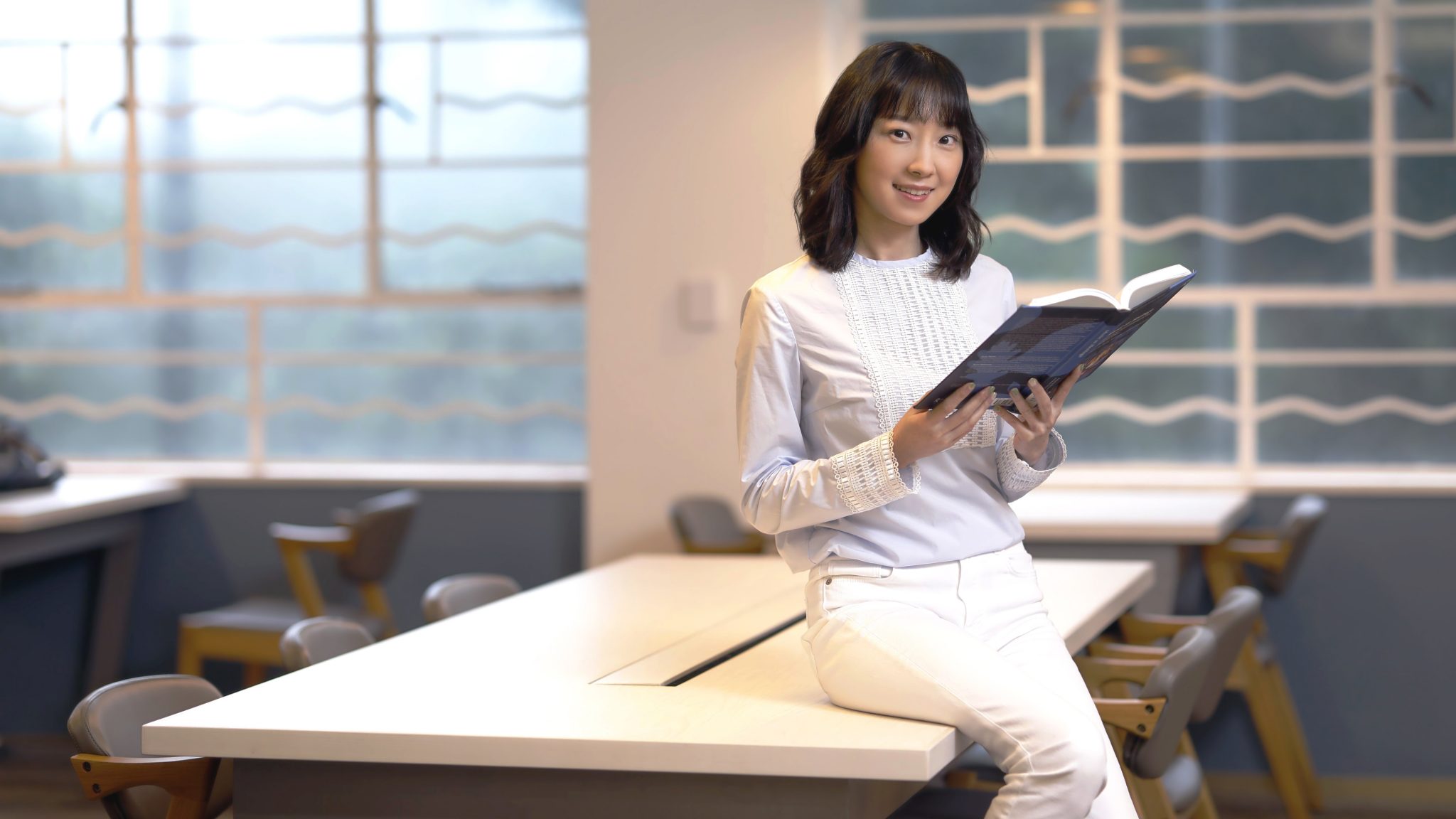 The post The Power of Humility and Passion appeared first on CUHK Business School. |
| FROM CUHK: Life Lessons Inspire New Students to Stay Strong |
|
In a room filled with more than 400 wide-eyed, high-spirited undergraduates, ready to start a new and important chapter of their life as they embarked on their university journey, Prof. Andy Wong caught them off guard and had them sit at the edge of their seats as he recounted the incredible hardships he has gone through, to show them what it takes to overcome the inevitable problems they will face in the future. Prof. Wong, Associate Dean (Undergraduate Studies) and Associate Professor of Practice in Marketing at The Chinese University of Hong Kong (CUHK) Business School, described what he was about to share in a closing speech for this year’s undergraduate inauguration ceremony as “very personal, private and scary.” Many successful people are successful because they give up later than most people when all signs point to one act. — Prof. Andy Wong Instead of painting an idealised picture of life seen through rose-coloured glasses, Prof. Wong tried to plant the seed of reality in students’ mind right off the bat: “We have problems in Hong Kong, and we have problems in life. Will you have fewer problems in the near future? I’m sorry. You’ll have more as you age. **** happens. So, what can we do?” To the students’ surprise, Prof. Wong said he actually felt grateful for having had plenty of problems in his life. “I’m blessed with disproportionally large quantities of problems, so I feel qualified to share with you my experience in dealing with them.” The first experience he shared was how he got stuck when pursuing his doctoral degree at the University of Southern California. Out of the five years he spent there, he struggled terribly with his dissertation in the final three. Sometimes his experiment data did not support his hypothesis, and the fear of failure constantly crept in. “It’s like one step forward and three steps back. I was discouraged and scared. I would stay in my apartment all day. I didn’t want to see the data I collected the day before, because I didn’t want to face another failure. I would keep myself busy doing other things to distract myself so I would not have to face the reality. I think I was mildly depressed, with some health issues as well.” Don’t tackle your problems alone. Don’t worry about how others see you. Ask for help from someone you can trust. — Prof. Andy Wong When he was about to give a presentation of his final dissertation, he seriously considered quitting and coming back to Hong Kong. Fortunately, he hanged on and sought help from his advisor – a world-class scholar. Part of the reason why he had such a hard time confronting his own work was that he didn’t want to disappoint her. To his surprise, his advisor was extremely supportive and gave him hands-on advice on how to progress. As a result, he was able to hit the finish line. “It wasn’t pretty, but I am glad I didn’t give up,” he said. “On the brink of giving up, I gave it one more try.” Prof. Wong shared two lessons he learned from this “near-failure.” “I think many successful people are successful because they give up later than most people when all signs point to one act, that is, you should quit and not waste any more time.” The second lesson is: Don’t tackle your problems alone. Don’t worry about how others see you. Ask for help from someone you can trust. The next problem Prof. Wong shared with the students was a problem that seemingly had no solution: He almost died. About 23 years ago, he was admitted to the hospital after losing sensation in his lower body. Despite performing all sorts of excruciating tests on him, the doctors still could not find the cause. The diagnosis was an unknown autoimmune disease. The doctors told him how lucky he was that he did not die. Unfortunately, he might not be able to walk again. Things are not as simple as we saw them when we were young. Give people a chance. Give yourself a chance to understand, to get mature and wise. — Prof. Andy Wong In any case, the doctors believed that some form of exercise like walking would help. So Prof. Wong complied. The first day, he walked 20 steps. Sitting on a wheelchair on the balcony of the hospital, he thought: “Maybe I’d need a wheelchair for the rest of my life.” At this moment, the image of Harrison Ford sitting on a wheelchair in the movie “Regarding Harry” flashed across his mind, and he consoled himself thinking that it might be quite a cool idea. After being discharged, he started to gradually recover. Miraculously, after six months, he was able to play tennis – his favorite sport – again. Today, Prof. Wong believes he is 99.5 percent recovered. The lesson he learned from this very scary experience, is when something bad happens, accept it as the “new normal.” This doesn’t mean that one should lose hope. Instead, he encouraged the students: “Be positive. Hope for the best. And then focus on incremental progress. Sometimes, you may not be able to fix your problems all at once. Do it patiently, step by step. Maybe today you can only walk only 25 steps. Maybe tomorrow, you can walk 30 steps; and the next day, 35. As of today, after 23 years, I can, fortunately, walk again, and I even run marathons. As an ex-AID (Autoimmune Disease) patient, it’s not too bad.” The third experience Prof. Wong shared was extremely personal. He told the story of how he grew up in an unhappy family, where his parents would constantly fight and he would cry himself to bed every single night. As a young child, he resented his father for all the unhappiness he had caused his family. When he was in F.4, his parents finally divorced. At that point, he felt calm and accepted that it was not a problem he could fix. Some problems are like a disease. They happen, but don’t blame yourself or others. Try to fix the problems step by step. — Prof. Andy Wong Instead of turning into a rebellious teenager and having thoughts of revenge, he decided to study hard, because he believed that was the way for him to create his own life and future. He felt lucky to have gotten the opportunity to study at CUHK Business School, as it turned out to be a “life-changing experience” for him. Here is the important lesson he learned from his unhappy family life: “Some problems are like a disease. They happen, but don’t blame yourself or others. Try to fix the problems step by step. What I’ve learned was, I wanted to build rather than destroy. I wanted to forgive, rather than retaliate. It’s really hard, but after all these years, as I get older and maybe a little wiser, I know that things are not as simple as we saw them when we were young. Give people a chance. Give yourself a chance to understand, to get mature and wise. Be positive and constructive. Don’t try to fix problems all at once. Give it time, patience and effort.” Having talked about his own problems and how he resolved them, Prof. Wong turned to the problems that young students are facing today and addressed them head-on with an invitation: “Right now, we have mixed feelings in Hong Kong. I know that you are happy about new beginnings, yet you worry for the city you love. Let’s have mixed feelings together, shall we?” He acknowledged that the students might feel wounded in the past, just as it might feel like Hong Kong has been wounded. “But let’s be patient,” he said. “Time heals everything. Time heals all wounds. Be smart, equip yourself, be intelligent. Learn how to tell the right from the wrong, what is true and what is false.” Stand up for the society. Try not to be overly emotional. Be calm. Let’s figure out the solutions together. — Prof. Andy Wong Prof. Wong’s last words of advice were: “Be strong. We need people like you, who are smart, responsible and strong. You can withstand all these challenges out there. I respect all of you for your commitment to Hong Kong. Stand up for the society. Try not to be overly emotional. Be calm. Let’s figure out the solutions together. One of the missions of our school is to train people who don’t blame, who don’t destroy, who provide solutions and fix problems. Let’s do it together!” The post Life Lessons Inspire New Students to Stay Strong appeared first on CUHK Business School. |
| FROM CUHK: The 2nd Derivatives and Quantitative Investing Conference |
|
The Department of Finance at The Chinese University of Hong Kong (CUHK) Business School is pleased to present the 2nd Derivatives and Quantitative Investing Conference, which will take place on 17 October 2019 (Thursday) at the CUHK Business School Town Centre. This is an exciting platform for researchers and practitioners from academia and industry to share the cutting edge research and practice in derivatives markets and quantitative investing. Prof. Stephen Figlewski from New York University, the founding editor of Journal of Derivatives, and Prof. Robert Webb from University of Virginia, the editor of Journal of Futures Markets, will deliver the keynote speech, along with more than a dozen of expert speakers from Hong Kong, the U.S., Canada, and Germany. The topics include:
You are cordially invited to attend this event to learn and benefit from cutting-edge quantitative research, which can be applied to real-world investment management and trading practice. Try not to miss this ground breaking opportunity and register now as seats are very limited. Registration and General Information Free of charge but advanced registration is required. Simple lunch will be provided. Since seats are limited, please register online on or before 14 October 2019 (Monday). Confirmed Speakers and Presentation Topics (Subject to change)
The post The 2nd Derivatives and Quantitative Investing Conference appeared first on CUHK Business School. |
| FROM CUHK: Quality Entertainment Knows No Boundaries |
Lovinia Chiu (EMBA 2013), affectionately known as LuLu, is the Chairman and CEO of Medialink Group Limited with more than 30 years of experience in content distribution and brand licensing. She entered the industry after graduating from university and founded her own company six years later. She introduced popular TV classics such as Dae Jang Geum, Meteor Garden, and Fullmetal Alchemist to Hong Kong. After completing the CUHK EMBA programme in 2013, she set her eyes on an IPO for Medialink. The goal was finally achieved when the company successfully went public this year.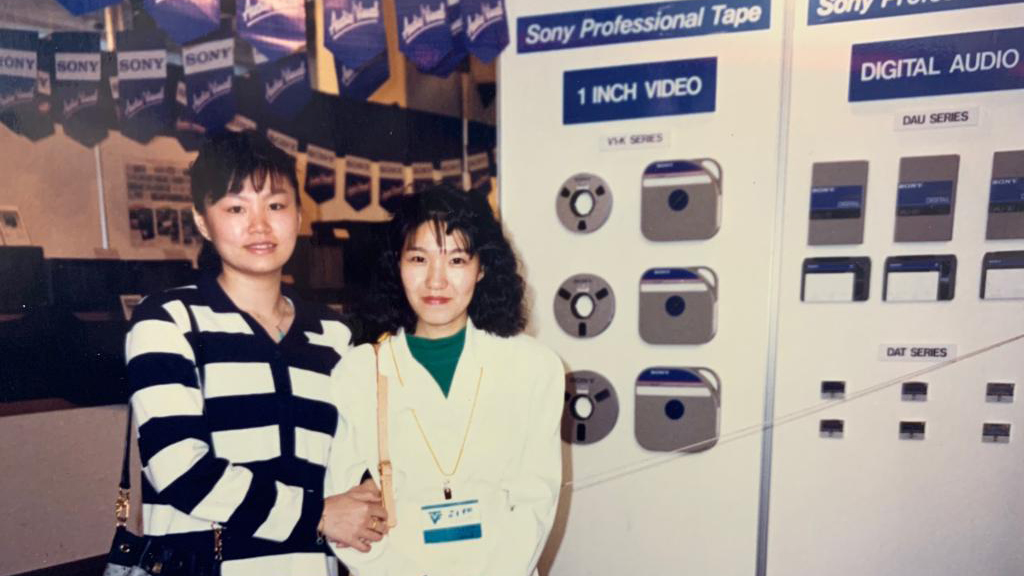 LuLu (left) attends a television festival overseas to explore quality programmes in the 1980s A Natural-born Saleswoman with a Good Eye for Business LuLu comes from a humble background. She could not remember ever going to a restaurant with her father growing up because he was always working to make money to send his children to private schools for better education. Unfortunately, her father died in a car accident when she was still in secondary school, forcing her to get a part-time job to pay for her tuition. After graduation from university, LuLu joined a media content distributor as a sales executive. Her skeptical coworkers wondered if this fresh-faced new graduate could even last three months. She proved them wrong by staying for five years, during which she was promoted to Director of Sales and Acquisition. LuLu has an outgoing personality and a strong passion for her work, as if she was born to work in sales. “I like meeting people, and I love bringing joy to people through high quality programmes even more!’ LuLu did not actually watch a lot of TV when she was a student, but she had a good eye in spotting hit shows. She was applauded for discovering many quality shows when she first attended a television festival in US. She selected a number of American and Canadian TV series and variety shows and distributed them to the Philippines and Thailand. Programmes such as Cirque du Soleil and The Three Tenors in Concert were instant hits in those markets.  LuLu founded her own company Medialink in 1994 Hard Work is Key for Entrepreneurs LuLu was later recruited by Star TV as Sales Manager, but the company was soon acquired by a multinational corporation, and she was reassigned to complete a due diligence survey, which she found dull and unbearable. It prompted her to start her own business with just over HK$100,000 in the bank. In 1994, she co-founded Medialink with her younger sister. The Chinese name of Medialink(羚邦集團)means “an antelope galloping to the other side of the world.” The idea really came true, and her job has taken her all over the world – she has been to Cannes at least 70 times for MIPCOM. To avoid competing with her former employer, LuLu stayed away from the American and Canadian markets but turned to Japanese anime, Korean dramas and Taiwanese dramas for upstream sourcing. For downstream distribution, she turned the focus on the familiar Southeast Asian markets and actively explored the mainland Chinese market. One can only imagine how challenging it was for a twenty-something-year-old woman to start a business with such limited capital. “The first year was the hardest. Not one Japanese production company trusted us, but we kept knocking on their doors. It wasn’t until the fifth year when a company finally sold us our first anime.” 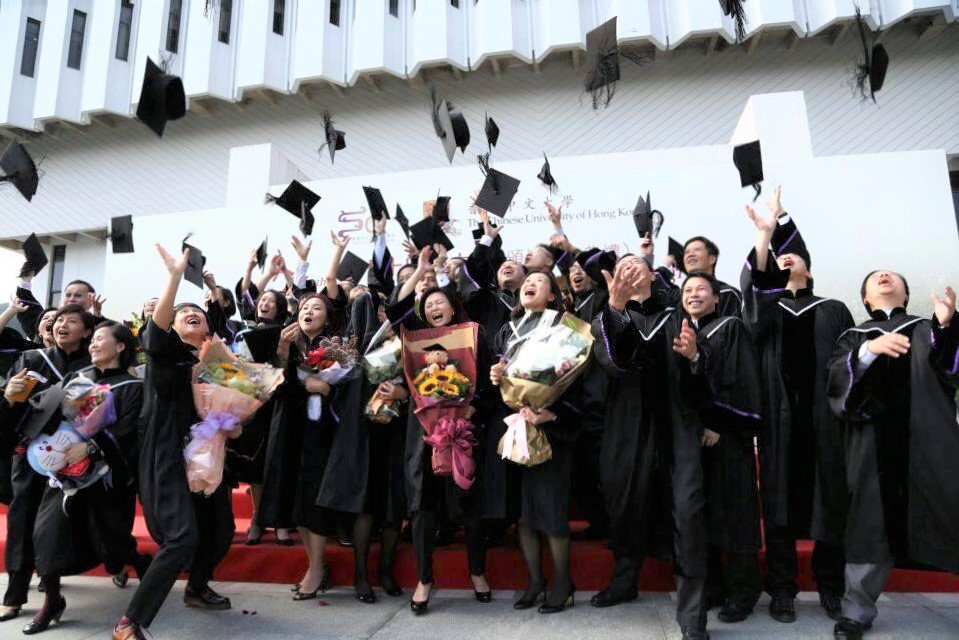 LuLu graduated with an EMBA in 2013. Here she rejoices with her classmates at the graduation (front row, middle) LuLu says a distributor cannot only focus on maximising its margin. It must create value for both the company and business partners. This includes providing a practical and transparent market information and applying knowledge and experience to identifying the right product for each market, creating a triple-win situation. “In 2003, we managed to convince a Filipino TV station which had never bought any Asian dramas to give the Taiwanese drama Meteor Garden a go. It pulled in a record-breaking 42 rating points and the ad revenue soared for the station. Within the next three months, we sold 60 Taiwanese dramas to the Philippines. Everyone involved in the upstream, midstream and downstream processes were happy.” Enrolling in the EMBA and Fulfilling an IPO Dream LuLu is grateful for a life coach who once told her that when a company gets bigger, the owner can no longer play the role of just a salesperson. She decided to continue her education and applied for the CUHK EMBA programme in 2011. She says the experience has benefited her tremendously. “For one, sales theories such as ‘Left-Right Circles’ and ‘Awareness, Understanding, Happiness, Action, and Habit’ are still useful to this day. For another, I’m very grateful to be part of the CUHK alumni network. I even played cupid to link up a male and female classmate and became best friends with both. Thirdly, I gained a deeper understanding of IPO from our investment class, which helped me formulate my goal of getting my company go public.”  When Medialink went public in May, LuLu’s EMBA classmates cheered for her at the HKEx After a few years of preparation, Medialink was finally listed on the main board of HKEx in May this year. The path was bumpy and stressful for LuLu, causing her many sleepless nights and weight loss. However, the hardships did not waver her determination and beliefs in doing the right thing by the book. Be Strong and Resilient Like a Red Cotton Tree LuLu and Medialink have celebrated countless accomplishments along the way: Being the biggest Japanese anime distributor in China by revenue in 2017; for the first time ever co-investing and being on the production committee of Japanese anime Seisen Cerberus; successfully entering the in-flight entertainment content business; and partnering with TVB to introduce Medialink’s very own Ani-One streaming service on myTV Super. Although the company is now public, LuLu thinks Medialink is still at its infancy stage in the capital market with a long way to go. Looking ahead, besides growing stronger along with her business partners, she wants more young people to enter the IP commercialisation business so that they can help grow local brands and export mainland products overseas. 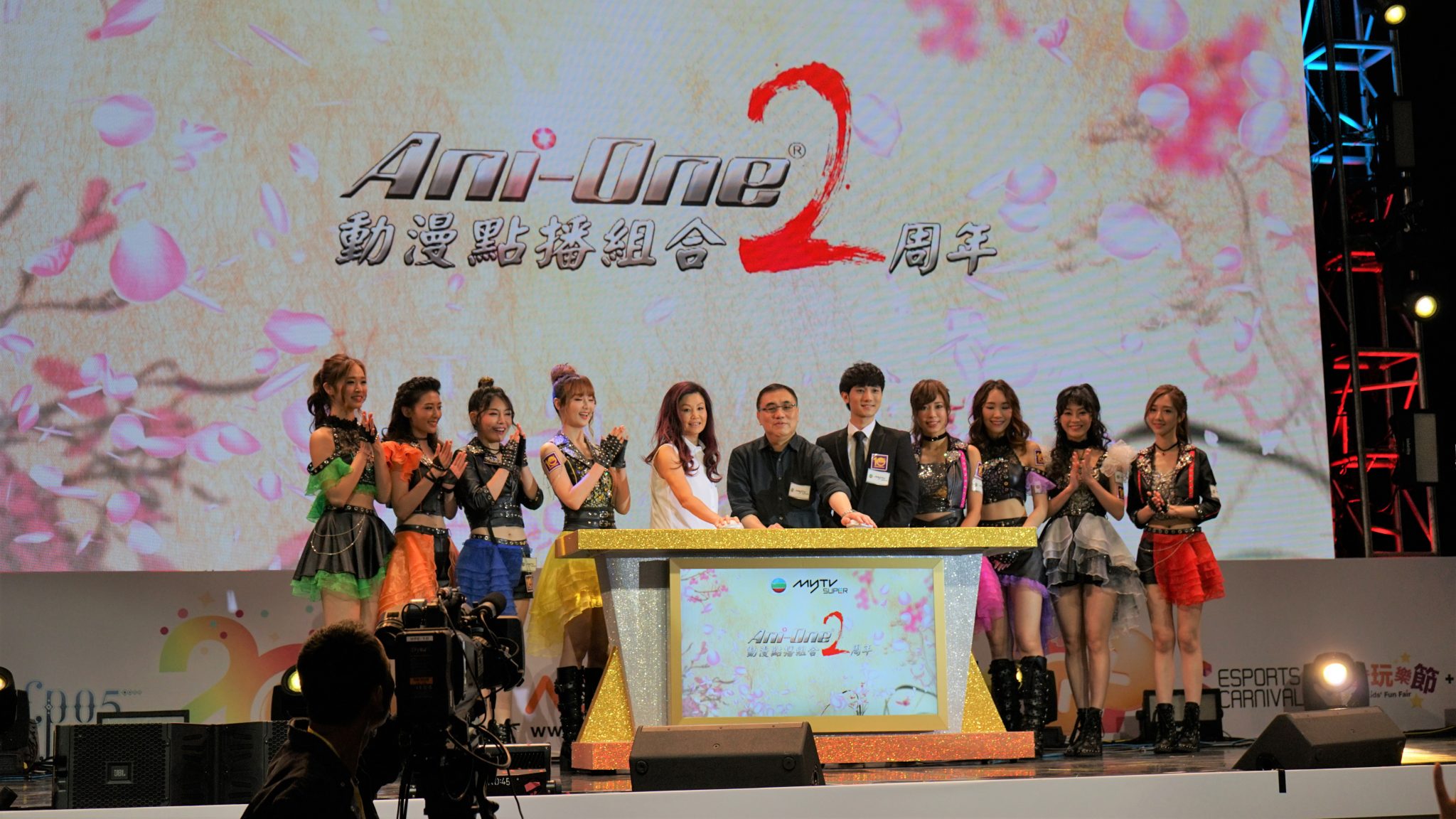 LuLu (5th from left) attends the second anniversary celebration of Ani-One, Medialink’s own product, at ACGHK 2018 LuLu recalls her childhood home being surrounded by red cotton trees. She has always liked them for their upright and upward quality. It reminds one of the lyrics of a Roman Tam’s classic. “Hero of a tree. Keep going upward. A righteousness unique to red cotton trees…” This article first appeared in CUHK Business School Alumni Portal, republished with permission from Alumni and Corporate Affairs Office, CUHK Business School. The post Quality Entertainment Knows No Boundaries appeared first on CUHK Business School. |
| FROM CUHK: Sustaining Its Success in Dialogue with Women Chief Executives and Mentorship Programme 2019-20 |
|
Running into its second year, the theme of the programme this year is “Sustained Success”. It continues to promote equal opportunity and to empower female professionals at the workplace. Prof. Kalok Chan, Dean of CUHK Business School and Wei Lun Professor of Finance first introduced the new initiatives of the dialogue and emphasized the importance of talent diversity in making successful teams. Ms. Ivy Au Yeung, Former CEO Hong Kong, ANZ and the convener of the group of Women Chief Executives said, “Through our advocacy, we hope to help women unleash their full potential and ultimately move up the career ladder by strengthening awareness, education, and enablement.” During the first dialogue, Prof. Andy Wong, Associate Dean (Undergraduate Studies) and Associate Professor of Practice in Marketing of CUHK Business School and moderator of the panel session invited three women chief executives to speak on this year’s theme of sustained success. They included Ms. Christine Ip, Managing Director and Chief Executive Officer (Greater China), United Overseas Bank Limited; Mrs. Ann Kung, Deputy Chief Executive Officer, Bank of China (Hong Kong) Limited; and Ms. Maaike Steinebach, General Manager, Visa (Hong Kong and Macau). The panel shared how their upbringing and failures inspired success and gave their own definitions of success. Ann finds success to be able to do what one likes and is passionate about. She hoped students could identify their areas of improvements and stay positive. Christine’s version of success means making everyone see their importance in life and being a blessing to others. She advised students to practise discipline to get what they want. Considering finding a role in life that one enjoys successful, Maaike encouraged students to follow their hearts and make their own path. 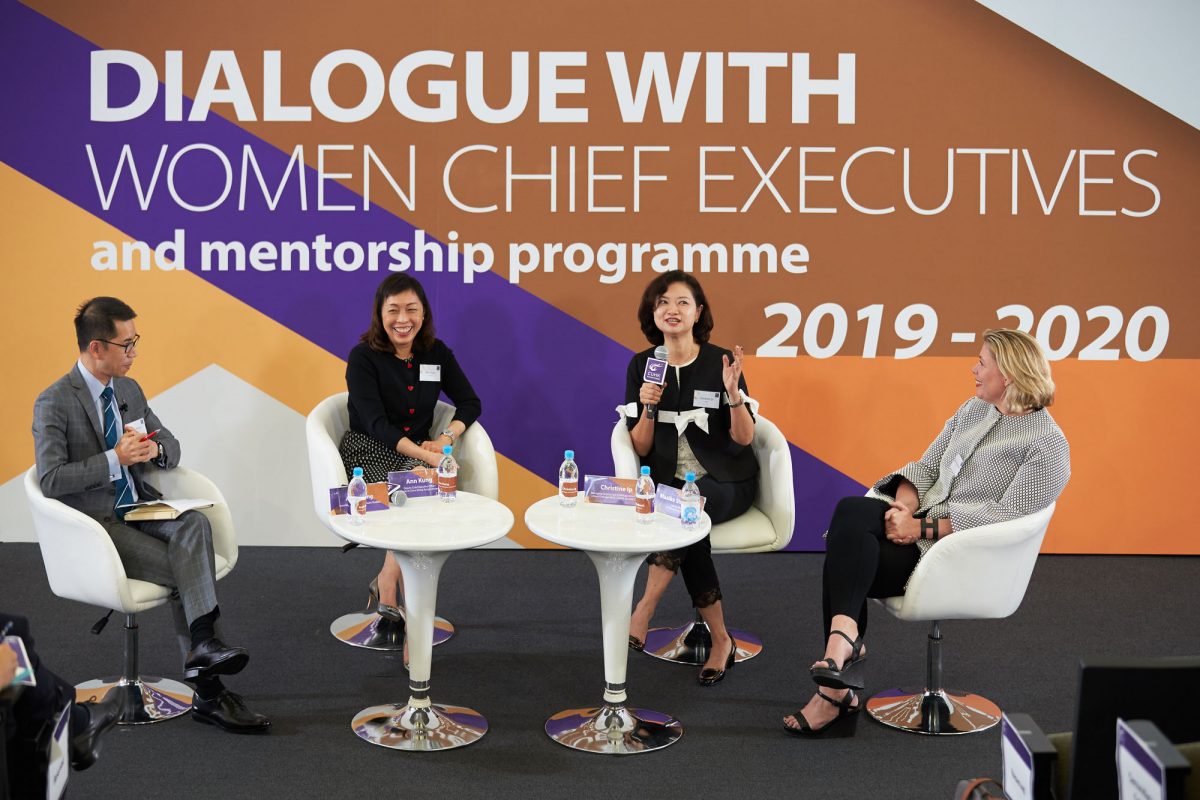 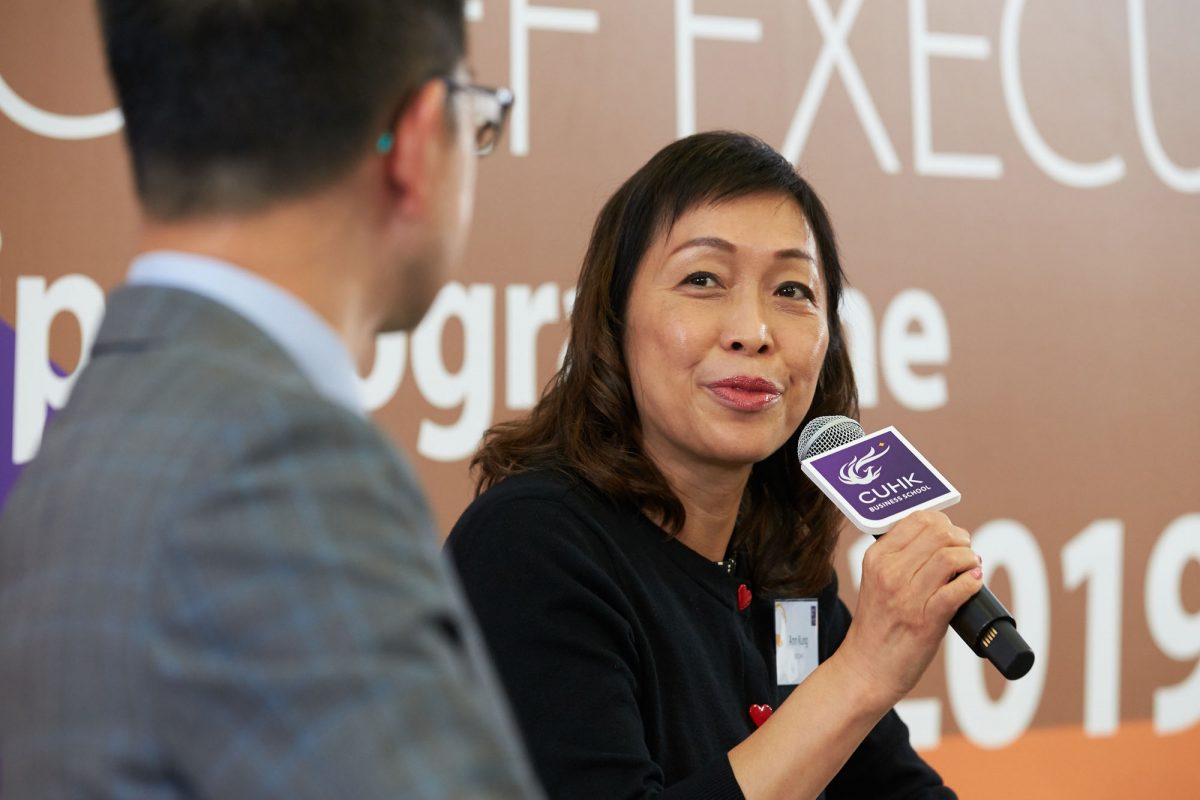 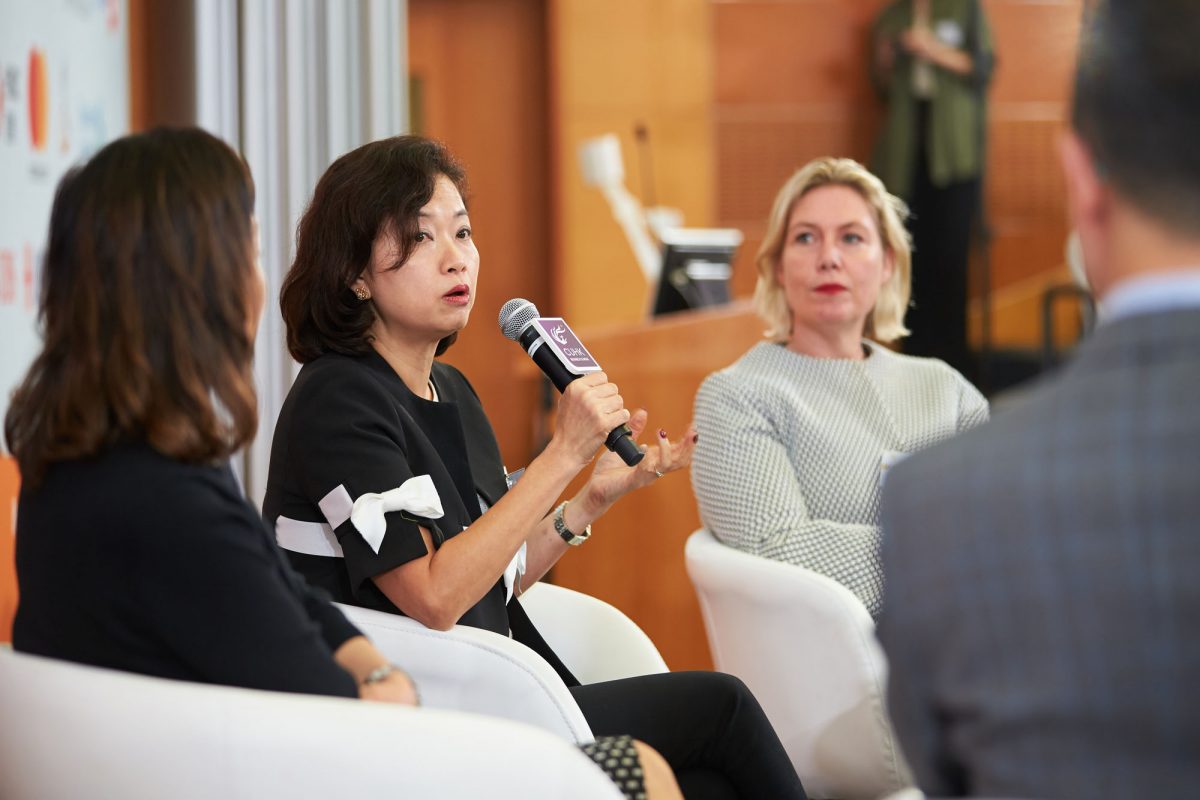 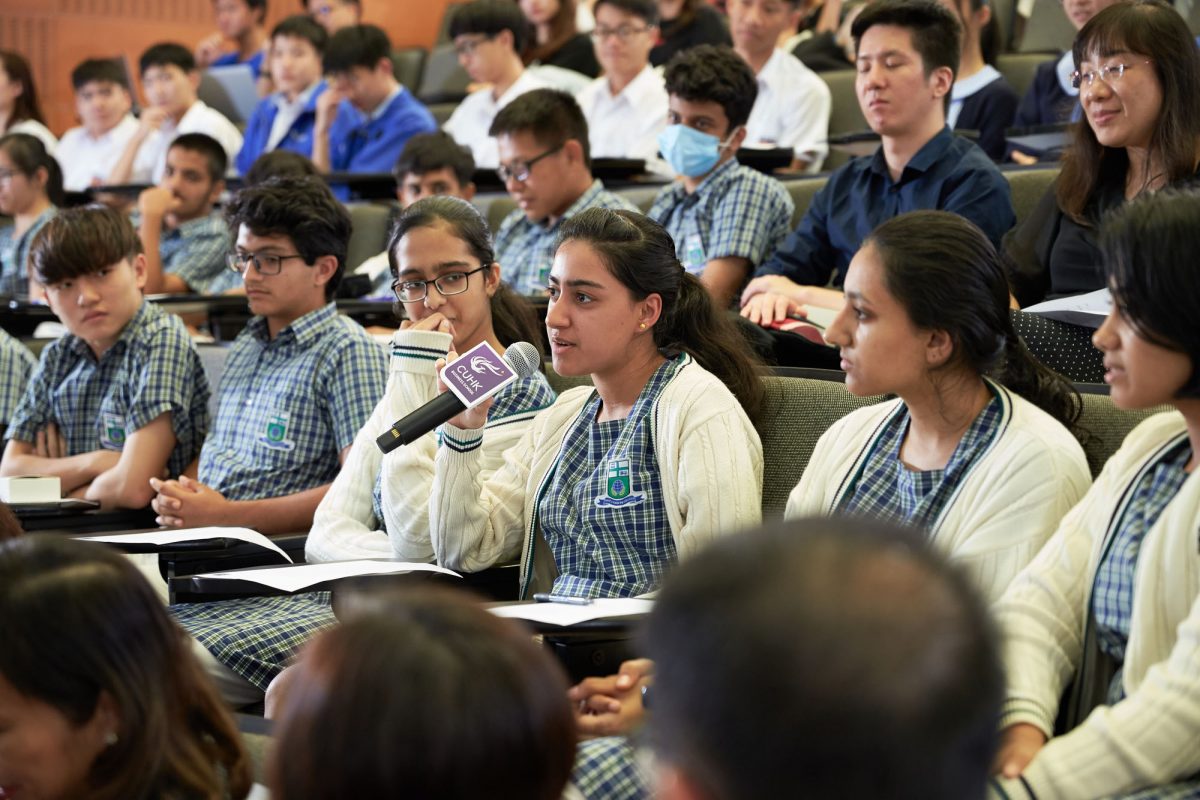 Since its inauguration in 2018, over 1,000 secondary school students, teachers and principals, as well as female chief executives and professionals participated in the dialogue series. It will provide students with first-hand insights from senior executives through sharing, mentoring and coaching. The thought-leadership platform is supported by the Women Chief Executives group and 14 leading local and international financial services institutions, namely ANZ, Asia Insurance, Bank of China (Hong Kong), Bank of Montreal, BNY Mellon, Citi, HSBC, ICBC (Asia), Mastercard, Rabobank, Standard Chartered, UBS, UOB, and Visa. This Dialogue with Women Chief Executive series is also part of the new, mandatory credit-bearing course “Business Lecture Series” for the School’s undergraduate students. Through meeting and interacting with leaders from business industries and professions, students can stay abreast of current developments in business sectors and gain valuable industry insights. It will also nurture students with forward-looking mindsets and enhance their abilities to reflect on business issues. 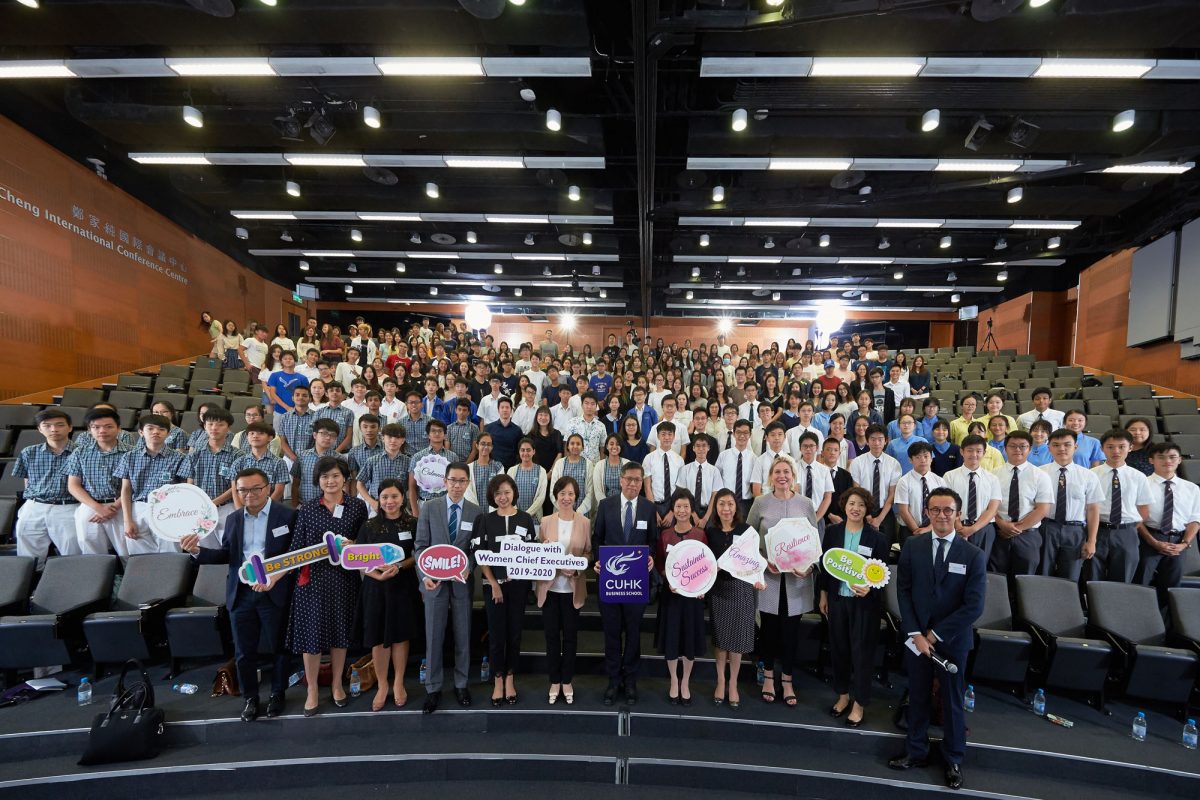 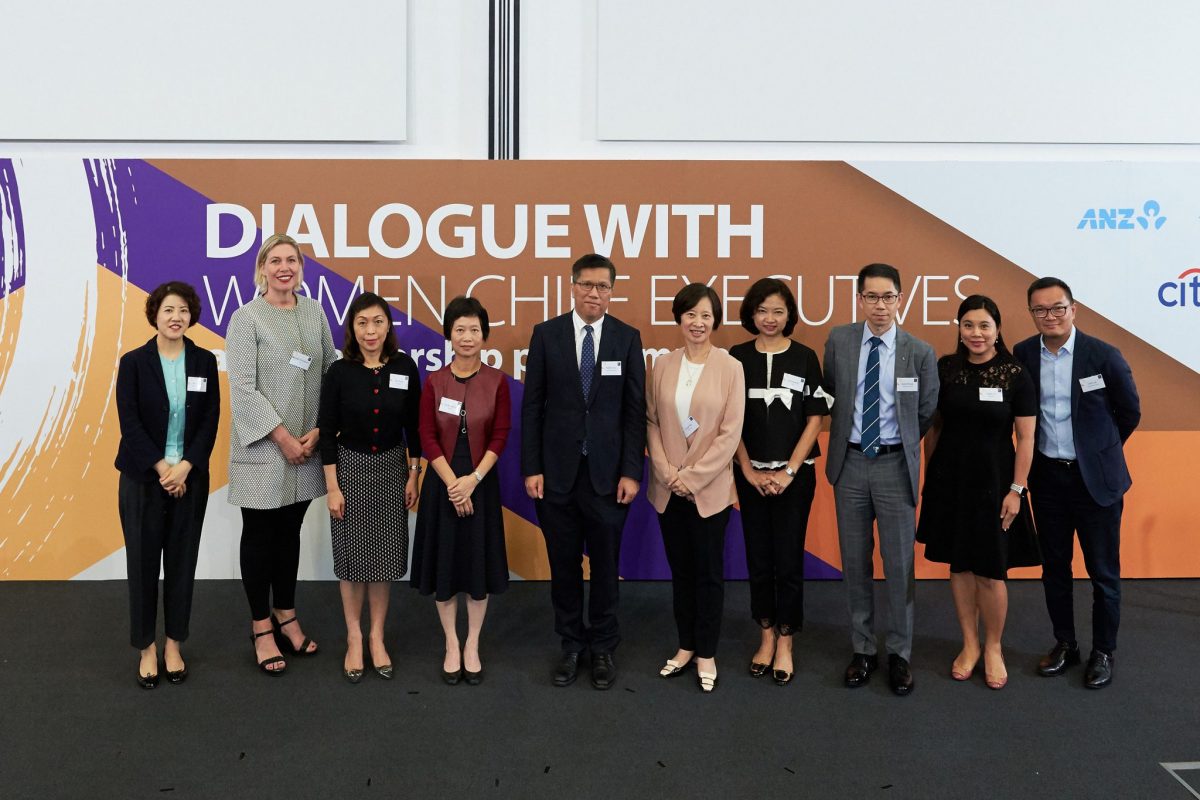 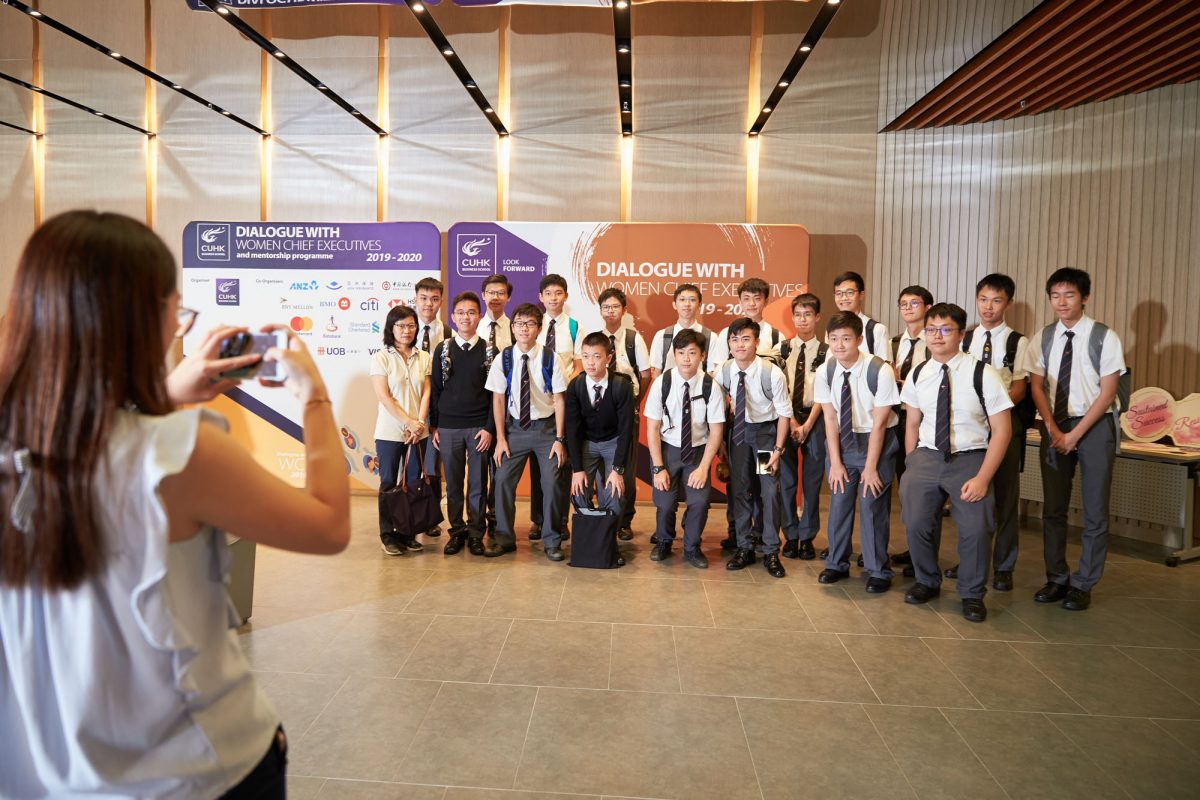 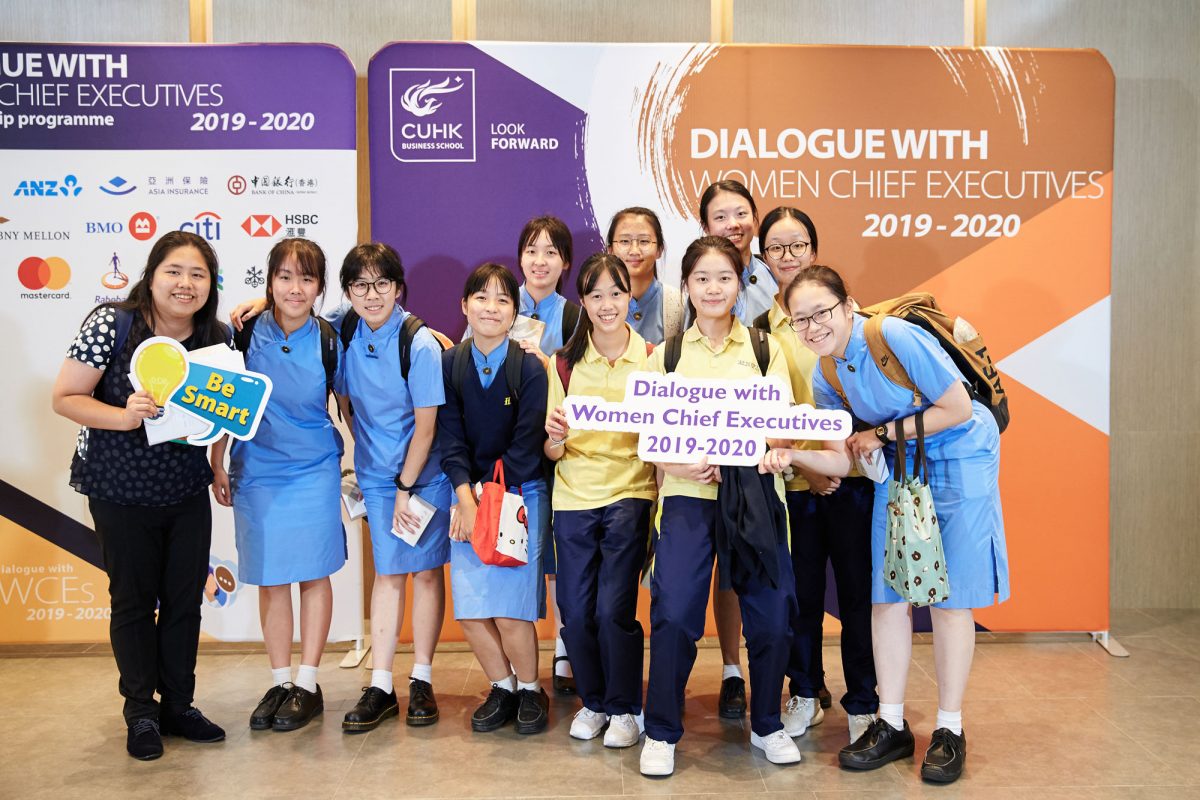 The post Sustaining Its Success in Dialogue with Women Chief Executives and Mentorship Programme 2019-20 appeared first on CUHK Business School. |
| FROM CUHK: Quality Entertainment Knows No Boundaries |
Lovinia Chiu (EMBA 2013), affectionately known as LuLu, is the Chairman and CEO of Medialink Group Limited with more than 30 years of experience in content distribution and brand licensing. She entered the industry after graduating from university and founded her own company six years later. She introduced popular TV classics such as Dae Jang Geum, Meteor Garden, and Fullmetal Alchemist to Hong Kong. After completing the CUHK EMBA programme in 2013, she set her eyes on an IPO for Medialink. The goal was finally achieved when the company successfully went public this year. LuLu (left) attends a television festival overseas to explore quality programmes in the 1980s A Natural-born Saleswoman with a Good Eye for Business LuLu comes from a humble background. She could not remember ever going to a restaurant with her father growing up because he was always working to make money to send his children to private schools for better education. Unfortunately, her father died in a car accident when she was still in secondary school, forcing her to get a part-time job to pay for her tuition. After graduation from university, LuLu joined a media content distributor as a sales executive. Her skeptical coworkers wondered if this fresh-faced new graduate could even last three months. She proved them wrong by staying for five years, during which she was promoted to Director of Sales and Acquisition. LuLu has an outgoing personality and a strong passion for her work, as if she was born to work in sales. “I like meeting people, and I love bringing joy to people through high quality programmes even more!’ LuLu did not actually watch a lot of TV when she was a student, but she had a good eye in spotting hit shows. She was applauded for discovering many quality shows when she first attended a television festival in US. She selected a number of American and Canadian TV series and variety shows and distributed them to the Philippines and Thailand. Programmes such as Cirque du Soleil and The Three Tenors in Concert were instant hits in those markets.  LuLu founded her own company Medialink in 1994 Hard Work is Key for Entrepreneurs LuLu was later recruited by Star TV as Sales Manager, but the company was soon acquired by a multinational corporation, and she was reassigned to complete a due diligence survey, which she found dull and unbearable. It prompted her to start her own business with just over HK$100,000 in the bank. In 1994, she co-founded Medialink with her younger sister. The Chinese name of Medialink(羚邦集團)means “an antelope galloping to the other side of the world.” The idea really came true, and her job has taken her all over the world – she has been to Cannes at least 70 times for MIPCOM. To avoid competing with her former employer, LuLu stayed away from the American and Canadian markets but turned to Japanese anime, Korean dramas and Taiwanese dramas for upstream sourcing. For downstream distribution, she turned the focus on the familiar Southeast Asian markets and actively explored the mainland Chinese market. One can only imagine how challenging it was for a twenty-something-year-old woman to start a business with such limited capital. “The first year was the hardest. Not one Japanese production company trusted us, but we kept knocking on their doors. It wasn’t until the fifth year when a company finally sold us our first anime.”  LuLu graduated with an EMBA in 2013. Here she rejoices with her classmates at the graduation (front row, middle) LuLu says a distributor cannot only focus on maximising its margin. It must create value for both the company and business partners. This includes providing a practical and transparent market information and applying knowledge and experience to identifying the right product for each market, creating a triple-win situation. “In 2003, we managed to convince a Filipino TV station which had never bought any Asian dramas to give the Taiwanese drama Meteor Garden a go. It pulled in a record-breaking 42 rating points and the ad revenue soared for the station. Within the next three months, we sold 60 Taiwanese dramas to the Philippines. Everyone involved in the upstream, midstream and downstream processes were happy.” Enrolling in the EMBA and Fulfilling an IPO Dream LuLu is grateful for a life coach who once told her that when a company gets bigger, the owner can no longer play the role of just a salesperson. She decided to continue her education and applied for the CUHK EMBA programme in 2011. She says the experience has benefited her tremendously. “For one, sales theories such as ‘Left-Right Circles’ and ‘Awareness, Understanding, Happiness, Action, and Habit’ are still useful to this day. For another, I’m very grateful to be part of the CUHK alumni network. I even played cupid to link up a male and female classmate and became best friends with both. Thirdly, I gained a deeper understanding of IPO from our investment class, which helped me formulate my goal of getting my company go public.”  When Medialink went public in May, LuLu’s EMBA classmates cheered for her at the HKEx After a few years of preparation, Medialink was finally listed on the main board of HKEx in May this year. The path was bumpy and stressful for LuLu, causing her many sleepless nights and weight loss. However, the hardships did not waver her determination and beliefs in doing the right thing by the book. Be Strong and Resilient Like a Red Cotton Tree LuLu and Medialink have celebrated countless accomplishments along the way: Being the biggest Japanese anime distributor in China by revenue in 2017; for the first time ever co-investing and being on the production committee of Japanese anime Seisen Cerberus; successfully entering the in-flight entertainment content business; and partnering with TVB to introduce Medialink’s very own Ani-One streaming service on myTV Super. Although the company is now public, LuLu thinks Medialink is still at its infancy stage in the capital market with a long way to go. Looking ahead, besides growing stronger along with her business partners, she wants more young people to enter the IP commercialisation business so that they can help grow local brands and export mainland products overseas.  LuLu (5th from left) attends the second anniversary celebration of Ani-One, Medialink’s own product, at ACGHK 2018 LuLu recalls her childhood home being surrounded by red cotton trees. She has always liked them for their upright and upward quality. It reminds one of the lyrics of a Roman Tam’s classic. “Hero of a tree. Keep going upward. A righteousness unique to red cotton trees…” This article first appeared in CUHK Business School Alumni Portal, republished with permission from Alumni and Corporate Affairs Office, CUHK Business School. The post Quality Entertainment Knows No Boundaries appeared first on CUHK Business School. |

|
|
|
|